
RECORDS RETENTION AND DISPOSITION
SCHEDULE
PROGRAM RECORDS SCHEDULE:
LOCAL GOVERNMENT AGENCIES
Issued By:
North Carolina Department of Natural and Cultural Resources
Division of Archives and Records
Government Records Section
October 1, 2021

2021 Program Records Schedule: Local Government Agencies
CONTENTS
Approval ..........................................................................................................................................iv
Front Matter
Executive Summary .......................................................................................................................... v
Legend for Records Schedule .......................................................................................................... vi
Records Retention and Disposition Schedule
Standard 10: Airport Authority Records ......................................................................................... 1
Standard 11: Animal Services Records ........................................................................................... 3
Standard 12: Code Enforcement and Inspection Records .............................................................. 5
Standard 13: Emergency Medical Services and Fire Department Records .................................. 12
Standard 14: Parks and Recreation Records ................................................................................. 16
Standard 15: Planning and Regulation of Development Records ................................................ 19
Standard 16: Public Housing Authorities, Redevelopment Commissions, and Entitlement
Communities Records............................................................................................................... 25
Standard 17: Public Transportation Systems Records .................................................................. 31
Standard 18: Public Utilities and Environmental/Waste Management Records ......................... 34
Standard 19: Street Maintenance, Public Works, and Engineering Records ............................... 46
Standard 20: Law Enforcement Records (excluding Sheriff’s Office) .......................................... 53
Standard 21: Tax Records (for municipalities) ............................................................................. 73
Appendix
Managing Public Records in North Carolina ................................................................................ A-1
Audits, Litigation, and Other Official Actions .............................................................................. A-5
Transitory Records ....................................................................................................................... A-6
Destruction of Public Records ...................................................................................................... A-8
Sample Destructions Log ............................................................................................... A-10
Electronic Records: E-mail, Born Digital Records, and Digital Imaging ..................................... A-11
Geospatial Records ................................................................................................................... A-13
Security Preservation Record Copies ......................................................................................... A-15
Disaster Assistance .................................................................................................................... A-17
Staff Training .............................................................................................................................. A-18
Request Forms
Request for Change in Records Schedule ...................................................................... A-19
Request for Disposal of Unscheduled Records .............................................................. A-20
Request for Disposal of Original Records Duplicated by Electronic Means .................. A-21
File Plan ...................................................................................................................................... A-22
Index ........................................................................................................................................ A-23

2021 Program Records Schedule: Local Government Agencies i
Program Records Schedule:
Local Government Agencies
The records retention and disposition schedules and retention periods governing the records series listed herein are
hereby approved. This approval extends to and includes the following standards in the 2021 Program Records
Schedule: Local Government Agencies:
10. Airport Authority Records
11. Animal Services Records
12. Code Enforcement and Inspection Records
13. Emergency Medical Services and Fire Department Records
14. Parks and Recreation Records
15. Planning and Regulation of Development Records
16. Public Housing Authorities, Redevelopment Commissions, and Entitlement Communities Records
17. Public Transportation Systems Records
18. Public Utilities and Environmental/Waste Management Records
19. Street Maintenance, Public Works, and Engineering Records
20. Law Enforcement Records (excluding Sheriff’s Offices)
21. Tax Records (for municipalities)
In accordance with the provisions of Chapters 121 and 132 of the General Statutes of North Carolina, it is agreed
that the records do not and will not have further use or value for official business, research, or reference purposes
after the respective retention periods specified herein and are authorized to be destroyed or otherwise disposed of
by the agency or official having custody of them without further reference to or approval of either party to this
agreement.
Destructions
N.C. Gen. Stat. § 121-5 authorizes the Department of Natural and Cultural Resources to regulate the destruction of
public records. Furthermore, the local government agency agrees to comply with 07 NCAC 04M .0510 when deciding
on a method of destruction. The North Carolina Administrative Code states:
“(a) Paper records which have met their required retention requirements and are not subject to legal or other audit
holds should be destroyed in one of the following ways:
1. burned, unless prohibited by local ordinance;
2. shredded, or torn up so as to destroy the record content of the documents or
material concerned;
3. placed in acid vats so as to reduce the paper to pulp and to terminate the existence of the
documents or materials concerned; or
4. sold as waste paper, provided that the purchaser agrees in writing that the documents or materials
concerned will not be resold without pulverizing or shredding the documents so that the
information contained within cannot be practicably read or reconstructed.
(b) When used in an approved records retention and disposition schedule, the provision that electronic records are
to be destroyed means that the data and metadata are to be overwritten, deleted, and unlinked so the data and
metadata may not be practicably reconstructed.
(c) When used in an approved records retention and disposition schedule, the provision that confidential records of
any format are to be destroyed means the data, metadata, and physical media are to be destroyed in such a manner
that the information cannot be read or reconstructed under any means.”
All local government agencies should maintain logs of their destructions either in the minutes of their governing
board or in their Records Management file. Confidential records will be destroyed in such a manner that the records
cannot be practicably read or reconstructed.

2021 Program Records Schedule: Local Government Agencies ii
Public records, including electronic records, not listed in this schedule are not authorized to be destroyed.
Audits and Litigation Actions
Records subject to audit or those legally required for ongoing official proceedings must be retained until released
from such audits or official proceedings, notwithstanding the instructions of this schedule.
Electronic Records
All local government agencies and the Department of Natural and Cultural Resources concur that the long-term
and/or permanent preservation of electronic records requires additional commitment and active management by
the agency. Agencies agree to comply with all policies, standards, and best practices published by the Department
of Natural and Cultural Resources regarding the creation and management of electronic records.
Local government agencies should consider retention requirements and disposition authorities when designing and
implementing electronic records management systems. Any type of electronically-created or electronically-stored
information falls under the North Carolina General Assembly’s definition of public records cited above. For example,
e-mail, text messages, blog posts, voicemails, websites, word processing documents, spreadsheets, databases, and
PDFs all fall within this definition of public records. In addition, N.C. Gen. Stat. § 132-6.1(a) specifies:
“Databases purchased, leased, created, or otherwise acquired by every public agency containing public
records shall be designed and maintained in a manner that does not impair or impede the public agency's
ability to permit the public inspection and examination of public records and provides a means of obtaining
copies of such records. Nothing in this subsection shall be construed to require the retention by the public
agency of obsolete hardware or software.”
Local government agencies may scan any paper record and retain it electronically for ease of retrieval. If an agency
wishes to destroy the original paper records before their assigned retention periods have been met, the agency must
establish an electronic records policy, including putting into place procedures for quality assurance and
documentation of authorization for records destructions approved by the Government Records Section. This
electronic records policy and releases for destruction of records must be approved by the Government Records
Section. Agencies should be aware that for the purpose of any audit, litigation, or public records request, they are
considered the records custodian obligated to produce requested records, even if said records are being maintained
electronically by an outside vendor. Therefore, contracts regarding electronically stored information should be
carefully negotiated to specify how records can be exported in case a vendor goes out of business or the agency
decides to award the contract to a different vendor.
Reference Copies
All local government agencies and the Department of Natural and Cultural Resources agree that certain records
series possess only brief administrative, fiscal, legal, research, and reference value. These records series have been
designated by retention periods that allow these records to be destroyed when “reference value ends.” All local
government agencies hereby agree that they will establish and enforce internal policies setting minimum retention
periods for the records that Natural and Cultural Resources has scheduled with the disposition instruction “destroy
when reference value ends.” If a local government agency does not establish internal policies and retention periods,
the local government agency is not complying with the provisions of this retention schedule and is not authorized
by the Department of Natural and Cultural Resources to destroy the records with the disposition instruction “destroy
when reference value ends.”
Record Copy
A record copy is defined as “The single copy of a document, often the original, that is designated as the official copy
for reference and preservation.”
1
The record copy is the one whose retention and disposition is mandated by these
schedules; all additional copies are considered reference or access copies and can be destroyed when their
usefulness expires. In some cases, postings to social media may be unofficial copies of information that is captured
elsewhere as a record copy (e.g., a press release about an upcoming agency event that is copied to various social
1
Society of American Archivists, Dictionary of Archives Terminology.

2021 Program Records Schedule: Local Government Agencies iii
media platforms). Appropriately retaining record copies and disposing of reference copies requires agencies to
designate clearly what position or office is required to maintain an official record for the duration of its
designated retention period.
Transitory Records
Transitory records are defined as “record[s] that [have] little or no documentary or evidential value and that need
not be set aside for future use.”
2
North Carolina has a broad definition of public records. However, the Department of Natural and Cultural Resources
recognizes that some records may have little or no long-term documentary or evidential value to the creating
agency. These records are often called transitory records. They may be disposed of according to the guidance
below. However, all public employees should be familiar with their appropriate retention schedule and any other
applicable guidelines for their office. If there is a required retention period for these records, that requirement must
be followed. When in doubt about whether a record is transitory or whether it has special significance or
importance, retain the record in question and seek guidance from a DNCR records analyst.
Routing slips and transmittal sheets adding no information to that contained in the transmitted material have
minimal value after the material has been successfully transmitted. These records may be destroyed or otherwise
disposed of after receipt of the material has been confirmed. Similarly, “while you were out” slips, memory aids,
and other records requesting follow-up actions (including voicemails and calendar invites) have minimal value once
the official action these records are supporting has been completed and documented. These records may be
destroyed or otherwise disposed of once the action has been resolved.
Drafts and working papers, including notes and calculations, are materials gathered or created to assist in the
creation of another record. All drafts and working papers are public records subject to all provisions of Chapter 132
of the General Statutes, but many of them have minimal value after the final version of the record has been
approved, and may be destroyed after final approval, if they are no longer necessary to support the analysis or
conclusions of the official record. Drafts and working documents that may be destroyed after final approval include:
• Drafts and working papers for internal and external policies
• Drafts and working papers for internal administrative reports, such as daily and monthly activity reports;
• Drafts and working papers for internal, non-policy-level documents, such as informal workflows and
manuals; and
• Drafts and working papers for presentations, workshops, and other explanations of agency policy that is
already formally documented.
Forms used solely to create, update, or modify records in an electronic medium may be destroyed in office after
completion of data entry and after all verification and quality control procedures, so long as these records are not
required for audit or legal purposes. However, if the forms contain any analog components that are necessary to
validate the information contained on them (e.g., a signature or notary’s seal), they must be retained according to
the disposition instructions for the records series encompassing the forms’ function.
It is further agreed that these records may not be destroyed prior to the time periods stated; however, for sufficient
reason they may be retained for longer periods. These schedules supersede previous versions of these schedules
and any localized amendments; they are to remain in effect from the date of approval until they are reviewed and
updated.
2
Ibid.
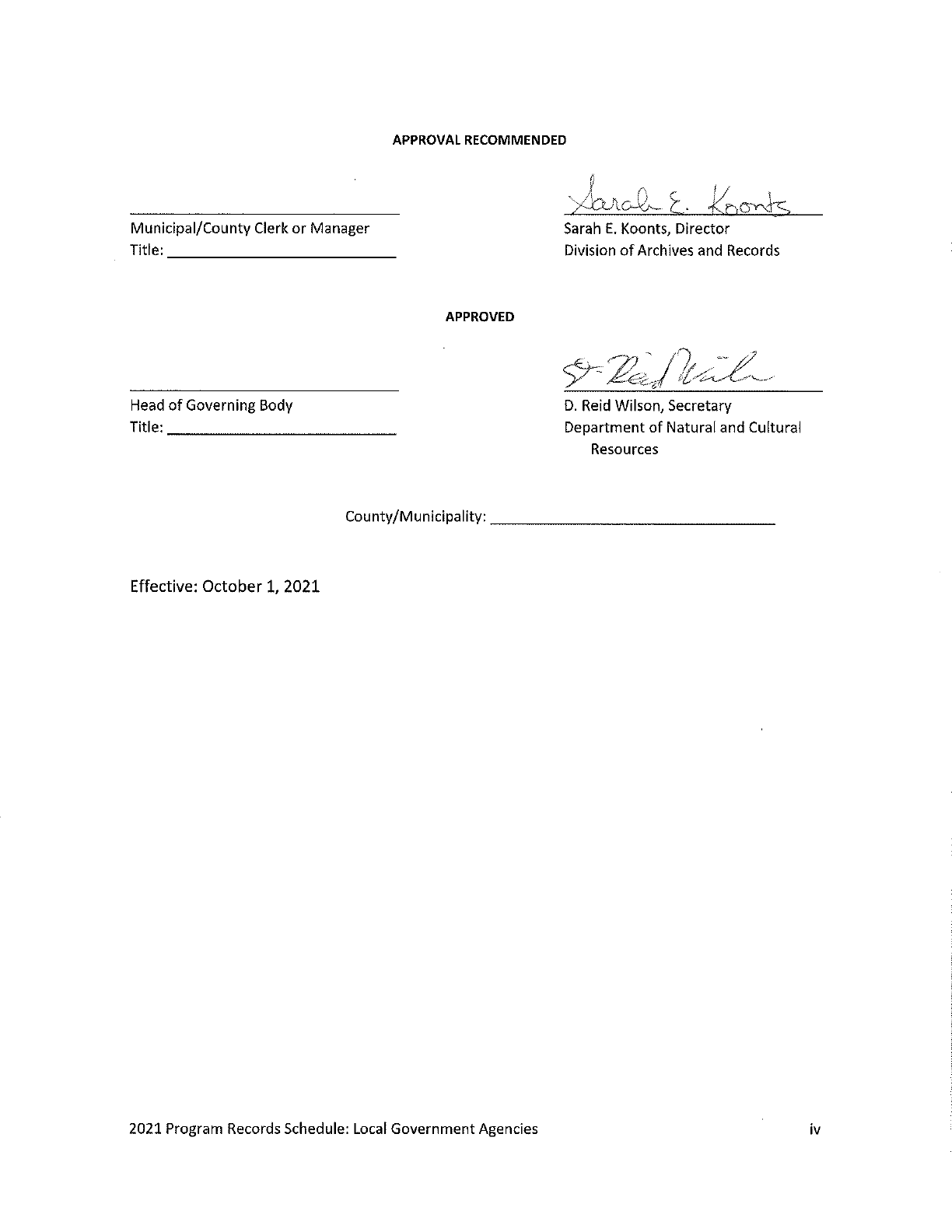

2021 Program Records Schedule: Local Government Agencies v
EXECUTIVE SUMMARY
Some records are covered by the General Records Schedule: Local Government Agencies and,
therefore, are not listed separately here.
According to N.C. Gen. Stat. § 121-5(b) and N.C. Gen. Stat. § 132-3, you may destroy public records
only with the consent of the Department of Natural and Cultural Resources (DNCR). The State
Archives of North Carolina is the division of DNCR charged with administering a records
management program. This schedule is the primary way the State Archives of North Carolina gives
its consent. Without approving this schedule, your agency is obligated to obtain the State Archives
of North Carolina’s permission to destroy any record, no matter how insignificant.
Each records series listed on this schedule has specific disposition instructions that will indicate
how long the series must be kept in your office. In some cases, the disposition instructions are
simply “retain in office permanently,” which means that those records must be kept in your office
forever. In other cases, the retention period may be “destroy in office when reference value ends.”
An agency may have reference copies of materials, meaning “a copy of a record distributed to
make recipients aware of the content but not directing the recipient to take any action on the
matter” (from Society of American Archivists, Dictionary of Archives Terminology). Your agency
must establish and enforce internal policies by setting minimum retention periods for the records
that the State Archives of North Carolina has scheduled with the disposition instructions, “destroy
when reference value ends.”
E-mail is a record as defined by N.C. Gen. Stat. § 121-5 and N.C. Gen. Stat. § 132. It is the content
of the e-mail that is critical when determining the retention period of a particular e-mail, including
attachments, not the media in which the record was created. It is important for all agency
employees and officials to determine the appropriate records series for specific e-mails and retain
them according to the disposition instructions listed with the identified record series.
The State Archives of North Carolina recommends that all agency employees and officials view the
tutorials that are available online through the State Archives website in order to familiarize
themselves with records management principles and practices. The State Archives of North
Carolina’s online tutorials include topics such as records management and scanning guidelines.
The State Archives of North Carolina creates security preservation record copies for minutes and
selected other records of governing bodies and commissions, adoption records, and maps and
plats. Agencies can request copies of the digital images made during this process. Contact the
appropriate Records Management Analyst to begin this process.
If you have records that are not listed in this schedule, contact a Records Management Analyst. An
analyst will discuss the nature of the records with you to determine if the records have historical
value. If the records do not have historical value, we will ask you to complete a
Request for
Disposal of Unscheduled Records (page A-19) for records that are no longer being created.
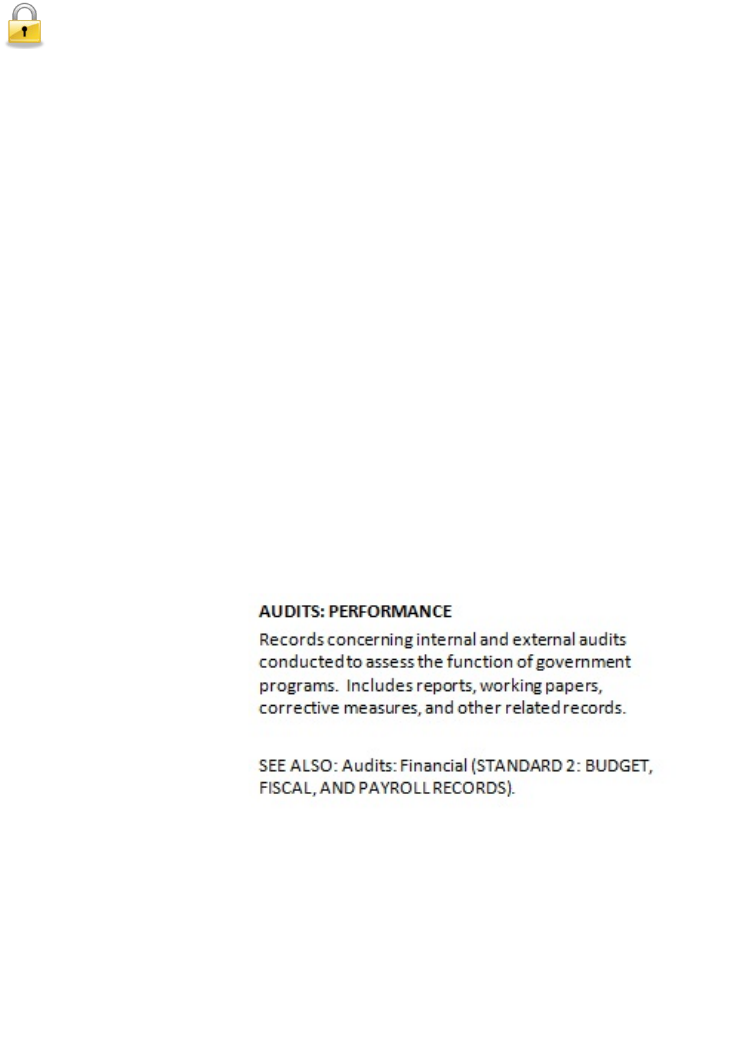
2021 Program Records Schedule: Local Government Agencies vi
LEGEND FOR RECORDS SCHEDULE
This records retention and disposition schedule applies to records in all media, unless otherwise
specified.
– symbol designating that one or more records in this series may be confidential or Includes
confidential information.
Item # – an identifying number assigned to each records series for ease of reference.
Series – “a group of similar records that are . . . related as the result of being created, received, or used
in the same activity.” (From Society of American Archivists, Dictionary of Archives Terminology).
Series in this schedule are based on common functions in government offices.
Records Series Title – a short identification of the records in a series, based on their common function.
Series Description – a longer description of the records in a series, often including the types of records
that can frequently be found in that series. This information is included underneath the Records
Series Title.
Disposition Instructions – instructions dictating the length of time a series must be retained and how
the office should dispose of those records after that time.
Citation – a listing of references to statutes, laws, and codes related to the records series. Citations can
include:
• Authority: governing the creation of records
• Confidentiality: limiting access to public records
• Retention: setting a retention period
Throughout this schedule, items that cross-reference other items within this schedule are indicated with
a SEE ALSO reference. If you hover your cursor over one of these items, you will see the hand tool that
will enable you to click on the item to follow the link to that location.
No destruction of records may take place if litigation or audits are pending or reasonably anticipated.
See also AUDITS, LITIGATION, AND OTHER OFFICIAL ACTIONS
, page A-5.
Sample records series title and description with cross-reference included
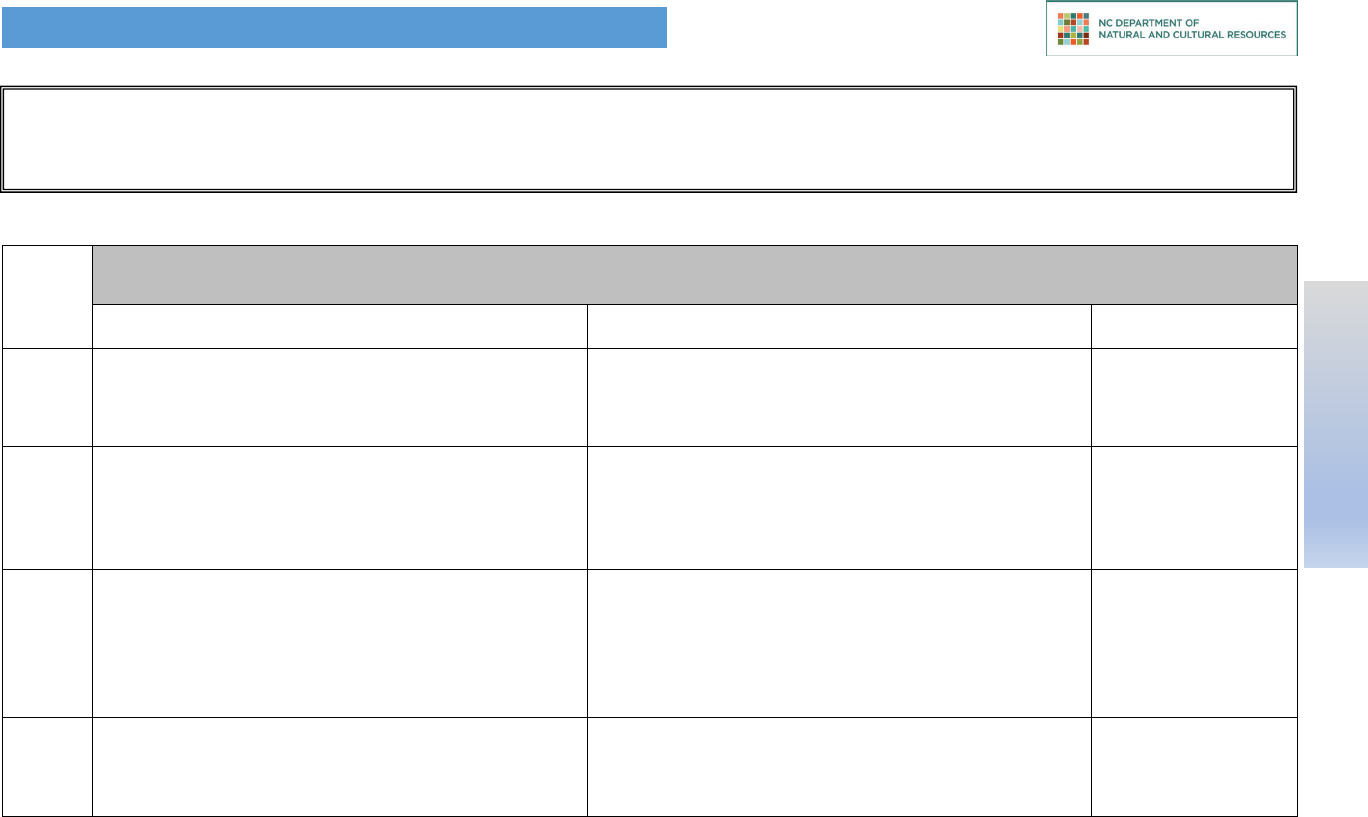
2021 PROGRAM RECORDS SCHEDULE: LOCAL GOVERNMENT AGENCIES
10: Airport Authority
* No destruction of records may take place if audits or litigation are pending or reasonably anticipated. See AUDITS, LITIGATION, AND OTHER OFFICIAL ACTION,
page A-5.
± The agency hereby agrees that it will establish and enforce internal policies setting minimum retention periods for the records that Natural and Cultural
Resources has scheduled with the disposition instruction “destroy when reference value ends.” Please use the space provided.
1
ITEM #
STANDARD 10: AIRPORT AUTHORITY RECORDS
RECORDS SERIES TITLE DISPOSITION INSTRUCTIONS CITATION
10.01
ACCESS CONTROL RECORDS
Records concerning employee or contractor access to
facilities or resources.
Destroy in office 1 year after expiration.
10.02
AIR SPACE CONSTRUCTION
Applications to construct structures which may obstruct
flight space. Includes correspondence and related
records.
Destroy in office after 5 years.
10.03
AIRFIELD INSPECTION
Records concerning airfield inspections on runway
conditions, fueling agents, fire and rescue facilities,
ground vehicle control and other airport condition
information.
Destroy in office after 1 year.
Authority/Retention:
14 CFR 139.301
10.04
AIRPORT MASTER RECORD
Federal Aviation Administration (FAA) form 5010
documenting basic information concerning airports.
Destroy in office when superseded or obsolete.
STANDARD 10: PROGRAM OPERATIONAL RECORDS – AIRPORT AUTHORITY RECORDS
Official records and materials created and accumulated incidental to the operation of a county or municipal airport.

2021 PROGRAM RECORDS SCHEDULE: LOCAL GOVERNMENT AGENCIES
10: Airport Authority
* No destruction of records may take place if audits or litigation are pending or reasonably anticipated. See AUDITS, LITIGATION, AND OTHER OFFICIAL ACTION,
page A-5.
± The agency hereby agrees that it will establish and enforce internal policies setting minimum retention periods for the records that Natural and Cultural
Resources has scheduled with the disposition instruction “destroy when reference value ends.” Please use the space provided.
2
ITEM #
STANDARD 10: AIRPORT AUTHORITY RECORDS
RECORDS SERIES TITLE DISPOSITION INSTRUCTIONS CITATION
10.05
LAND DEVELOPMENT AND PLANNING STUDIES AND
REPORTS
Records documenting local government and airport
authority land use and development planning.
Retain in office permanently.
10.06
RADIO LOGS
Records of radio calls received and placed.
Destroy in office after 1 year.

2021 PROGRAM RECORDS SCHEDULE: LOCAL GOVERNMENT AGENCIES
11: Animal Services
* No destruction of records may take place if audits or litigation are pending or reasonably anticipated. See AUDITS, LITIGATION, AND OTHER OFFICIAL ACTION,
page A-5.
± The agency hereby agrees that it will establish and enforce internal policies setting minimum retention periods for the records that Natural and Cultural
Resources has scheduled with the disposition instruction “destroy when reference value ends.” Please use the space provided.
3
ITEM #
STANDARD 11: ANIMAL SERVICES RECORDS
RECORDS SERIES TITLE DISPOSITION INSTRUCTIONS CITATION
11.01
ANIMAL ABUSE AND CRUELTY RECORDS
Includes complaints, citations and/or compliance orders,
and other related records.
Destroy in office after 5 years.*
See G.S. 14-360 for
definition of animal
cruelty.
11.02
ANIMAL COMPLAINT RECORDS
Includes complaints of animal nuisances.
Destroy in office after 3 years.*
11.03
ANIMAL CONTROL RECORDS
Records of animal control calls. Includes information
regarding animal bites, animals received from residents,
strays caught, animals taken to shelter or returned to
owner, use of tranquilizer guns, and other related
records. Also includes citations and/or compliance orders
issued to animal owners for violations of government
ordinances.
a) Destroy in office records concerning dangerous
animals when known dead or after 10 years.
b) Destroy in office animal control citations and
compliance orders after 3 years.*
c) Destroy in office remaining records after 1 year.
STANDARD 11: PROGRAM OPERATIONAL RECORDS – ANIMAL SERVICES RECORDS
Records created and received during the conduct of animal services programs.
NOTE: Some records are covered by General Records Schedule: Local Government Agencies and, therefore, are not listed separately here. See Reference
(Reading) File and Reports and Studies (Administration and Management Records).

2021 PROGRAM RECORDS SCHEDULE: LOCAL GOVERNMENT AGENCIES
11: Animal Services
* No destruction of records may take place if audits or litigation are pending or reasonably anticipated. See AUDITS, LITIGATION, AND OTHER OFFICIAL ACTION,
page A-5.
± The agency hereby agrees that it will establish and enforce internal policies setting minimum retention periods for the records that Natural and Cultural
Resources has scheduled with the disposition instruction “destroy when reference value ends.” Please use the space provided.
4
ITEM #
STANDARD 11: ANIMAL SERVICES RECORDS
RECORDS SERIES TITLE DISPOSITION INSTRUCTIONS CITATION
11.04
ANIMAL LICENSING RECORDS
Records concerning the licensing of dogs, cats, and other
animals. Includes owner and animal information and
record of fees paid.
Destroy in office after 3 years.*
Confidentiality:
G.S. 132-1.2 (2)
11.05
ANIMAL SHELTER RECORDS
Records of animals impounded at the shelter, including
date of impoundment, length of impoundment,
disposition of animal, and any other information required
by rules adopted by the State Board of Agriculture. Also
includes certificates of animal release (e.g., adoption,
reclaim, transfer, return to field) and owner contact
records.
Destroy in office 3 years after date of impoundment.
Authority/Retention:
G.S. 19A-32.1(j)
Confidentiality (for
specific counties):
G.S. 132-1.15
11.06
CONTROLLED SUBSTANCE EUTHANASIA LOG
Includes amount of controlled substances used.
Destroy in office after 2 years.
Retention:
21 CFR 1304.04
11.07
HISTORIES OF PET OWNERS
Records concerning information for each animal owner
who violates government ordinances. Includes complaint
forms and other related records.
Destroy in office after 3 years.*
11.08
RABIES VACCINATION RECORDS
Includes rabies vaccination certificates submitted to
agency by area veterinarians.
Destroy in office after 3 years.
Authority:
G.S. 130A-189

2021 PROGRAM RECORDS SCHEDULE: LOCAL GOVERNMENT AGENCIES
12: Codes & Inspections
* No destruction of records may take place if audits or litigation are pending or reasonably anticipated. See AUDITS, LITIGATION, AND OTHER OFFICIAL ACTION,
page A-5.
± The agency hereby agrees that it will establish and enforce internal policies setting minimum retention periods for the records that Natural and Cultural
Resources has scheduled with the disposition instruction “destroy when reference value ends.” Please use the space provided.
5
ITEM #
STANDARD 12: CODE ENFORCEMENT AND INSPECTION RECORDS
RECORDS SERIES TITLE DISPOSITION INSTRUCTIONS CITATION
12.01
AIR POLLUTION SOURCE INFORMATION
Includes records for facilities which are no longer
operational.
Destroy in office after 2 years.*
12.02
BLUEPRINTS AND SPECIFICATIONS
Records concerning blueprints and specifications of local
government owned buildings and facilities, or drawings
submitted when applying for a building permit for new
construction. Includes as-built plans and related records
concerning approved changes or used in determining code
compliance and enforcement of building code.
SEE ALSO: GENERAL RECORDS SCHEDULE: LOCAL
GOVERNMENT AGENCIES, Blueprints and Specifications
(STANDARD 1: ADMINISTRATION AND MANAGEMENT
RECORDS).
a) Retain agency blueprints and specifications for life of
structure.
b) Destroy in office commercial blueprints and
specifications 1 year after completion of project.
c) Destroy in office residential blueprints and
specifications when reference value ends.±
Agency Policy: Destroy in office after ___________
Confidentiality:
G.S. 132-1.7
STANDARD 12: PROGRAM OPERATIONAL RECORDS – CODE ENFORCEMENT AND INSPECTION RECORDS
Official records and materials created and accumulated during the conduct of local government code enforcement and inspection programs.
NOTE: Some records are covered by the General Records Schedule: Local Government Agencies and, therefore, are not listed separately here.

2021 PROGRAM RECORDS SCHEDULE: LOCAL GOVERNMENT AGENCIES
12: Codes & Inspections
* No destruction of records may take place if audits or litigation are pending or reasonably anticipated. See AUDITS, LITIGATION, AND OTHER OFFICIAL ACTION,
page A-5.
± The agency hereby agrees that it will establish and enforce internal policies setting minimum retention periods for the records that Natural and Cultural
Resources has scheduled with the disposition instruction “destroy when reference value ends.” Please use the space provided.
6
ITEM #
STANDARD 12: CODE ENFORCEMENT AND INSPECTION RECORDS
RECORDS SERIES TITLE DISPOSITION INSTRUCTIONS CITATION
12.03
BUILDING AND ROAD PERMITTING AND INSPECTION
RECORDS
Records documenting applications for permits from
property owners to erect new structures or manufactured
homes, or to make structural modifications, demolition,
fire permits, or the installation of plumbing, electrical, or
mechanical systems. Includes permits, inspection reports,
inspector’s worksheets, inspection requests, denial
reports, sketches, correspondence (including e-mail), and
contractor change forms.
a) Destroy in office permits, applications, and inspection
reports (or worksheets) 6 years after Certificate of
Occupancy is issued or project is complete (inactive).
b) Destroy in office Certificate of Occupancy 6 years after
permit is expired.
c) Destroy in office remaining records, including
applications for which a permit was never issued,
when reference value ends.±
Agency Policy: Destroy in office after _____________
12.04
CONTROLLED SUBSTANCE LABS DECONTAMINATION
RECORDS
Records concerning decontamination compliance.
Destroy in office 3 years after documented
decontamination is complete.
12.05
DROUGHT CONTINGENCY PLANS
Includes water conservation plans in the event of a
drought.
Destroy in office when superseded or obsolete.
12.06
EROSION AND SEDIMENT CONTROL ENFORCEMENT
CASES
Includes settled legal matters and penalties.
SEE ALSO: Violations: Building and Housing, below.
Destroy in office 6 years after settlement.*

2021 PROGRAM RECORDS SCHEDULE: LOCAL GOVERNMENT AGENCIES
12: Codes & Inspections
* No destruction of records may take place if audits or litigation are pending or reasonably anticipated. See AUDITS, LITIGATION, AND OTHER OFFICIAL ACTION,
page A-5.
± The agency hereby agrees that it will establish and enforce internal policies setting minimum retention periods for the records that Natural and Cultural
Resources has scheduled with the disposition instruction “destroy when reference value ends.” Please use the space provided.
7
ITEM #
STANDARD 12: CODE ENFORCEMENT AND INSPECTION RECORDS
RECORDS SERIES TITLE DISPOSITION INSTRUCTIONS CITATION
12.07
EROSION AND SEDIMENT CONTROL PLANS
Includes approved and disapproved plans as well as
revisions and addenda.
a) Destroy in office approved plans 6 years after approval
or last revision and/or addendum.
b) Destroy in office non-approved plans after 3 years.
12.08
EXEMPTION (VARIANCE) RECORDS
Records concerning exemptions and variances concerned
with the installation of water, sewer, gas, or electric lines.
a) Destroy in office 5 years after expiration.*
b) Destroy in office records for which an exemption or
variance was not issued after 3 years.
Retention:
40 CFR 141.33
15A NCAC 18C .1526
12.09
GOING-OUT-OF-BUSINESS LICENSES
Records concerning licenses granted to business to hold
going out of business, water and smoke damage, and
distress sales.
Destroy in office 1 year expiration.
12.10
GROUNDWATER MONITORING RECORDS
Includes all groundwater monitoring wells and associated
groundwater surface elevations.
Destroy in office after 5 years.*
Authority:
15 NCAC 2C .0100
12.11
ILLEGAL DUMPING FILE
Records concerning illegal dumping complaints received.
SEE ALSO: Violations: Solid Waste Management, below.
Destroy in office after 5 years.*
12.12
INSPECTIONS
Inspections conducted by local government agencies
concerning enforcement of state and local laws, codes,
and ordinances.
Destroy in office after 6 years.*

2021 PROGRAM RECORDS SCHEDULE: LOCAL GOVERNMENT AGENCIES
12: Codes & Inspections
* No destruction of records may take place if audits or litigation are pending or reasonably anticipated. See AUDITS, LITIGATION, AND OTHER OFFICIAL ACTION,
page A-5.
± The agency hereby agrees that it will establish and enforce internal policies setting minimum retention periods for the records that Natural and Cultural
Resources has scheduled with the disposition instruction “destroy when reference value ends.” Please use the space provided.
8
ITEM #
STANDARD 12: CODE ENFORCEMENT AND INSPECTION RECORDS
RECORDS SERIES TITLE DISPOSITION INSTRUCTIONS CITATION
12.13
LEAD AND COPPER COMPLIANCE RECORDS
Includes all monitoring records required by federal, state,
and local regulations.
Destroy in office after 12 years.*
Retention:
40 CFR 141.91
12.14
LANDFILL TONNAGE AND COST FILE
Destroy in office after the 5 year reporting period is
complete.
12.15
PERMITS: CONSTRUCTION
Records documenting applications and permits
regarding sign installation, fencing, swimming pools,
driveways, or similar activity required by local
ordinance.
SEE ALSO: GENERAL RECORDS SCHEDULE: LOCAL
GOVERNMENT AGENCIES, Miscellaneous (Non-Building)
Applications, Licenses, and Permits (STANDARD 1:
ADMINISTRATION AND MANAGEMENT RECORDS).
a) Destroy in office 3 years after completion of project.
b) Destroy in office applications for which a permit was
never issued when reference value ends.±
Agency Policy: Destroy in office after _____________
12.16
PERMITS: PUBLIC UTILITIES PROJECTS
Records documenting permits, approval letters, and other
related documentation required by local, state, or federal
ordinance, regulation, or statute. Includes records
regarding National Pollutant Discharge Elimination
System (NPDES) permits.
a) Retain in office approval letters and supporting
documentation permanently.
b) Destroy in office permits 6 years after expiration,
cancellation, revocation, or denial.*
Authority:
40 CFR 122.28
15A NCAC 18C .0300
Confidentiality:
15A NCAC 02H .0115

2021 PROGRAM RECORDS SCHEDULE: LOCAL GOVERNMENT AGENCIES
12: Codes & Inspections
* No destruction of records may take place if audits or litigation are pending or reasonably anticipated. See AUDITS, LITIGATION, AND OTHER OFFICIAL ACTION,
page A-5.
± The agency hereby agrees that it will establish and enforce internal policies setting minimum retention periods for the records that Natural and Cultural
Resources has scheduled with the disposition instruction “destroy when reference value ends.” Please use the space provided.
9
ITEM #
STANDARD 12: CODE ENFORCEMENT AND INSPECTION RECORDS
RECORDS SERIES TITLE DISPOSITION INSTRUCTIONS CITATION
12.17
RECREATIONAL VEHICLE REGISTRATION RECORDS
Records concerning issuance of registrations/decals for
recreational vehicles. Includes, but is not limited to, golf
carts, canoes, and mopeds as well as proof of insurance
and renewals.
Destroy in office 1 year after expiration.*
12.18
UNSAFE BUILDINGS FILE
Records documenting inspections and notifications to
owners of unsafe conditions relative to a particular
structure.
SEE ALSO: Violations: Building and Housing, below.
Destroy in office after 6 years provided all issues have been
resolved.*
12.19
VALVE OPERATION FILE
Destroy in office when reference value ends.
±
Agency Policy: Destroy in office after__________________
12.20
VIOLATIONS: BUILDING AND HOUSING
Records documenting violations of building and fire code,
minimum housing, and erosion and sediment control.
Includes complaints, summons, notices, appeals, and
other information created or compiled during the course
of investigation and resolution of each alleged violation.
SEE ALSO: Water Analysis, below.
a) Destroy building code violations in office 6 years after
verification of correction.
b) Destroy remaining records in office 3 years after
verification of correction.*

2021 PROGRAM RECORDS SCHEDULE: LOCAL GOVERNMENT AGENCIES
12: Codes & Inspections
* No destruction of records may take place if audits or litigation are pending or reasonably anticipated. See AUDITS, LITIGATION, AND OTHER OFFICIAL ACTION,
page A-5.
± The agency hereby agrees that it will establish and enforce internal policies setting minimum retention periods for the records that Natural and Cultural
Resources has scheduled with the disposition instruction “destroy when reference value ends.” Please use the space provided.
10
ITEM #
STANDARD 12: CODE ENFORCEMENT AND INSPECTION RECORDS
RECORDS SERIES TITLE DISPOSITION INSTRUCTIONS CITATION
12.21
VIOLATIONS: SOLID WASTE MANAGEMENT
Includes complaints, notices of violations, citations,
investigation records, court documents, and other related
records issued by solid waste environmental enforcement
programs.
Destroy in office 7 years after resolution of case.*
12.22
VIOLATIONS: WATER CONSERVATION
Records concerning notices of water conservation
violations.
Destroy in office when reference value ends. ±
Agency Policy: Destroy in office after__________________
12.23
WASTEWATER POLLUTION CONTROL AND
ABATEMENT RECORDS
Destroy in office after 5 years.*
Authority:
15A NCAC 2B .0505
12.24
WASTEWATER QUALITY ANALYSIS RECORDS
a) Destroy in office analysis reports after 3 years.*
b) Destroy in office monitoring and calculation sheets
after 1 year.*
Authority:
15A NCAC 2B .0505

2021 PROGRAM RECORDS SCHEDULE: LOCAL GOVERNMENT AGENCIES
12: Codes & Inspections
* No destruction of records may take place if audits or litigation are pending or reasonably anticipated. See AUDITS, LITIGATION, AND OTHER OFFICIAL ACTION,
page A-5.
± The agency hereby agrees that it will establish and enforce internal policies setting minimum retention periods for the records that Natural and Cultural
Resources has scheduled with the disposition instruction “destroy when reference value ends.” Please use the space provided.
11
ITEM #
STANDARD 12: CODE ENFORCEMENT AND INSPECTION RECORDS
RECORDS SERIES TITLE DISPOSITION INSTRUCTIONS CITATION
12.25
WATER ANALYSIS
Records concerning bacteriological, chemical, radiological,
and physical analyses and climatological observations as
well as records of actions taken to correct violations.
SEE ALSO: Violations: Building and Housing and Violations:
Water Conservations, above.
a) Destroy in office records of chemical and
radiological analysis after 10 years.
b) Destroy in office records of bacteriological and
turbidity analysis after 5 years.
c) Destroy in office records of actions taken to
correct violations 3 years after last corrective
action taken.
d) Destroy in office remaining records after 5 years.
Retention:
40 CFR 141.33
15A NCAC 18C .1526
12.26
WATER SYSTEM OPERATIONS RECORDS
Records concerning the operations of water supply,
treatment, distribution, and collection. Includes
backflow prevention reports, flow reports, capacity
studies, pump station reports, and similar records that
summarize
Destroy in office after 10 years.
Retention:
40 CFR 141.33
15A NCAC 18C .1526
12.27
WATER TANKS, SPECIFICATIONS, AND BOOSTER
STATIONS FILE
Destroy in office after 5 years.*

2021 PROGRAM RECORDS SCHEDULE: LOCAL GOVERNMENT AGENCIES
13: EMS & Fire Department
* No destruction of records may take place if audits or litigation are pending or reasonably anticipated. See AUDITS, LITIGATION, AND OTHER OFFICIAL ACTION,
page A-5.
± The agency hereby agrees that it will establish and enforce internal policies setting minimum retention periods for the records that Natural and Cultural
Resources has scheduled with the disposition instruction “destroy when reference value ends.” Please use the space provided.
12
ITEM #
STANDARD 13: EMERGENCY MEDICAL SERVICES AND FIRE DEPARTMENT RECORDS
RECORDS SERIES TITLE DISPOSITION INSTRUCTIONS CITATION
13.01
911 COMMUNICATION RECORDS AND RECORDINGS
Records documenting any communications made by the
public with 911. Includes transcripts and recordings of
911 calls received, transcripts of text messages received
by 911, and computer-aided dispatch (CAD) reports.
SEE ALSO: Dispatch Records and Recordings, below AND
PROGRAM RECORDS SCHEDULE: LOCAL GOVERNMENT
AGENCIES, Communication Records (STANDARD 20: LAW
ENFORCEMENT RECORDS)
Destroy in office after 30 days, if not made part of a case
file.*
Confidentiality:
G.S. 132-1.5
G.S. 132-1.4(c)(4)
Retention:
G.S. 132-1.4(i)
13.02
AMBULANCE CALL REPORTS (ACR)/PATIENT CARE
REPORTS (PCR)
Records concerning equipment used, patient location,
nature of call, vital signs and other physical signs, care
rendered, medicine ordered, etc.
a) Transfer copy of report to the admitting hospital for
inclusion into patient's medical record.
b) Destroy original in office after 3 years.*
Confidentiality:
G.S. 130A-12
STANDARD 13: PROGRAM OPERATIONAL RECORDS – EMERGENCY MEDICAL SERVICES AND FIRE DEPARTMENT RECORDS
Official records documenting the primary functions of emergency services programs and fire departments.
Footage from body-worn cameras is scheduled by the content captured or the purpose of the footage rather than by its format. Recordings may fit under
FIRE INVESTIGATION CASE FILES, DISPATCH RECORDS AND RECORDINGS, PUBLICITY RECORDS (General Schedule), TRAINING AND EDUCATIONAL RECORDS
(General Schedule), and other items as appropriate. Footage is only confidential if it fits within an item where confidentiality is conferred by state or
federal statute.

2021 PROGRAM RECORDS SCHEDULE: LOCAL GOVERNMENT AGENCIES
13: EMS & Fire Department
* No destruction of records may take place if audits or litigation are pending or reasonably anticipated. See AUDITS, LITIGATION, AND OTHER OFFICIAL ACTION,
page A-5.
± The agency hereby agrees that it will establish and enforce internal policies setting minimum retention periods for the records that Natural and Cultural
Resources has scheduled with the disposition instruction “destroy when reference value ends.” Please use the space provided.
13
ITEM #
STANDARD 13: EMERGENCY MEDICAL SERVICES AND FIRE DEPARTMENT RECORDS
RECORDS SERIES TITLE DISPOSITION INSTRUCTIONS CITATION
13.03
BUILDING AND FIRE SAFETY SYSTEM PLANS
Records concerning plans and fire safety systems of
commercial, industrial, and government-owned
properties.
Destroy in office when superseded or obsolete.
13.04
DISPATCH RECORDS AND RECORDINGS
Records and recordings concerning activities during an
emergency services dispatch. Includes company run
reports and fire journals as well as ambulance dispatch
and service run records. Also includes footage from body-
worn cameras of EMS and Fire Department personnel
when responding to an emergency if not otherwise
included in a separate item.
SEE ALSO: 911 Communication Records and Recordings,
above AND PROGRAM RECORDS SCHEDULE: LOCAL
GOVERNMENT AGENCIES, Communication Records
(STANDARD 20: LAW ENFORCEMENT RECORDS).
Destroy in office after 30 days, if not made part of a case
file.*
Confidentiality:
G.S. 132-1.4
G.S. 143-518
45 CFR 164.501
42 U.S.C. 1395x
13.05
FIRE ALARM AND AUTOMATIC EXTINGUISHER FILE
Records documenting licenses and insurance certificates
of companies that perform installations of fire alarm and
automatic extinguishing systems.
Destroy in office when superseded or obsolete.
13.06
FIRE DISPATCH FILE
Records concerning fire dispatch zones. Includes maps of
fire dispatch zones, census tract information, annexation
research, street closings, and other related material.
Destroy in office when superseded or obsolete.

2021 PROGRAM RECORDS SCHEDULE: LOCAL GOVERNMENT AGENCIES
13: EMS & Fire Department
* No destruction of records may take place if audits or litigation are pending or reasonably anticipated. See AUDITS, LITIGATION, AND OTHER OFFICIAL ACTION,
page A-5.
± The agency hereby agrees that it will establish and enforce internal policies setting minimum retention periods for the records that Natural and Cultural
Resources has scheduled with the disposition instruction “destroy when reference value ends.” Please use the space provided.
14
ITEM #
STANDARD 13: EMERGENCY MEDICAL SERVICES AND FIRE DEPARTMENT RECORDS
RECORDS SERIES TITLE DISPOSITION INSTRUCTIONS CITATION
13.07
FIRE INVESTIGATION CASE FILES
Records concerning investigations of fire. Includes
reports, photographs, evidence, and other related
records.
SEE ALSO: PROGRAM RECORDS SCHEDULE: LOCAL
GOVERNMENT AGENCIES, Case File: Felonies AND Case
File: Misdemeanors (STANDARD 20: LAW ENFORCEMENT
RECORDS).
a) Retain in office permanently when loss of life occurs or
if a publicly-owned building is involved.*
b) Destroy in office after 10 years when arson is
involved.*
c) Destroy in office after 5 years when cause of fire is
determined to be accidental and no loss of life
occurs.*
Confidentiality:
G.S. 132-1.4
13.08
FIRE SAFETY INSPECTIONS AND PERMITS
Records documenting inspections of and permits issued
for fire protection measures and procedures for systems
and buildings.
a) Destroy in office inspections with no defects after 3
years.
b) Destroy in office inspections with noted defects 3
years after defects are corrected.*
c) Destroy in office permits 3 years after expiration.
13.09
NORTH CAROLINA FIRE INCIDENT REPORT
Includes report required by state statute to document
certain fire incidents.
For retention of copies of fire incident reports filed with
other agencies, see: GENERAL RECORDS SCHEDULE:
LOCAL GOVERNMENT AGENCIES, Reports (STANDARD 1:
ADMINISTRATION AND MANAGEMENT RECORDS).
Retain original report permanently.
Authority/Retention:
G.S. 58-79-45

2021 PROGRAM RECORDS SCHEDULE: LOCAL GOVERNMENT AGENCIES
13: EMS & Fire Department
* No destruction of records may take place if audits or litigation are pending or reasonably anticipated. See AUDITS, LITIGATION, AND OTHER OFFICIAL ACTION,
page A-5.
± The agency hereby agrees that it will establish and enforce internal policies setting minimum retention periods for the records that Natural and Cultural
Resources has scheduled with the disposition instruction “destroy when reference value ends.” Please use the space provided.
15
ITEM #
STANDARD 13: EMERGENCY MEDICAL SERVICES AND FIRE DEPARTMENT RECORDS
RECORDS SERIES TITLE DISPOSITION INSTRUCTIONS CITATION
13.10
PHARMACEUTICAL AND NARCOTICS RECORDS
Records documenting the administration of
pharmaceuticals and narcotics to patients as required by
the Drug Enforcement Agency.
Destroy in office after 3 years.*
Authority:
21 CFR 1310.03
Confidentiality:
G.S. 130A-12
Retention:
21 CFR 1310.04

2021 PROGRAM RECORDS SCHEDULE: LOCAL GOVERNMENT AGENCIES
14: Parks and Recreation
* No destruction of records may take place if audits or litigation are pending or reasonably anticipated. See AUDITS, LITIGATION, AND OTHER OFFICIAL ACTION,
page A-5.
± The agency hereby agrees that it will establish and enforce internal policies setting minimum retention periods for the records that Natural and Cultural
Resources has scheduled with the disposition instruction “destroy when reference value ends.” Please use the space provided.
16
ITEM #
STANDARD 14: PARKS AND RECREATION RECORDS
RECORDS SERIES TITLE DISPOSITION INSTRUCTIONS CITATION
14.01
ADMISSION RECORDS
Records of admissions to parks or recreation facilities.
Destroy in office after 3 years.*
14.02
CITATIONS RECORDS
Citations issued by park personnel to persons who violate
park rules and regulations.
Destroy in office after 2 years.
14.03
OFFICIALS FILE
Records concerning individuals who officiate games.
Includes schedule and correspondence (including e-mail).
SEE ALSO: GENERAL RECORDS SCHEDULE: LOCAL
GOVERNMENT AGENCIES, Payroll and Earnings Records
(STANDARD 2: BUDGET, FISCAL, AND PAYROLL
RECORDS) or Seasonal and Contract Worker Records
(STANDARD 4: HUMAN RESOURCES RECORDS) for
disposition of payment records.
Destroy in office after 3 years.
STANDARD 14: PROGRAM OPERATIONAL RECORDS – PARKS AND RECREATION RECORDS
Records created and received by Parks and Recreation departments.

2021 PROGRAM RECORDS SCHEDULE: LOCAL GOVERNMENT AGENCIES
14: Parks and Recreation
* No destruction of records may take place if audits or litigation are pending or reasonably anticipated. See AUDITS, LITIGATION, AND OTHER OFFICIAL ACTION,
page A-5.
± The agency hereby agrees that it will establish and enforce internal policies setting minimum retention periods for the records that Natural and Cultural
Resources has scheduled with the disposition instruction “destroy when reference value ends.” Please use the space provided.
17
ITEM #
STANDARD 14: PARKS AND RECREATION RECORDS
RECORDS SERIES TITLE DISPOSITION INSTRUCTIONS CITATION
14.04
PARKS PLANNING FILE
Records concerning master plans and working plans for
each park property and recreational facility which show
layout, topography, and proposed developments and
improvements. Includes drainage and resource maps,
aerial maps, site analysis drawings, construction plans,
and as-built drawings.
SEE ALSO: GENERAL RECORDS SCHEDULE: LOCAL
GOVERNMENT AGENCIES, Strategic Plan (STANDARD 1:
ADMINISTRATION AND MANAGEMENT RECORDS) AND
GENERAL RECORDS SCHEDULE: LOCAL GOVERNMENT
AGENCIES, Maps: Parks (STANDARD 3: GEOGRAPHIC
INFORMATION SYSTEMS (GIS) RECORDS).
a) If an element of the Strategic Plan, destroy in office
when reference value ends.±
Agency Policy: Destroy in office after
____________
b) If not an element of the Strategic Plan, destroy in
office when superseded or obsolete.
14.05
POOL RECORDS
Records concerning monthly reports indicating
operational data, chemicals used, chlorination levels and
other information relating to pool construction,
maintenance, and health and safety.
Destroy in office after 1 year.
14.06
RECREATION PROGRAMS
Records concerning athletic and recreation programs.
Includes staff notes, lesson plans, course descriptions,
instruction manuals, schedules, team rosters, reservation
records, copies of receipts for fees paid, age verification
records, and concession operators list.
a) Destroy in office program records after 3 years.
b) Destroy age verification records when reference
value ends.±
Agency Policy: Destroy in office after_____________
Confidentiality:
G.S. 132-1.12

2021 PROGRAM RECORDS SCHEDULE: LOCAL GOVERNMENT AGENCIES
14: Parks and Recreation
* No destruction of records may take place if audits or litigation are pending or reasonably anticipated. See AUDITS, LITIGATION, AND OTHER OFFICIAL ACTION,
page A-5.
± The agency hereby agrees that it will establish and enforce internal policies setting minimum retention periods for the records that Natural and Cultural
Resources has scheduled with the disposition instruction “destroy when reference value ends.” Please use the space provided.
18
ITEM #
STANDARD 14: PARKS AND RECREATION RECORDS
RECORDS SERIES TITLE DISPOSITION INSTRUCTIONS CITATION
14.07
TICKET STUBS
Destroy in office when reference value ends.
±
Agency Policy: Destroy in office after__________________

2021 PROGRAM RECORDS SCHEDULE: LOCAL GOVERNMENT AGENCIES
15: Planning and Regulation of Development
* No destruction of records may take place if audits or litigation are pending or reasonably anticipated. See AUDITS, LITIGATION, AND OTHER OFFICIAL ACTION,
page A-5.
± The agency hereby agrees that it will establish and enforce internal policies setting minimum retention periods for the records that Natural and Cultural
Resources has scheduled with the disposition instruction “destroy when reference value ends.” Please use the space provided.
19
ITEM #
STANDARD 15: PLANNING AND REGULATION OF DEVELOPMENT RECORDS
RECORDS SERIES TITLE DISPOSITION INSTRUCTIONS CITATION
15.01
BOARD OF ADJUSTMENT CASE FILES AND INDEXES
Cases submitted to the board requesting variances from
current zoning ordinances. Includes indexes to cases
reviewed by the board.
a) Retain indices in office permanently.
b) Destroy in office case files after 6 years.*
Retention:
G.S. 1-50(5)
STANDARD 15: PROGRAM OPERATIONAL RECORDS – PLANNING AND REGULATION OF DEVELOPMENT RECORDS
Official records and materials created and accumulated during the conduct of local government planning, regulation of development, and zoning
programs.
Community Development Block Grants (CDBG) records are found in Standard 16: Public Housing Authorities, Redevelopment Commissions, and
Entitlement Communities Records.
NOTE: Some records are covered by the Local Government Agencies General Records Retention and Disposition Schedule and, therefore, are not listed
separately here.

2021 PROGRAM RECORDS SCHEDULE: LOCAL GOVERNMENT AGENCIES
15: Planning and Regulation of Development
* No destruction of records may take place if audits or litigation are pending or reasonably anticipated. See AUDITS, LITIGATION, AND OTHER OFFICIAL ACTION,
page A-5.
± The agency hereby agrees that it will establish and enforce internal policies setting minimum retention periods for the records that Natural and Cultural
Resources has scheduled with the disposition instruction “destroy when reference value ends.” Please use the space provided.
20
ITEM #
STANDARD 15: PLANNING AND REGULATION OF DEVELOPMENT RECORDS
RECORDS SERIES TITLE DISPOSITION INSTRUCTIONS CITATION
15.02
CERTIFICATES OF APPROPRIATENESS
Certificates submitted by the Historic Preservation
Commission allowing alterations to exterior portions of
building and structures on or within historic landmarks
and districts. Includes applications and other related
records.
a) Retain in office certificates for life of structure and
then destroy.
b) Destroy in office denied applications when reference
value ends.
±
Agency Policy: Destroy in office after ____________
c) Destroy in office remaining records when reference
value ends.
±
Agency Policy: Destroy in office after ____________
Authority:
G.S. 160A-400.9
15.03
COMPREHENSIVE PLAN AND AMENDMENTS
Official copies of comprehensive plan and all background
surveys, studies, reports, draft versions of plans, and
supporting documentation.
SEE ALSO: GENERAL RECORDS SCHEDULE: LOCAL
GOVERNMENT AGENCIES, Strategic Plan (STANDARD 1:
ADMINISTRATION AND MANAGEMENT RECORDS).
a) Retain in office permanently adopted plan and
amendments.
b) Destroy in office remaining records 3 years after
adoption of plan.

2021 PROGRAM RECORDS SCHEDULE: LOCAL GOVERNMENT AGENCIES
15: Planning and Regulation of Development
* No destruction of records may take place if audits or litigation are pending or reasonably anticipated. See AUDITS, LITIGATION, AND OTHER OFFICIAL ACTION,
page A-5.
± The agency hereby agrees that it will establish and enforce internal policies setting minimum retention periods for the records that Natural and Cultural
Resources has scheduled with the disposition instruction “destroy when reference value ends.” Please use the space provided.
21
ITEM #
STANDARD 15: PLANNING AND REGULATION OF DEVELOPMENT RECORDS
RECORDS SERIES TITLE DISPOSITION INSTRUCTIONS CITATION
15.04
CONDITIONAL USE PERMIT RECORDS AND INDEX
Records concerning applications for conditional use
permits. Permits allow for the construction of buildings,
on the condition that impacts on neighborhoods are
mitigated. Includes original application, blueprint
drawings, investigative reports, planning commission
recommendations, cash receipts, and related
correspondence (including e-mail). Also includes
reference copies of variances or exceptions from zoning
regulations granted by the Board of Adjustment.
a) Destroy in office 3 years after discontinuance of use.
b) Destroy in office applications for which a permit
was never issued when reference value ends.
±
Agency Policy: Destroy in office after _________
15.05
DECLARATIONS AND BY-LAWS FROM TOWNHOUSES,
CONDOMINIUMS, PLANNED RESIDENTIAL
DEVELOPMENTS, COMMON AREAS, ETC.
a) If not filed in Register of Deeds or similar agency,
retain in office permanently.
b) If filed in Register of Deeds or similar agency,
destroy in office when reference value ends.
±
Agency Policy: Destroy in office after ____________
Authority:
G.S. 47C-2-103
15.06
ENVIRONMENTAL IMPACT STUDIES
Records and reports concerning the environmental
impact of major projects proposed by localities and
reviewed by local officials.
Retain in office permanently.
15.07
OPEN SPACE CLASSIFICATION CASE FILE
Retain in office permanently.

2021 PROGRAM RECORDS SCHEDULE: LOCAL GOVERNMENT AGENCIES
15: Planning and Regulation of Development
* No destruction of records may take place if audits or litigation are pending or reasonably anticipated. See AUDITS, LITIGATION, AND OTHER OFFICIAL ACTION,
page A-5.
± The agency hereby agrees that it will establish and enforce internal policies setting minimum retention periods for the records that Natural and Cultural
Resources has scheduled with the disposition instruction “destroy when reference value ends.” Please use the space provided.
22
ITEM #
STANDARD 15: PLANNING AND REGULATION OF DEVELOPMENT RECORDS
RECORDS SERIES TITLE DISPOSITION INSTRUCTIONS CITATION
15.08
PERMITS: TEMPORARY MANUFACTURED HOME
Records created to temporarily authorize the location of a
manufactured home on the same lot as a single family
residence.
Destroy in office 6 years after permit expires.
Retention:
G.S. 1-50(5)
15.09
PERMITS: ZONING COMPLIANCE
For residential uses, non-residential uses, and accessory
structures.
a) Retain in office permits concerning subdivision,
historical structure, major commercial or industrial
development, or capital construction, where county
or municipality is lead agency, permanently.
b) Destroy in office permits concerning subdivision,
historic structures, major commercial or industrial
development, or capital construction, where county
or municipality is not lead agency, 6 years after last
entry.
c) Destroy in office any other permits and related
records 6 years after last entry.
Retention:
G.S. 1-50(5)
15.10
PETITION & REGULATION RECORDS
Destroy in office after 5 years.*

2021 PROGRAM RECORDS SCHEDULE: LOCAL GOVERNMENT AGENCIES
15: Planning and Regulation of Development
* No destruction of records may take place if audits or litigation are pending or reasonably anticipated. See AUDITS, LITIGATION, AND OTHER OFFICIAL ACTION,
page A-5.
± The agency hereby agrees that it will establish and enforce internal policies setting minimum retention periods for the records that Natural and Cultural
Resources has scheduled with the disposition instruction “destroy when reference value ends.” Please use the space provided.
23
ITEM #
STANDARD 15: PLANNING AND REGULATION OF DEVELOPMENT RECORDS
RECORDS SERIES TITLE DISPOSITION INSTRUCTIONS CITATION
15.11
PLANNING REVIEW CASE FILE
For required review of site plan, zoning variance, special
permit, change of zoning, subdivision creation or
enlargement, municipal or county planning action, or
other required review; including, but not limited to, maps,
plans, sketches, photographs, engineering reports,
environmental impact statement and studies, copies of
zoning records, project narrative, correspondence
(including e-mail), and record of final determination.
a) Retain plan reviews and related records containing
subdivision, historical structure, major commercial or
industrial development, or capital construction,
where county or municipality is lead agency,
permanently.
b) Destroy in office plan reviews and related records
containing subdivision, historic structures, major
commercial or industrial development, or capital
construction, where county or municipality is not lead
agency, 6 years after last entry.
c) Destroy in office any other mandatory reviews and
related records 6 years after last entry.
Retention:
G.S. 1-50(c)
15.12
REZONING RECORDS AND INDEXES
Records concerning applications to rezone property
within the county or municipality. Includes original
applications, review forms, maps of areas involved, copies
of investigative reports, copies of relevant planning board
minutes, notices of hearings, and development
agreements.
Retain in office permanently.

2021 PROGRAM RECORDS SCHEDULE: LOCAL GOVERNMENT AGENCIES
15: Planning and Regulation of Development
* No destruction of records may take place if audits or litigation are pending or reasonably anticipated. See AUDITS, LITIGATION, AND OTHER OFFICIAL ACTION,
page A-5.
± The agency hereby agrees that it will establish and enforce internal policies setting minimum retention periods for the records that Natural and Cultural
Resources has scheduled with the disposition instruction “destroy when reference value ends.” Please use the space provided.
24
ITEM #
STANDARD 15: PLANNING AND REGULATION OF DEVELOPMENT RECORDS
RECORDS SERIES TITLE DISPOSITION INSTRUCTIONS CITATION
15.13
SUBDIVISION RECORDS
Includes maps, plats, topographical data, names of
streets, records of public utilities, action by council,
etc. Also includes preliminary subdivision and group
development site plans.
SEE ALSO: GENERAL RECORDS SCHEDULE: LOCAL
GOVERNMENT AGENCIES, Maps: Plats (STANDARD 3:
GEOGRAPHIC INFORMATION SYSTEMS RECORDS).
a) If not filed in Register of Deeds or similar agency,
retain in office permanently.
b) If filed in Register of Deeds or similar agency,
destroy in office when reference value ends.
±
Agency Policy: Destroy in office after ___________
15.14
VARIANCES
Includes zoning variances, watershed variances, and
subdivision variances.
Retain official copies permanently in the minutes of the
Board of Adjustment or other governing body.
15.15
VIOLATIONS: ZONING
Records concerning notices of zoning violations.
Destroy in office after 6 years.*
Retention:
G.S. 1-50(5)

16: Public Housing
2021 PROGRAM RECORDS SCHEDULE: LOCAL GOVERNMENT AGENCIES
* No destruction of records may take place if audits or litigation are pending or reasonably anticipated. See AUDITS, LITIGATION, AND OTHER OFFICIAL ACTION,
page A-5.
± The agency hereby agrees that it will establish and enforce internal policies setting minimum retention periods for the records that Natural and Cultural
Resources has scheduled with the disposition instruction “destroy when reference value ends.” Please use the space provided.
25
ITEM #
STANDARD 16: PUBLIC HOUSING AUTHORITIES, REDEVELOPMENT COMMISSIONS, AND ENTITLEMENT COMMUNITIES RECORDS
RECORDS SERIES TITLE DISPOSITION INSTRUCTIONS CITATION
16.01
APPRAISAL PROJECT FILE
Evaluations of properties and structures within proposed
projects. File includes financial assessments of the worth
of real estate and building within proposed project areas.
File may also include assessments of architectural and
historical significance and condition of the involved
structures and real estate.
a) Retain records with historical value permanently.
b) Destroy in office remaining records 5 years after
completion of abandonment of project.*
STANDARD 16: PROGRAM OPERATIONAL RECORDS – PUBLIC HOUSING AUTHORITIES, REDEVELOPMENT COMMISSIONS, AND ENTITLEMENT
COMMUNITIES RECORDS
Official records and materials created and received by public housing authorities, redevelopment commissions, and entitlement communities operated by
local government agencies. Where there is a local funding match required to qualify for grant programs, all records should be retained according to the
grant requirements listed below.
NOTES: Some records, such as those for Section 8 assistance, are covered by the Local Government Agencies General Records Retention and Disposition
Schedule and, therefore, are not listed separately here. See Bond Closing Records (Budget, Fiscal, and Payroll Records), Grants (Administration and
Management Records), and Grants: Financial (Budget, Fiscal, and Payroll Records). 24 CFR Parts 50-58 lay out the environmental review responsibilities of
entities but do not establish specific retention requirements, so these records should be handled in accordance with the requirements of the funding
source.

16: Public Housing
2021 PROGRAM RECORDS SCHEDULE: LOCAL GOVERNMENT AGENCIES
* No destruction of records may take place if audits or litigation are pending or reasonably anticipated. See AUDITS, LITIGATION, AND OTHER OFFICIAL ACTION,
page A-5.
± The agency hereby agrees that it will establish and enforce internal policies setting minimum retention periods for the records that Natural and Cultural
Resources has scheduled with the disposition instruction “destroy when reference value ends.” Please use the space provided.
26
ITEM #
STANDARD 16: PUBLIC HOUSING AUTHORITIES, REDEVELOPMENT COMMISSIONS, AND ENTITLEMENT COMMUNITIES RECORDS
RECORDS SERIES TITLE DISPOSITION INSTRUCTIONS CITATION
16.02
COMMUNITY DEVELOPMENT BLOCK GRANT (CDBG)
RECORDS
Records concerning the administration of projects funded
under the Community Development Block Grant (CDBG)
program, including both direct grants and regrants.
Includes applications, reports, audits, certificates, maps,
and other related records.
a) Retain records with historical value permanently.
b) Destroy in office rejected applications after 1 year.
c) Destroy in office remaining records 4 years after
execution of the closeout agreement for the grant.
Retention:
24 CFR 570
16.03
COMMUNITY DEVELOPMENT BLOCK GRANT (CDBG)
RECORDS: OUTSTANDING LOAN BALANCES
Records concerning individual activities under the
Community Development Block Grant (CDBG) program
for which there are outstanding loan balances, other
receivables, or continent liabilities. Includes reports,
audits, and other related records.
a) For recipients, destroy in office 3 years after the
receivables or liabilities have been satisfied.
b) For subrecipients, destroy in office after such
receivables or liabilities have been satisfied.
Retention:
24 CFR
570.502(a)(7)(i)(B)
16.04
COMMUNITY DEVELOPMENT BLOCK GRANT (CDBG)
RECORDS: SUBJECT TO REVERSION OF ASSETS
PROVISIONS OR CHANGE OF USE OF REAL PROPERTY
Records concerning real property which was acquired or
improved in whole or in part using Community
Development Block Grant (CDBG) funds. Includes reports,
audits, and other related records.
a) For recipients, destroy in office 3 years after these
provisions no longer apply to the activity.
b) For subrecipients, destroy in office when these
provisions no longer apply to the activity.
Authority:
24 CFR 570.503(b)(7)
24 CFR 570.505
Retention:
24 CFR
570.502(a)(7)(i)(B)

16: Public Housing
2021 PROGRAM RECORDS SCHEDULE: LOCAL GOVERNMENT AGENCIES
* No destruction of records may take place if audits or litigation are pending or reasonably anticipated. See AUDITS, LITIGATION, AND OTHER OFFICIAL ACTION,
page A-5.
± The agency hereby agrees that it will establish and enforce internal policies setting minimum retention periods for the records that Natural and Cultural
Resources has scheduled with the disposition instruction “destroy when reference value ends.” Please use the space provided.
27
ITEM #
STANDARD 16: PUBLIC HOUSING AUTHORITIES, REDEVELOPMENT COMMISSIONS, AND ENTITLEMENT COMMUNITIES RECORDS
RECORDS SERIES TITLE DISPOSITION INSTRUCTIONS CITATION
16.05
CONTINUUM OF CARE RECORDS
Records documenting the participation of the agency in
funding by the Department of Housing and Urban
Development. Includes required Federal compliance
records, program records, financial records, and other
related records.
a) Destroy in office records documenting the acquisition,
new construction, or rehabilitation of a project site 15
years after the date site is first occupied/used.
b) Destroy in office program participant records 5 years
after the expenditure of all funds from the grant under
which the program participant was served.
c) Destroy in office all remaining records after 5 years.
Retention:
24 CFR 578.103(c)
16.06
CRIMINAL RECORDS CHECKS
Records received by the local agency to screen applicants
for admission to covered housing programs and for lease
enforcement or eviction.
Destroy in office once the purpose for which the record
was requested has been accomplished, including
expiration of the period for filing a challenge to the PHA
action without institution of a challenge or final disposition
of any such litigation.
Confidentiality/
Retention:
24 CFR 5.903(g)
24 CFR 5.905(c)

16: Public Housing
2021 PROGRAM RECORDS SCHEDULE: LOCAL GOVERNMENT AGENCIES
* No destruction of records may take place if audits or litigation are pending or reasonably anticipated. See AUDITS, LITIGATION, AND OTHER OFFICIAL ACTION,
page A-5.
± The agency hereby agrees that it will establish and enforce internal policies setting minimum retention periods for the records that Natural and Cultural
Resources has scheduled with the disposition instruction “destroy when reference value ends.” Please use the space provided.
28
ITEM #
STANDARD 16: PUBLIC HOUSING AUTHORITIES, REDEVELOPMENT COMMISSIONS, AND ENTITLEMENT COMMUNITIES RECORDS
RECORDS SERIES TITLE DISPOSITION INSTRUCTIONS CITATION
16.07
EMERGENCY SOLUTIONS GRANTS (ESG) RECORDS
Records documenting the participation of the agency in
funding by the Department of Housing and Urban
Development. Includes case management records for
program participants, required federal compliance
records, program records, financial records, and other
related records.
a) Destroy records supporting the expenditure of
federal funds passed through NC Department of
Health and Human Services (DHHS) on a fiscal year
basis when the DHHS Office of the Controller
provides written guidance that records are released
from all audits and other official actions.
b) Destroy in office records documenting renovation of
an emergency shelter 10 years after the date that
ESG funds are first obligated for the renovation.
c) Destroy in office participant records 5 years after the
expenditure of all funds from the grant under which
the program participant was served.
d) Destroy in office all remaining records after 5 years.
Confidentiality:
24 CFR 576.500(x)
Retention:
24 CFR 576.500(y)
16.08
FAÇADE PROJECT FILES
Records documenting the re-granting of funds received by
the agency to restore exteriors of architecturally
important structures in project areas. Includes contracts,
photographs, and correspondence.
Retain in office permanently.

16: Public Housing
2021 PROGRAM RECORDS SCHEDULE: LOCAL GOVERNMENT AGENCIES
* No destruction of records may take place if audits or litigation are pending or reasonably anticipated. See AUDITS, LITIGATION, AND OTHER OFFICIAL ACTION,
page A-5.
± The agency hereby agrees that it will establish and enforce internal policies setting minimum retention periods for the records that Natural and Cultural
Resources has scheduled with the disposition instruction “destroy when reference value ends.” Please use the space provided.
29
ITEM #
STANDARD 16: PUBLIC HOUSING AUTHORITIES, REDEVELOPMENT COMMISSIONS, AND ENTITLEMENT COMMUNITIES RECORDS
RECORDS SERIES TITLE DISPOSITION INSTRUCTIONS CITATION
16.09
HOME INVESTMENT PARTNERSHIPS PROGRAM
RECORDS
Records documenting the participation of the agency in
funding by the Department of Housing and Urban
Development. Includes records concerning designation as
a participating jurisdiction, program records, project
records, Community Housing Development Organizations
records, financial records, program administration
records, records concerning other federal requirements,
and other related records.
a) Destroy in office rental assistance records 5 years after
termination of assistance.*
b) Destroy in office written agreements 5 years after
termination.*
c) Destroy in office 5 years after the affordability period
terminates records of individual tenant income
verifications, projects rents and inspections, and
documents imposing recapture/resale restrictions.
d) Destroy in office records covering displacements and
acquisition 5 years after final payment.*
e) Destroy in office remaining records after 5 years.*
Authority/Retention:
24 CFR 92.508
16.10
HOUSING ASSISTANCE FOR PERSONS WITH DISABILITIES
Records documenting the participation of the agency in
funding by the Department of Housing and Urban
Development. Includes verifications of disability, grant
agreements, performance reports, and other related
records.
Destroy in office 5 years after the end of the grant term.
Retention:
24 CFR 582.301(c)
24 CFR 583.305(c)

16: Public Housing
2021 PROGRAM RECORDS SCHEDULE: LOCAL GOVERNMENT AGENCIES
* No destruction of records may take place if audits or litigation are pending or reasonably anticipated. See AUDITS, LITIGATION, AND OTHER OFFICIAL ACTION,
page A-5.
± The agency hereby agrees that it will establish and enforce internal policies setting minimum retention periods for the records that Natural and Cultural
Resources has scheduled with the disposition instruction “destroy when reference value ends.” Please use the space provided.
30
ITEM #
STANDARD 16: PUBLIC HOUSING AUTHORITIES, REDEVELOPMENT COMMISSIONS, AND ENTITLEMENT COMMUNITIES RECORDS
RECORDS SERIES TITLE DISPOSITION INSTRUCTIONS CITATION
16.11
HOUSING OPPORTUNITIES FOR PERSONS WITH AIDS
(HOPWA) RECORDS
Records documenting the participation of the agency in
funding by the Department of Housing and Urban
Development. Includes grant agreements, performance
reports, and other related records.
Destroy in office after 5 years.
Authority/Retention:
24 CFR 574
24 CFR 5.106(d)
16.12
LANDLORD MONITORING RECORDS
Records documenting monitoring of landlords of
properties used in affordable or subsidized housing
programs. Includes certifications and forms and other
compliance-related records.
Destroy in office after 5 years.
16.13
REDEVELOPMENT PLANS
Records concerning redevelopment projects. Includes
documentation of the review and certification process.
a) Retain in office permanently records concerning
approved redevelopment projects.
b) Destroy in office remaining records 2 years after
rejection.

17: Public Transportation
2021 PROGRAM RECORDS SCHEDULE: LOCAL GOVERNMENT AGENCIES
* No destruction of records may take place if audits or litigation are pending or reasonably anticipated. See AUDITS, LITIGATION, AND OTHER OFFICIAL ACTION,
page A-5.
± The agency hereby agrees that it will establish and enforce internal policies setting minimum retention periods for the records that Natural and Cultural
Resources has scheduled with the disposition instruction “destroy when reference value ends.” Please use the space provided.
31
ITEM #
STANDARD 17: PUBLIC TRANSPORTATION SYSTEMS RECORDS
RECORDS SERIES TITLE DISPOSITION INSTRUCTIONS CITATION
17.01
AMERICANS WITH DISABILITIES ACT (ADA)
PARATRANSIT RECORDS
Includes driver’s daily assignments, dispatch records, logs
of passenger pick-ups and drop-offs, manifests, trip
requests, and appeal forms.
Destroy in office after 5 years.*
Authority:
2 CFR 200.333
17.02
AMERICANS WITH DISABILITIES ACT (ADA)
PARATRANSIT VOUCHERS
Vouchers submitted by private transportation companies
for reimbursement for alternative transportation of public
transit clients.
Destroy in office after 5 years.*
Authority:
2 CFR 200.333
17.03
AMERICANS WITH DISABILITIES ACT (ADA) PRE-TRIP
INSPECTION FORMS
Destroy in office after 1 year.
Authority:
2 CFR 200.333
STANDARD 17: PROGRAM OPERATIONAL RECORDS – PUBLIC TRANSPORTATION SYSTEMS RECORDS
Records received and created by area transit systems and authorities necessary to meet all statutory requirements.
NOTE: Some records are covered by the Local Government Agencies General Records Retention and Disposition Schedule and, therefore, are not listed
separately here.
Comply with requirements of the Federal Transit Administration’s Best Practice Procurement Manual, Master Agreement MA(11) Section 8 manual.

17: Public Transportation
2021 PROGRAM RECORDS SCHEDULE: LOCAL GOVERNMENT AGENCIES
* No destruction of records may take place if audits or litigation are pending or reasonably anticipated. See AUDITS, LITIGATION, AND OTHER OFFICIAL ACTION,
page A-5.
± The agency hereby agrees that it will establish and enforce internal policies setting minimum retention periods for the records that Natural and Cultural
Resources has scheduled with the disposition instruction “destroy when reference value ends.” Please use the space provided.
32
ITEM #
STANDARD 17: PUBLIC TRANSPORTATION SYSTEMS RECORDS
RECORDS SERIES TITLE DISPOSITION INSTRUCTIONS CITATION
17.04
APPLICATIONS FOR ART-IN-TRANSIT
Applications and supporting documentation submitted by
regional and national artists for exhibit on agency
property.
Destroy in office when reference value ends.±
Agency Policy: Destroy in office after ________ ____
17.05
APPLICATIONS FOR DISCOUNT PASSES
Applications, certificates of disability, and supporting
documentation used to apply for discount passes.
Destroy in office 3 years after service is terminated or
denied.
17.06
APPLICATIONS FOR TRANSIT SERVICE
Includes customer applications, eligibility assessment
records, correspondence (including e-mail), health
information, riders’ guides, and related records.
Destroy in office 3 years after service is terminated or
denied.
17.07
CUSTOMER (RIDER) IDENTIFICATION RECORDS
Records concerning customer identification, approvals,
denials, and related information.
Destroy in office when reference value ends.±
Agency Policy: Destroy in office after ________ ____
17.08
DISADVANTAGED BUSINESS ENTERPRISE (DBE)
RECORDS
Includes company’s articles of incorporation, financial
statements, signed affidavits, letters of reference,
declarations, Federal Schedule A or B, and related
correspondence (including e-mail).
a) Destroy in office company-specific records 5 years
after company is removed from certified list.
b) Destroy in office related DBE program records,
including Federal Transit Administration reports, 5
years from date record was created.
Authority:
2 CFR 200.333
17.09
OPERATOR SHIFT INSPECTION RECORDS
Reports and similar records of operator’s inspections of
vehicle at the beginning and end of shift.
Destroy in office after 5 years.
Authority:
2 CFR 200.333

17: Public Transportation
2021 PROGRAM RECORDS SCHEDULE: LOCAL GOVERNMENT AGENCIES
* No destruction of records may take place if audits or litigation are pending or reasonably anticipated. See AUDITS, LITIGATION, AND OTHER OFFICIAL ACTION,
page A-5.
± The agency hereby agrees that it will establish and enforce internal policies setting minimum retention periods for the records that Natural and Cultural
Resources has scheduled with the disposition instruction “destroy when reference value ends.” Please use the space provided.
33
ITEM #
STANDARD 17: PUBLIC TRANSPORTATION SYSTEMS RECORDS
RECORDS SERIES TITLE DISPOSITION INSTRUCTIONS CITATION
17.10
ROUTE HISTORY RECORDS
Includes descriptions of routes, bus stops, passenger lists,
and other related records.
Destroy in office when reference value ends.±
Agency Policy: Destroy in office after ________ ____
17.11
SEAT BELT AND RESTRAINT SYSTEM RECORDS
Records concerning the use and installation of seat belts
and other restraint systems in vehicles.
Destroy in office when reference value ends.±
Agency Policy: Destroy in office after ________ ____
17.12
TRANSIT SCHEDULES
Printed route schedules and related information used to
generate schedules.
Destroy in office when reference value ends.±
Agency Policy: Destroy in office after ________ ____
17.13
VANPOOL DRIVER APPLICATIONS
Applications and supporting records submitted by
persons operating vanpool vehicles.
a) Destroy in office accepted applications 3 years after
person leaves program.
b) Destroy in office applications for persons not
accepted for program after 1 year.

18: Public Utilities and Environmental/Waste
2021 PROGRAM RECORDS SCHEDULE: LOCAL GOVERNMENT AGENCIES
* No destruction of records may take place if audits or litigation are pending or reasonably anticipated. See AUDITS, LITIGATION, AND OTHER OFFICIAL ACTION,
page A-5.
± The agency hereby agrees that it will establish and enforce internal policies setting minimum retention periods for the records that Natural and Cultural
Resources has scheduled with the disposition instruction “destroy when reference value ends.” Please use the space provided.
34
ITEM #
STANDARD 18: PUBLIC UTILITIES AND ENVIRONMENTAL/WASTE MANAGEMENT RECORDS
RECORDS SERIES TITLE DISPOSITION INSTRUCTIONS CITATION
18.01
ENVIRONMENTAL: COMPREHENSIVE SOLID WASTE
MANAGEMENT PLAN AND AMENDMENTS
SEE ALSO: GENERAL RECORDS SCHEDULE: LOCAL
GOVERNMENT AGENCIES, Strategic Plan (STANDARD 1:
ADMINISTRATION AND MANAGEMENT RECORDS).
a) If an element of the Strategic Plan, destroy in office
when reference value ends. ±
Agency Policy: Destroy in office after ͟͟͟ ͟͟͟ ͟͟͟ ͟͟͟ ͟͟͟ ͟͟͟ ͟͟͟ ͟͟͟ ͟͟͟ ͟͟͟ ͟͟͟ ͟͟͟ ͟͟͟ ͟͟͟ ͟͟͟ ͟͟͟ ͟͟͟ ͟͟͟ ͟͟͟ ͟͟͟ ͟͟͟ ͟͟͟ ͟͟͟ ͟͟͟ ͟͟͟ ͟͟͟ ͟͟͟ ͟͟͟ ͟͟͟ ͟͟͟
b) If not an element of the Strategic Plan, destroy in
office when superseded or obsolete.
Authority:
G.S. 130A-309.09A
18.02
ENVIRONMENTAL: CUSTOMER USAGE RECORDS
Includes reports, plans or similar records submitted by
industrial users or publicly-owned treatment works
concerning intended or actual use of the wastewater
treatment system.
Destroy in office after 3 years.*
Retention:
40 CFR 403.12(o)(3)
18.03
ENVIRONMENTAL: DAILY DISPOSAL TICKETS
Record and/or receipts concerning the disposal of
materials at the landfill.
Destroy in office after 3 years.*
STANDARD 18: PROGRAM OPERATIONAL RECORDS – PUBLIC UTILITIES AND ENVIRONMENTAL/WASTE MANAGEMENT RECORDS
Official records and materials created and accumulated for use by municipal and county sanitation, water, sewage, electrical, and gas operations. Also
contains environmental management records accumulated for use by erosion and sediment control, flood control, and monitoring of pollution. Comply
with applicable provisions of G.S. §132-1.7 regarding confidentiality of public infrastructure detailed plans and drawings.

18: Public Utilities and Environmental/Waste
2021 PROGRAM RECORDS SCHEDULE: LOCAL GOVERNMENT AGENCIES
* No destruction of records may take place if audits or litigation are pending or reasonably anticipated. See AUDITS, LITIGATION, AND OTHER OFFICIAL ACTION,
page A-5.
± The agency hereby agrees that it will establish and enforce internal policies setting minimum retention periods for the records that Natural and Cultural
Resources has scheduled with the disposition instruction “destroy when reference value ends.” Please use the space provided.
35
ITEM #
STANDARD 18: PUBLIC UTILITIES AND ENVIRONMENTAL/WASTE MANAGEMENT RECORDS
RECORDS SERIES TITLE DISPOSITION INSTRUCTIONS CITATION
18.04
ENVIRONMENTAL: DISCHARGE MONITORING REPORTS
Includes discharge and non-discharge monitoring reports
submitted to state and/or federal regulatory agencies.
Also includes copies of monthly reports required by
National Pollution Discharge Elimination System (NPDES)
permits.
a) Destroy in office NPDES reports 5 years from date of
submission.*
b) Destroy in office annual reports 5 years from date of
submission.*
c) Destroy in office daily reports after 3 years.
Retention:
40 CFR 122.41(3)(j)(2)
15A NCAC 2B .0506
18.05
ENVIRONMENTAL: LANDFILL MONITORING REPORTS
Gas and groundwater monitoring records and reports.
SEE ALSO: GENERAL RECORDS SCHEDULE: LOCAL
GOVERNMENT AGENCIES, Audits: Performance
(STANDARD 1: ADMINISTRATION AND MANAGEMENT
RECORDS).
a) Retain official reports permanently.
b) Destroy in office remaining records after 3 years.
Retention:
15A NCAC 13B
.1626(10)
18.06
ENVIRONMENTAL: LANDFILL OPERATIONAL PLAN
Describes the intended schedule of construction,
description of on-site waste handling procedures during
active life of the facility, contingency plans, description of
maintenance of installed equipment, and any other
information pertaining to the operation, maintenance,
monitoring, or inspections as may be required by federal
and state law.
Destroy when superseded or obsolete.*
Authority:
G.S. 130A-309.09D

18: Public Utilities and Environmental/Waste
2021 PROGRAM RECORDS SCHEDULE: LOCAL GOVERNMENT AGENCIES
* No destruction of records may take place if audits or litigation are pending or reasonably anticipated. See AUDITS, LITIGATION, AND OTHER OFFICIAL ACTION,
page A-5.
± The agency hereby agrees that it will establish and enforce internal policies setting minimum retention periods for the records that Natural and Cultural
Resources has scheduled with the disposition instruction “destroy when reference value ends.” Please use the space provided.
36
ITEM #
STANDARD 18: PUBLIC UTILITIES AND ENVIRONMENTAL/WASTE MANAGEMENT RECORDS
RECORDS SERIES TITLE DISPOSITION INSTRUCTIONS CITATION
18.07
ENVIRONMENTAL: LANDFILL PERMITS
Permits and related records of landfills owned or
operated by agency. Includes amendments and hazardous
waste management permits.
a) Retain construction and operation permit for life of
system and then destroy.
b) Destroy in office all other permits and related records
after the 5-year reporting period is complete.
Retention:
G.S. 130A-294 (b1) (4)
18.08
ENVIRONMENTAL: NOTICE OF VIOLATIONS FOR
IMPROPER DISCHARGE OR DISPOSAL FILE
Notices issued by agency concerning improper non-
stormwater discharge or disposal. Includes improper
disposal of waste or products, chlorinated pool discharge,
vehicle maintenance facility runoff, food service waste,
and other unregulated commercial and industrial
discharges.
Destroy in office one year after resolution.
18.09
ENVIRONMENTAL: OUTSIDE WASTE CLEARANCE
RECORDS
Records allowing parties outside the operator’s
jurisdiction to dispose of waste at landfill.
Destroy in office 3 years after expiration of agreement.
18.10
ENVIRONMENTAL: REPORTS SUBMITTED TO
U.S. ENVIRONMENTAL PROTECTION AGENCY
(EPA)
Destroy in office after 2 years.*
18.11
EROSION CONTROL: EROSION AND SEDIMENT
AFFIDAVITS
Forestry and agricultural affidavits clarifying land use
exempt from land-disturbing activity standards.
Destroy in office after 6 years.

18: Public Utilities and Environmental/Waste
2021 PROGRAM RECORDS SCHEDULE: LOCAL GOVERNMENT AGENCIES
* No destruction of records may take place if audits or litigation are pending or reasonably anticipated. See AUDITS, LITIGATION, AND OTHER OFFICIAL ACTION,
page A-5.
± The agency hereby agrees that it will establish and enforce internal policies setting minimum retention periods for the records that Natural and Cultural
Resources has scheduled with the disposition instruction “destroy when reference value ends.” Please use the space provided.
37
ITEM #
STANDARD 18: PUBLIC UTILITIES AND ENVIRONMENTAL/WASTE MANAGEMENT RECORDS
RECORDS SERIES TITLE DISPOSITION INSTRUCTIONS CITATION
18.12
EROSION CONTROL: EROSION AND SEDIMENT CONTROL
EXHIBIT RECORDS
Destroy in office when reference value ends. ±
Agency Policy: Destroy in office after ͟͟͟ ͟͟͟ ͟͟͟ ͟͟͟ ͟͟͟ ͟͟͟ ͟͟͟ ͟͟͟ ͟͟͟ ͟͟͟ ͟͟͟ ͟͟͟ ͟͟͟ ͟͟͟ ͟͟͟ ͟͟͟ ͟͟͟ ͟͟͟ ͟͟͟ ͟͟͟ ͟͟͟ ͟͟͟ ͟͟͟ ͟͟͟ ͟͟͟ ͟͟͟ ͟͟͟ ͟͟͟ ͟͟͟ ͟͟͟ ͟͟͟ ͟͟͟ ͟͟͟ ͟͟͟ ͟͟͟ ͟͟͟
18.13
EROSION CONTROL: EROSION AND SEDIMENT CONTROL
INSPECTIONS
Inspections conducted by agency. Includes inspection
requests, notices of violations, denial reports, sketches,
plans, correspondence (including e-mail), and similar
records concerning the construction, modification or
demolition of existing and new roads and construction
sites.
Destroy in office 6 years after final site inspection.*
18.14
EROSION CONTROL: EROSION AND SEDIMENT CONTROL
PERMITS
Records concerning permits, including permit logs, issued
for site construction.
a) Destroy in office records concerning approved permits
3 years after expiration of permit.
b) Destroy in office non-approved permits after 3 years.
18.15
EROSION CONTROL: EROSION AND SEDIMENT CONTROL
PLANS
Includes approved and disapproved plans submitted to
agency. Includes revisions, addendums, and records
delineating who is financially responsible for the project.
a) Destroy approved plans in office 3 years after
expiration.
b) Destroy non-approved plans after 3 years.
Authority:
15A NCAC 04B .0118

18: Public Utilities and Environmental/Waste
2021 PROGRAM RECORDS SCHEDULE: LOCAL GOVERNMENT AGENCIES
* No destruction of records may take place if audits or litigation are pending or reasonably anticipated. See AUDITS, LITIGATION, AND OTHER OFFICIAL ACTION,
page A-5.
± The agency hereby agrees that it will establish and enforce internal policies setting minimum retention periods for the records that Natural and Cultural
Resources has scheduled with the disposition instruction “destroy when reference value ends.” Please use the space provided.
38
ITEM #
STANDARD 18: PUBLIC UTILITIES AND ENVIRONMENTAL/WASTE MANAGEMENT RECORDS
RECORDS SERIES TITLE DISPOSITION INSTRUCTIONS CITATION
18.16
EROSION CONTROL: TROUT BUFFER VARIANCES
Includes denials and waivers.
SEE ALSO: PROGRAM RECORDS SCHEDULE: LOCAL
GOVERNMENT AGENCIES, Variances (STANDARD 15:
PLANNING AND REGULATION OF DEVELOPMENT
RECORDS).
a) Destroy in office 6 years after approval of permit.
b) Destroy in office after 3 years plans for which a permit
was not issued.
Authority:
15A NCAC 04B .0125
18.17
FLOOD CONTROL: FLOOD CERTIFICATIONS
Records concerning lot reviews for construction projects
submitted to agency.
SEE ALSO: PROGRAM RECORDS SCHEDULE: LOCAL
GOVERNMENT AGENCIES, Permits: Zoning Compliance
(STANDARD 15: PLANNING AND REGULATION OF
DEVELOPMENT RECORDS).
Destroy in office when superseded or obsolete.
18.18
FLOOD CONTROL: FLOOD STUDIES
Reviews of stream crossings for construction projects
submitted to agency.
Retain in office for life of structure and then destroy.*
18.19
UTILITIES: DAILY WATER AND WASTEWATER FACILITY
OPERATORS LOGS
Records concerning water distribution and treatment.
a) Destroy in office records concerning the operation of
wastewater treatment facilities after 5 years.*
b) Destroy in office records concerning the
operation of water treatment facilities after 3
years.*
Authority:
15A NCAC 18C .1301

18: Public Utilities and Environmental/Waste
2021 PROGRAM RECORDS SCHEDULE: LOCAL GOVERNMENT AGENCIES
* No destruction of records may take place if audits or litigation are pending or reasonably anticipated. See AUDITS, LITIGATION, AND OTHER OFFICIAL ACTION,
page A-5.
± The agency hereby agrees that it will establish and enforce internal policies setting minimum retention periods for the records that Natural and Cultural
Resources has scheduled with the disposition instruction “destroy when reference value ends.” Please use the space provided.
39
ITEM #
STANDARD 18: PUBLIC UTILITIES AND ENVIRONMENTAL/WASTE MANAGEMENT RECORDS
RECORDS SERIES TITLE DISPOSITION INSTRUCTIONS CITATION
18.20
UTILITIES: ELECTRIC POWER AND NATURAL GAS FACILITY
ENGINEERING AND SYSTEM PLANS
Includes authorizations to construct, building plans, and
specifications of privately owned utilities.
SEE ALSO: GENERAL RECORDS SCHEDULE: LOCAL
GOVERNMENT AGENCIES, Strategic Plan (STANDARD 1:
ADMINISTRATION AND MANAGEMENT RECORDS).
a) If an element of the Strategic Plan, destroy in office
when reference value ends. ±
Agency Policy: Destroy in office after ͟͟͟ ͟͟͟ ͟͟͟ ͟͟͟ ͟͟͟ ͟͟͟ ͟͟͟ ͟͟͟ ͟͟͟ ͟͟͟ ͟͟͟ ͟͟͟ ͟͟͟ ͟͟͟ ͟͟͟ ͟͟͟ ͟͟͟ ͟͟͟ ͟͟͟ ͟͟͟ ͟͟͟ ͟͟͟ ͟͟͟ ͟͟͟ ͟͟͟ ͟͟͟ ͟͟͟ ͟͟͟
b) If not an element of the Strategic Plan, destroy in
office when superseded or obsolete.
Confidentiality:
G.S. 132-1.7
18.21
UTILITIES: ELECTRIC POWER AND NATURAL GAS
PERMITS AND APPROVAL RECORDS
Permits, approval letters, and other related
documentation required by local, state, or federal
ordinance, regulation, or statute and issued by agency.
a) Destroy in office permits 5 years after expiration,
cancellation, revocation or denial.*
b) Retain approval letters and supporting documentation
permanently.
18.22
UTILITIES: ELECTRIC POWER AND NATURAL GAS SYSTEM
MAINTENANCE AND REPAIR RECORDS
Records documenting installation, location, specifications,
and maintenance history of meters, lines, pipes, pumps,
and similar system equipment.
Destroy in office 3 years after equipment is no longer
owned and/or operational.
18.23
UTILITIES: ELECTRIC POWER AND NATURAL GAS SYSTEM
MANAGEMENT PLANS
SEE ALSO: GENERAL RECORDS SCHEDULE: LOCAL
GOVERNMENT AGENCIES, Strategic Plan (STANDARD 1:
ADMINISTRATION AND MANAGEMENT RECORDS).
Retain in office for life of system and then destroy.
Confidentiality:
G.S. 132-1.7

18: Public Utilities and Environmental/Waste
2021 PROGRAM RECORDS SCHEDULE: LOCAL GOVERNMENT AGENCIES
* No destruction of records may take place if audits or litigation are pending or reasonably anticipated. See AUDITS, LITIGATION, AND OTHER OFFICIAL ACTION,
page A-5.
± The agency hereby agrees that it will establish and enforce internal policies setting minimum retention periods for the records that Natural and Cultural
Resources has scheduled with the disposition instruction “destroy when reference value ends.” Please use the space provided.
40
ITEM #
STANDARD 18: PUBLIC UTILITIES AND ENVIRONMENTAL/WASTE MANAGEMENT RECORDS
RECORDS SERIES TITLE DISPOSITION INSTRUCTIONS CITATION
18.24
UTILITIES: ELECTRIC POWER AND NATURAL GAS SYSTEM
PROJECT RECORDS
a) Retain project pre-approval and final approval letters
for life of system and then destroy.
b) Destroy in office remaining records 5 years after
project is completed.
18.25
UTILITIES: LANDLORD AGREEMENTS
Agreements to automatically transfer utility accounts to
landlords when their tenant vacates a property.
Destroy in office 3 years after expiration of agreement.
18.26
UTILITIES: MAPS (UTILITY INSTALLATIONS &
DISTRIBUTIONS)
Includes maps, plats, charts, and similar records showing
the location of water mains, valves, hydrants, meters,
etc., throughout the system.
SEE ALSO: GENERAL RECORDS SCHEDULE: LOCAL
GOVERNMENT AGENCIES, Maps, All Other (STANDARD 3:
GEOGRAPHIC INFORMATION SYSTEM (GIS) RECORDS).
Retain for life of system and then destroy.
Authority:
15A NCAC 18C .0300
Confidentiality:
G.S. 132-1.7

18: Public Utilities and Environmental/Waste
2021 PROGRAM RECORDS SCHEDULE: LOCAL GOVERNMENT AGENCIES
* No destruction of records may take place if audits or litigation are pending or reasonably anticipated. See AUDITS, LITIGATION, AND OTHER OFFICIAL ACTION,
page A-5.
± The agency hereby agrees that it will establish and enforce internal policies setting minimum retention periods for the records that Natural and Cultural
Resources has scheduled with the disposition instruction “destroy when reference value ends.” Please use the space provided.
41
ITEM #
STANDARD 18: PUBLIC UTILITIES AND ENVIRONMENTAL/WASTE MANAGEMENT RECORDS
RECORDS SERIES TITLE DISPOSITION INSTRUCTIONS CITATION
18.27
UTILITIES: METER INSTALLATION, TESTING AND
CALIBRATION RECORDS (ELECTRIC, WATER, GAS)
Includes records concerning the installation or planned
installation of meters and connecting any facility to utility
system owned or operated by the agency.
a) Destroy in office records verifying installation of meter
3 years after equipment is no longer owned and/or
operational.
b) Destroy in office notice to property owners of
approval of utility installation after 2 years.
c) Destroy in office remaining records after reference
value ends.±
Agency Policy: Destroy in office after _____________
18.28
UTILITIES: PUBLIC UTILITIES INSPECTION FORMS
Records relating to the inspection of sanitation, electric,
water, gas and sewer utilities submitted to or conducted
by agency.
Destroy in office when superseded or obsolete.

18: Public Utilities and Environmental/Waste
2021 PROGRAM RECORDS SCHEDULE: LOCAL GOVERNMENT AGENCIES
* No destruction of records may take place if audits or litigation are pending or reasonably anticipated. See AUDITS, LITIGATION, AND OTHER OFFICIAL ACTION,
page A-5.
± The agency hereby agrees that it will establish and enforce internal policies setting minimum retention periods for the records that Natural and Cultural
Resources has scheduled with the disposition instruction “destroy when reference value ends.” Please use the space provided.
42
ITEM #
STANDARD 18: PUBLIC UTILITIES AND ENVIRONMENTAL/WASTE MANAGEMENT RECORDS
RECORDS SERIES TITLE DISPOSITION INSTRUCTIONS CITATION
18.29
UTILITIES: PUBLIC UTILITIES SYSTEM ENGINEERING,
MAINTENANCE, AND REPAIR RECORDS
Includes records documenting installation, authorizations
to construct, building plans, location, specifications, and
maintenance history, for hydrants, pipes, pumps, valves,
and similar system equipment. Includes drainage system
maintenance and repair records.
a) Retain in office as built plans and specifications for life
of system and then destroy.
b) Destroy in office 5 years after equipment is no longer
owned and/or operational if unlike replacement
occurred.
c) Destroy in office 3 years after equipment is no longer
owned and/or operational if like replacement
occurred.
d) Destroy in office background surveys, studies, reports,
drafts, and other records when superseded or
obsolete.
Authority:
15A NCAC 18C .0300
15A NCAC 2H .0115
Confidentiality:
G.S. 132-1.7
18.30
UTILITIES: RECYCLING WATER RECORDS
Backwash recycling groundwater records.
Destroy in office when superseded or obsolete.
Authority:
40 CFR 141.76(d)
18.31
UTILITIES: SERVICE INTERRUPTION RECORDS
Includes reports, logs, or similar records documenting
service interruptions.
Destroy in office after 3 years.*

18: Public Utilities and Environmental/Waste
2021 PROGRAM RECORDS SCHEDULE: LOCAL GOVERNMENT AGENCIES
* No destruction of records may take place if audits or litigation are pending or reasonably anticipated. See AUDITS, LITIGATION, AND OTHER OFFICIAL ACTION,
page A-5.
± The agency hereby agrees that it will establish and enforce internal policies setting minimum retention periods for the records that Natural and Cultural
Resources has scheduled with the disposition instruction “destroy when reference value ends.” Please use the space provided.
43
ITEM #
STANDARD 18: PUBLIC UTILITIES AND ENVIRONMENTAL/WASTE MANAGEMENT RECORDS
RECORDS SERIES TITLE DISPOSITION INSTRUCTIONS CITATION
18.32
UTILITIES: TAP AND HOOK UP RECORDS
Applications, permits, contracts, logs, or similar records
documenting location and installation of water and
wastewater hookup and taps.
a) Destroy in office permits and contracts 3 years after
termination or cancellation.*
b) Destroy in office denied applications and remaining
records when reference value ends. ±
Agency Policy: Destroy in office after ͟͟͟ ͟͟͟ ͟͟͟ ͟͟͟ ͟͟͟ ͟͟͟ ͟͟͟ ͟͟͟ ͟͟͟ ͟͟͟ ͟͟͟ ͟͟͟ ͟͟͟ ͟͟͟ ͟͟͟ ͟͟͟ ͟͟͟ ͟͟͟ ͟͟͟ ͟͟͟ ͟͟͟ ͟͟͟ ͟͟͟ ͟͟͟ ͟͟͟ ͟͟͟ ͟͟͟ ͟͟͟
Confidentiality:
G.S. 132-1.1(c)
18.33
UTILITIES: WATER AND WASTEWATER PERMITS AND
APPROVAL RECORDS
Permits, approval letters, and other related
documentation required by local, state, or federal
ordinance, regulation, or statute for systems owned or
operated by agency. Includes records regarding National
Pollutant Discharge Elimination System (NPDES) permits.
a) Retain approval letters and supporting documentation
permanently.
b) Destroy in office permits and other records 5 years
after expiration, cancellation, revocation or denial.*
Retention:
15A NCAC 18C .0300
15A NCAC 2H .0115
40 CFR 122.28
18.34
UTILITIES: WASTEWATER MAINTENANCE
OPERATION REPORTS
Destroy in office after 3 years.

18: Public Utilities and Environmental/Waste
2021 PROGRAM RECORDS SCHEDULE: LOCAL GOVERNMENT AGENCIES
* No destruction of records may take place if audits or litigation are pending or reasonably anticipated. See AUDITS, LITIGATION, AND OTHER OFFICIAL ACTION,
page A-5.
± The agency hereby agrees that it will establish and enforce internal policies setting minimum retention periods for the records that Natural and Cultural
Resources has scheduled with the disposition instruction “destroy when reference value ends.” Please use the space provided.
44
ITEM #
STANDARD 18: PUBLIC UTILITIES AND ENVIRONMENTAL/WASTE MANAGEMENT RECORDS
RECORDS SERIES TITLE DISPOSITION INSTRUCTIONS CITATION
18.35
WATER QUALITY: LABORATORY OPERATIONS RECORDS
Includes documentation of all analytical quality control
practices, reporting units, forms, test methods, and
related procedures pertaining to certification obtained by
agency.
SEE ALSO: GENERAL RECORDS SCHEDULE: LOCAL
GOVERNMENT AGENCIES, Audits: Performance
(STANDARD 1: ADMINISTRATION AND MANAGEMENT
RECORDS).
a) Destroy in office samples, raw data, analysis reports
and related documentation after 5 years.*
b) Destroy in office records concerning certification 2
years after expiration, cancellation, revocation, or
denial.*
Authority:
15A NCAC 02H
.0805(7)(G)
15A NCAC 02H .1100
18.36
WATER QUALITY: PRETREATMENT PROGRAM RECORDS
Includes annual pretreatment reports, records of
monitoring activities and results, water quality records
and other related documentation.
a) Destroy in office permits and supporting
documentation 5 years after expiration, cancellation,
revocation, or denial.*
b) Destroy in office remaining records after 3 years.*
Retention:
15A NCAC 02H
.0908(f)(1)
40 CFR 503.17
18.37
WATER QUALITY: PUBLIC WATER SANITARY SURVEY
RECORDS
Includes reports, summaries, studies, correspondence
(including e-mail), and other related records documenting
the sanitary condition of system.
SEE ALSO: GENERAL RECORDS SCHEDULE: LOCAL
GOVERNMENT AGENCIES, Audits: Performance
(STANDARD 1: ADMINISTRATION AND MANAGEMENT
RECORDS).
a) Destroy in office 10 years after completion of survey.*
b) Destroy in office documentation of corrective
measures 2 years after their implementation.
Retention:
40 CFR 141.33
15A NCAC 18C .1526

18: Public Utilities and Environmental/Waste
2021 PROGRAM RECORDS SCHEDULE: LOCAL GOVERNMENT AGENCIES
* No destruction of records may take place if audits or litigation are pending or reasonably anticipated. See AUDITS, LITIGATION, AND OTHER OFFICIAL ACTION,
page A-5.
± The agency hereby agrees that it will establish and enforce internal policies setting minimum retention periods for the records that Natural and Cultural
Resources has scheduled with the disposition instruction “destroy when reference value ends.” Please use the space provided.
45
ITEM #
STANDARD 18: PUBLIC UTILITIES AND ENVIRONMENTAL/WASTE MANAGEMENT RECORDS
RECORDS SERIES TITLE DISPOSITION INSTRUCTIONS CITATION
18.38
WATER QUALITY: SEWER JETTING AND VECTORING
RECORDS
Records documenting the routine cleaning of wastewater
lines.
Destroy in office after 3 years.
18.39
WATER QUALITY: SLUDGE TREATMENT RECORDS
Includes analyses, certification statements, site
restrictions, monitoring records, vector attraction
reduction requirements, trip tickets, residual records,
control plans and other related documentation conducted
by or for agency.
Destroy in office after 5 years.*
Retention:
40 CFR 503.17
18.40
WATER QUALITY: STORMWATER DEVIATION PERMITS
Permits issued to single lots. Includes applications,
certifications of installations, and related records.
a) Destroy in office permits and contracts 3 years after
termination or cancellation.*
b) Destroy in office inspections submitted by owner
when superseded or obsolete.
18.41
WATER QUALITY: VIOLATION RECORDS
Includes all documentation of actions taken to correct
federal, state or local violations of water and wastewater
management standards by agency.
Destroy in office after 5 years.*
Retention:
40 CFR 141.33
15A NCAC 18C .1526
18.42
WATER QUALITY: WATER AND WASTEWATER SYSTEM
INSPECTIONS AND TESTS
Includes non-compliance inspections and test records
conducted by a facility.
Destroy in office after 5 years.

2021 PROGRAM RECORDS SCHEDULE: LOCAL GOVERNMENT AGENCIES
19: Streets, Public Works, and Engineering
* No destruction of records may take place if audits or litigation are pending or reasonably anticipated. See AUDITS, LITIGATION, AND OTHER OFFICIAL ACTION,
page A-5.
± The agency hereby agrees that it will establish and enforce internal policies setting minimum retention periods for the records that Natural and Cultural
Resources has scheduled with the disposition instruction “destroy when reference value ends.” Please use the space provided.
46
ITEM #
STANDARD 19: STREET MAINTENANCE, PUBLIC WORKS, AND ENGINEERING RECORDS
RECORDS SERIES TITLE DISPOSITION INSTRUCTIONS CITATION
19.01
APPRAISAL REPORTS
Records appraising privately owned land for
compensation in eminent domain projects.
SEE ALSO: GENERAL RECORDS SCHEDULE: LOCAL
GOVERNMENT AGENCIES, Easements and Right-of-Way
Agreements (STANDARD 6: LEGAL RECORDS).
Destroy in office after 10 years.
19.02
CEMETERY DEEDS
Copies of deeds for the purchase of agency-owned
cemetery plots. Includes applications or deed slips.
a) Retain 1 copy of deed in office permanently.
b) Destroy in office remaining records when reference
value ends.±
Agency Policy: Destroy in office after ͟͟͟ ͟͟͟ ͟͟͟ ͟͟͟ ͟͟͟ ͟͟͟ ͟͟͟ ͟͟͟ ͟͟͟ ͟͟͟ ͟͟͟ ͟͟͟ ͟͟͟ ͟͟͟ ͟͟͟ ͟͟͟ ͟͟͟ ͟͟͟ ͟͟͟ ͟͟͟ ͟͟͟ ͟͟͟ ͟͟͟ ͟͟͟ ͟͟͟ ͟͟͟ ͟͟͟
19.03
CEMETERY INTERMENT RECORDS
Includes name of deceased, date of interment, and
location of plot.
Retain in office permanently.
Retention Note: If these records are maintained as an
electronic database, a copy should be maintained on paper
or microfilm and updated regularly.
STANDARD 19: PROGRAM OPERATIONAL RECORDS – STREET MAINTENANCE, PUBLIC WORKS, AND ENGINEERING RECORDS
Official records and materials created and accumulated for constructing and maintaining municipal and county-maintained streets and other public works
projects, and engineering records.

2021 PROGRAM RECORDS SCHEDULE: LOCAL GOVERNMENT AGENCIES
19: Streets, Public Works, and Engineering
* No destruction of records may take place if audits or litigation are pending or reasonably anticipated. See AUDITS, LITIGATION, AND OTHER OFFICIAL ACTION,
page A-5.
± The agency hereby agrees that it will establish and enforce internal policies setting minimum retention periods for the records that Natural and Cultural
Resources has scheduled with the disposition instruction “destroy when reference value ends.” Please use the space provided.
47
ITEM #
STANDARD 19: STREET MAINTENANCE, PUBLIC WORKS, AND ENGINEERING RECORDS
RECORDS SERIES TITLE DISPOSITION INSTRUCTIONS CITATION
19.04
EXCAVATION PERMITS
Applications, permits, and billing information for
individuals and contractors requesting to work in the
county or municipal right-of-way for demolitions or
excavations.
a) Destroy in office billing records after 3 years.*
b) Destroy in office applications and permits 1 year after
expiration.
c) Destroy in office applications for which a permit was
never issued when reference value ends.±
Agency Policy: Destroy in office after ͟͟͟ ͟͟͟ ͟͟͟ ͟͟͟ ͟͟͟ ͟͟͟ ͟͟͟ ͟͟͟ ͟͟͟ ͟͟͟ ͟͟͟ ͟͟͟ ͟͟͟ ͟͟͟ ͟͟͟ ͟͟͟ ͟͟͟ ͟͟͟ ͟͟͟ ͟͟͟ ͟͟͟ ͟͟͟ ͟͟͟ ͟͟͟ ͟͟͟ ͟͟͟ ͟͟͟ ͟͟͟ ͟͟͟ ͟͟͟ ͟͟͟
19.05
GRAVE OPENING ORDERS
Authorizations to dig graves in agency-owned cemeteries.
Destroy in office after 1 year.
19.06
INFRASTRUCTURE MAINTENANCE RECORDS
Records documenting the general maintenance and
upkeep of infrastructure, including roads, traffic lights,
and other public works.
Destroy in office after 3 years.
19.07
PLANNING FILE
Includes long-range and immediate plans for paving
streets and other projects.
Destroy in office 5 years after superseded or obsolete.
19.08
PROJECT RECORDS - CANCELLED
Background information for public works and engineering
projects explored but not undertaken. Records are used
as a reference file and include maps, project information,
and the reason that the project failed.
a) Retain records with historical value permanently.
b) Destroy in office remaining records when reference
value ends.±
Agency Policy: Destroy in office after ͟͟͟ ͟͟͟ ͟͟͟ ͟͟͟ ͟͟͟ ͟͟͟ ͟͟͟ ͟͟͟ ͟͟͟ ͟͟͟ ͟͟͟ ͟͟͟ ͟͟͟ ͟͟͟ ͟͟͟ ͟͟͟ ͟͟͟ ͟͟͟ ͟͟͟ ͟͟͟ ͟͟͟ ͟͟͟ ͟͟͟ ͟͟͟ ͟͟͟ ͟͟͟ ͟͟͟ ͟͟͟ ͟͟͟ ͟͟͟
Confidentiality:
G.S. 132-1.7

2021 PROGRAM RECORDS SCHEDULE: LOCAL GOVERNMENT AGENCIES
19: Streets, Public Works, and Engineering
* No destruction of records may take place if audits or litigation are pending or reasonably anticipated. See AUDITS, LITIGATION, AND OTHER OFFICIAL ACTION,
page A-5.
± The agency hereby agrees that it will establish and enforce internal policies setting minimum retention periods for the records that Natural and Cultural
Resources has scheduled with the disposition instruction “destroy when reference value ends.” Please use the space provided.
48
ITEM #
STANDARD 19: STREET MAINTENANCE, PUBLIC WORKS, AND ENGINEERING RECORDS
RECORDS SERIES TITLE DISPOSITION INSTRUCTIONS CITATION
19.09
PROJECT RECORDS – CORE
Records used to document the design and construction of
public works and engineering projects. Includes final as-
built plans and specifications; certificate of
completion/closure; policy correspondence (including e-
mail), covenants; final estimates and budgetary
summaries; geo-technical reports; environmental
mitigation agreements; permits for right-of-way use,
photographs documenting key aspects of construction as-
built; final specifications; and as-built structural
calculations.
Destroy originals after life of structure ends.
Confidentiality:
G.S. 132-1.7

2021 PROGRAM RECORDS SCHEDULE: LOCAL GOVERNMENT AGENCIES
19: Streets, Public Works, and Engineering
* No destruction of records may take place if audits or litigation are pending or reasonably anticipated. See AUDITS, LITIGATION, AND OTHER OFFICIAL ACTION,
page A-5.
± The agency hereby agrees that it will establish and enforce internal policies setting minimum retention periods for the records that Natural and Cultural
Resources has scheduled with the disposition instruction “destroy when reference value ends.” Please use the space provided.
49
ITEM #
STANDARD 19: STREET MAINTENANCE, PUBLIC WORKS, AND ENGINEERING RECORDS
RECORDS SERIES TITLE DISPOSITION INSTRUCTIONS CITATION
19.10
PROJECT RECORDS – ENGINEERING & COMPLIANCE
Records used to document the engineering and technical
areas of a public works and engineering project, as well as
compliance with regulatory requirements. Includes
superseded plans and specifications, agreements for
construction and finance, billing information, change
orders, force orders, work orders, construction claims,
contract documentation, contracts, reports, diaries and
narratives, EEO information, material certifications,
material testing reports, notice to proceed, permit of
entry, postings, pre-construction conference records, final
progress payments, punch lists, regulations, shop
drawings, and subcontractor information. File also
includes environmental review records and proof of
compliance with any mitigation measures required as a
condition of project authorization.
SEE ALSO: GENERAL RECORDS SCHEDULE: LOCAL
GOVERNMENT AGENCIES, Grants (STANDARD 1:
ADMINISTRATION AND MANAGEMENT RECORDS);
GENERAL RECORDS SCHEDULE: LOCAL GOVERNMENT
AGENCIES, Grants: Financial (STANDARD 2: BUDGET,
FISCAL, AND PAYROLL RECORDS); GENERAL RECORDS
SCHEDULE: LOCAL GOVERNMENT AGENCIES, Payroll and
Earnings Records (STANDARD 2: BUDGET, FISCAL, AND
PAYROLL RECORDS.)
Destroy in office 6 years after completion or termination of
project.*
Confidentiality:
G.S. 132-1.7

2021 PROGRAM RECORDS SCHEDULE: LOCAL GOVERNMENT AGENCIES
19: Streets, Public Works, and Engineering
* No destruction of records may take place if audits or litigation are pending or reasonably anticipated. See AUDITS, LITIGATION, AND OTHER OFFICIAL ACTION,
page A-5.
± The agency hereby agrees that it will establish and enforce internal policies setting minimum retention periods for the records that Natural and Cultural
Resources has scheduled with the disposition instruction “destroy when reference value ends.” Please use the space provided.
50
ITEM #
STANDARD 19: STREET MAINTENANCE, PUBLIC WORKS, AND ENGINEERING RECORDS
RECORDS SERIES TITLE DISPOSITION INSTRUCTIONS CITATION
19.11
PROJECT SHEETS FILE
Local forms listing property owners, lot or tract size, right-
of-way data, tax value, and compensation.
Destroy in office after 5 years.
19.12
RIGHT-OF-WAY ACQUISITION WORKING RECORDS
Includes records of negotiations on acquisition of rights-
of-way related to public works and engineering projects,
such as 10-day letter of notification, notification of intent
to acquire, notice of condemnation action, and other
correspondence (including e-mail) relating to right-of-way
acquisitions.
SEE ALSO: GENERAL RECORDS SCHEDULE: LOCAL
GOVERNMENT AGENCIES, Easements and Right-of-Way
Agreements (STANDARD 6: LEGAL RECORDS).
Destroy in office after 3 years.*
19.13
STREET NAME AND HOUSE NUMBER FILES
Records relating to the assignment of street names and
house numbers. May also include records documenting
street name changes, and non-temporary street openings
and closings.
Retain in office permanently.

2021 PROGRAM RECORDS SCHEDULE: LOCAL GOVERNMENT AGENCIES
19: Streets, Public Works, and Engineering
* No destruction of records may take place if audits or litigation are pending or reasonably anticipated. See AUDITS, LITIGATION, AND OTHER OFFICIAL ACTION,
page A-5.
± The agency hereby agrees that it will establish and enforce internal policies setting minimum retention periods for the records that Natural and Cultural
Resources has scheduled with the disposition instruction “destroy when reference value ends.” Please use the space provided.
51
ITEM #
STANDARD 19: STREET MAINTENANCE, PUBLIC WORKS, AND ENGINEERING RECORDS
RECORDS SERIES TITLE DISPOSITION INSTRUCTIONS CITATION
19.14
STRUCTURAL MAINTENANCE AND ANALYSIS RECORDS
Records used for maintenance, review, and analysis of
permanent and temporary structures owned by third
parties that extend, cross or abut the public right-of-way.
SEE ALSO: GENERAL RECORDS SCHEDULE: LOCAL
GOVERNMENT AGENCIES, Blueprints and Specifications
(STANDARD 1: ADMINISTRATION AND MANAGEMENT
RECORDS).
Destroy records pertaining to structure 3 years after the
end of life of the structure.
Confidentiality:
G.S. 132-1.7
19.15
SURVEY FIELD RECORDS
Records used to document and establish easements and
rights-of-way, and to locate reference points used during
street and utility projects. Records include traverse
information, tie sheets, sketches, field notes, plats,
interpretation of field notes, alignments, profiles of
projects, plans, grade sheets, estimates, databank ties,
and other miscellaneous documents used to establish
grades, rights-of-way and easements.
SEE ALSO: GENERAL RECORDS SCHEDULE: LOCAL
GOVERNMENT AGENCIES, Easements and Right-of-Way
Agreements (STANDARD 6: LEGAL RECORDS).
a) Retain records with historical value permanently.
b) Destroy in office remaining records when superseded
or obsolete.
19.16
TRAFFIC ANALYSIS
Analysis of vehicle traffic within agency jurisdiction.
Destroy in office after 5 years.
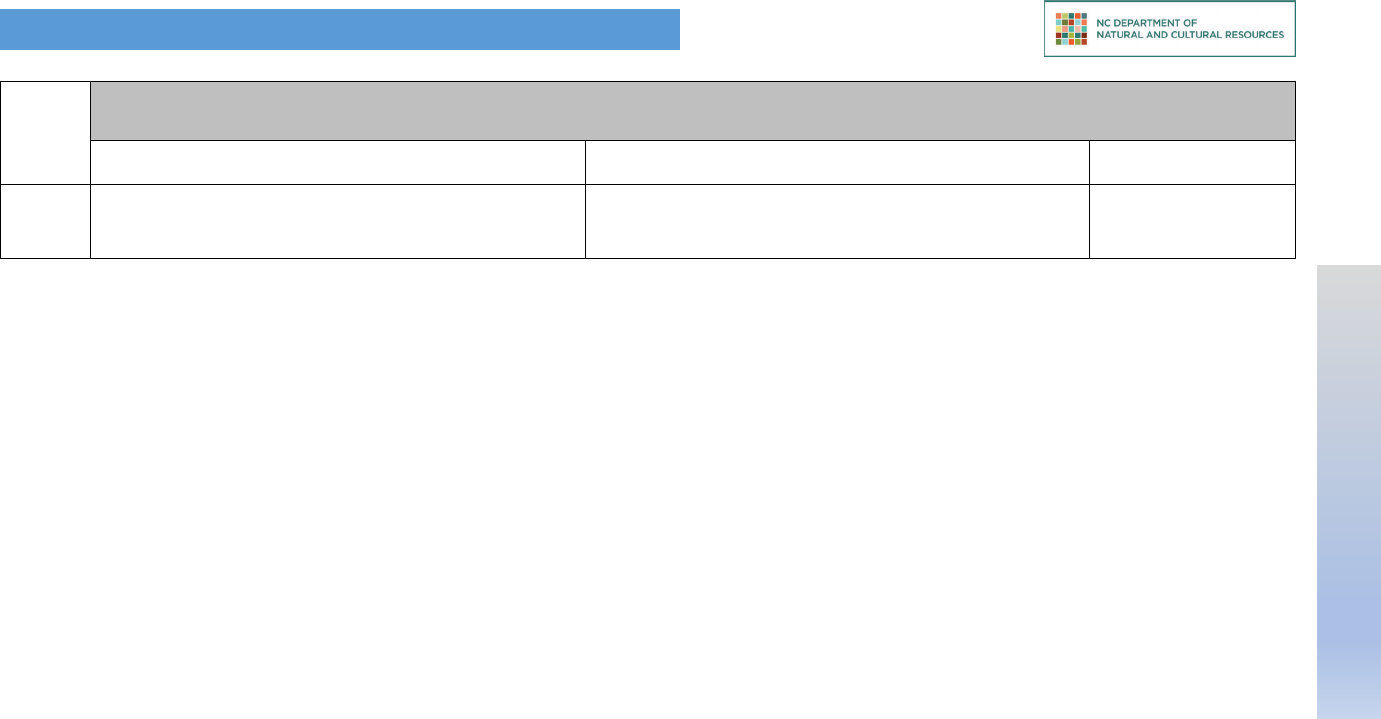
2021 PROGRAM RECORDS SCHEDULE: LOCAL GOVERNMENT AGENCIES
19: Streets, Public Works, and Engineering
* No destruction of records may take place if audits or litigation are pending or reasonably anticipated. See AUDITS, LITIGATION, AND OTHER OFFICIAL ACTION,
page A-5.
± The agency hereby agrees that it will establish and enforce internal policies setting minimum retention periods for the records that Natural and Cultural
Resources has scheduled with the disposition instruction “destroy when reference value ends.” Please use the space provided.
52
ITEM #
STANDARD 19: STREET MAINTENANCE, PUBLIC WORKS, AND ENGINEERING RECORDS
RECORDS SERIES TITLE DISPOSITION INSTRUCTIONS CITATION
19.17
TRAFFIC VIDEO RECORDINGS AND DATA
Recordings and other data used to monitor traffic levels.
Destroy in office after 30 days.*

20. Law Enforcement Records
2021 PROGRAM RECORDS SCHEDULE: LOCAL GOVERNMENT AGENCIES
* No destruction of records may take place if audits or litigation are pending or reasonably anticipated. See AUDITS, LITIGATION, AND OTHER OFFICIAL ACTION,
page A-5.
± The agency hereby agrees that it will establish and enforce internal policies setting minimum retention periods for the records that Natural and Cultural
Resources has scheduled with the disposition instruction “destroy when reference value ends.” Please use the space provided.
53
ITEM #
STANDARD 20: LAW ENFORCEMENT RECORDS
RECORDS SERIES TITLE DISPOSITION INSTRUCTIONS CITATION
20.01
ALARM CALL REPORTS
Reports completed by officers responding to alarm
calls. Includes listings of alarm type, time received,
time arrived, reason for activation, and other related
information. Includes forms completed by businesses
and residences naming emergency contacts, location
of safe, or other related information.
a) If records are made part of a case file, follow
disposition instructions for:
Case File: Felonies
Case File: Misdemeanors
b) Destroy in office after 30 days if not made part of a
case file.
20.02
ALTERNATIVE SENTENCING PROGRAMS
Records documenting alternative sentencing
programs. Includes work release and weekender
service.
Destroy in office 3 years after individual leaves program.
20.03
ARREST PROCESSING RECORDS
Records used to track a defendant’s time and activities
while in arrest processing. Includes time of arrival and
time to and from each workstation.
Destroy in office 1 year after date of arrest.*
Confidentiality:
G.S. 132-1.4
STANDARD 20: PROGRAM OPERATIONAL RECORDS - LAW ENFORCEMENT RECORDS (EXCLUDING SHERIFF’S OFFICES)
Records received and created by any local government law enforcement agency (excluding sheriff’s offices) necessary to meet all statutory requirements.
Comply with applicable provisions of G.S. §132-1.4 regarding confidentiality of law enforcement records and G.S. §153A-98 and G.S. §160A-168 regarding
confidentiality of personal information of law enforcement officers.
Please note: Records created by county sheriff’s offices fall under the purview of the Records Retention Schedule of County Sheriff’s Offices.

20. Law Enforcement Records
2021 PROGRAM RECORDS SCHEDULE: LOCAL GOVERNMENT AGENCIES
* No destruction of records may take place if audits or litigation are pending or reasonably anticipated. See AUDITS, LITIGATION, AND OTHER OFFICIAL ACTION,
page A-5.
± The agency hereby agrees that it will establish and enforce internal policies setting minimum retention periods for the records that Natural and Cultural
Resources has scheduled with the disposition instruction “destroy when reference value ends.” Please use the space provided.
54
ITEM #
STANDARD 20: LAW ENFORCEMENT RECORDS
RECORDS SERIES TITLE DISPOSITION INSTRUCTIONS CITATION
20.04
ARREST REPORTS
Reports concerning arrests made by officers.
a) If records are made part of a case file, follow
disposition instructions for:
Case File: Felonies
Case File: Misdemeanors
b) Destroy in office 5 years from date of arrest if report
is not made part of a case file.
Confidentiality:
G.S. 132-1.4
20.05
AUCTION RECORDS
Records concerning abandoned and unclaimed articles
or found property in possession of law enforcement
sold at public auction. May include auction receipts of
monies received for items sold.
Destroy in office after 3 years.*
20.06
CASE FILE: FELONIES
Includes investigative reports, complaint reports,
fingerprint cards, original arrest reports, copies of
warrants, special expenditure report, statements of
seized and returned property, interview sheets; case
status reports, photographs, court orders,
correspondence; officer’s notes, court dispositions,
audio or video recordings, and other related
records.
SEE ALSO: Electronic Recordings of Interrogations,
below.
a)
Destroy in office records concerning solved cases
20 years after disposition of case and exhaustion of
any appeals.*
b)
Retain in office records concerning unsolved cases
until solved, and then follow disposition
instructions in part (a).
Confidentiality:
G.S. 132-1.4

20. Law Enforcement Records
2021 PROGRAM RECORDS SCHEDULE: LOCAL GOVERNMENT AGENCIES
* No destruction of records may take place if audits or litigation are pending or reasonably anticipated. See AUDITS, LITIGATION, AND OTHER OFFICIAL ACTION,
page A-5.
± The agency hereby agrees that it will establish and enforce internal policies setting minimum retention periods for the records that Natural and Cultural
Resources has scheduled with the disposition instruction “destroy when reference value ends.” Please use the space provided.
55
ITEM #
STANDARD 20: LAW ENFORCEMENT RECORDS
RECORDS SERIES TITLE DISPOSITION INSTRUCTIONS CITATION
20.07
CASE FILE: MISDEMEANORS
Includes investigative reports, complaint reports,
fingerprint cards, original arrest reports, copies of
warrants, special expenditure reports, statements of
seized and returned property, interview sheets, case
status reports, photographs, court orders,
correspondence, officer’s notes, court dispositions,
audio or video recordings, and other related records.
a)
Destroy in office records concerning solved malicious
misdemeanor cases 3 years after disposition of case
and exhaustion of any appeals.*
b)
Retain in office records concerning unsolved malicious
misdemeanor cases until solved, and then follow
disposition instructions in part (a).
c)
Destroy in office records concerning all misdemeanor
cases not covered in (a) or (b) after 3 years.*
Confidentiality:
G.S. 132-1.4
20.08
COMMUNICATION RECORDS
Recordings, printouts, and logs of telephone, radio,
dispatch, 911 emergency calls or texts, and computer
aided dispatch (CAD) systems incoming and/or
outgoing communications. Includes time and date of
call, contents of call, location of call, name of unit sent
to scene, and other related information.
SEE ALSO: PROGRAM RECORDS SCHEDULE: LOCAL
GOVERNMENT AGENCIES, 911 Communication
Records and Recordings AND Dispatch Records and
Recordings.
a) If records are made part of a case file, follow
disposition instructions for:
Case File: Felonies
Case File: Misdemeanors
b) Destroy in office after 30 days if not made part of a
case file.
Confidentiality:
G.S. 132-1.4

20. Law Enforcement Records
2021 PROGRAM RECORDS SCHEDULE: LOCAL GOVERNMENT AGENCIES
* No destruction of records may take place if audits or litigation are pending or reasonably anticipated. See AUDITS, LITIGATION, AND OTHER OFFICIAL ACTION,
page A-5.
± The agency hereby agrees that it will establish and enforce internal policies setting minimum retention periods for the records that Natural and Cultural
Resources has scheduled with the disposition instruction “destroy when reference value ends.” Please use the space provided.
56
ITEM #
STANDARD 20: LAW ENFORCEMENT RECORDS
RECORDS SERIES TITLE DISPOSITION INSTRUCTIONS CITATION
20.09
COMPLAINTS
Records concerning complaints to which a unit
responded. Includes logs listing name and address of
victim, time, date, nature of complaint, responding
officer’s name, action taken, and other related
information.
a) If records are made part of a case file, follow
disposition instructions for:
Case File: Felonies
Case File: Misdemeanors
b) Destroy in office 3 years after resolution if not made
part of a case file.
Confidentiality:
G.S. 132-1.1(a)
20.10
COMPOSITE INTERVIEWS
Summaries of interviews used to determine the
physical description of suspects.
a) If records are made part of a case file, follow
disposition instructions for:
Case File: Felonies
Case File: Misdemeanors
b) Destroy in office when reference value ends if not
made part of case file.±
Agency Policy: Destroy in office after ___ __
20.11
CRIME ANALYSIS RECORDS
Records used to anticipate, prevent, or monitor
possible criminal activity. Includes crime reports,
photographs, complaints, copies of citations, criminal
profile information, and interoffice memoranda
generated or accumulated in connection with
investigations or directed patrols.
a) If records are made part of a case file, follow
disposition instructions for:
Case File: Felonies
Case File: Misdemeanors
b) Destroy in office when reference value ends if not
made part of case file.±
Agency Policy: Destroy in office after ___ __
Confidentiality:
G.S. 132-1.4
G.S. 132-1.7(a2)
Authority/
Confidentiality/
Retention
28 CFR 23.20

20. Law Enforcement Records
2021 PROGRAM RECORDS SCHEDULE: LOCAL GOVERNMENT AGENCIES
* No destruction of records may take place if audits or litigation are pending or reasonably anticipated. See AUDITS, LITIGATION, AND OTHER OFFICIAL ACTION,
page A-5.
± The agency hereby agrees that it will establish and enforce internal policies setting minimum retention periods for the records that Natural and Cultural
Resources has scheduled with the disposition instruction “destroy when reference value ends.” Please use the space provided.
57
ITEM #
STANDARD 20: LAW ENFORCEMENT RECORDS
RECORDS SERIES TITLE DISPOSITION INSTRUCTIONS CITATION
20.12
DETENTION FACILITY INCIDENT REPORTS
Detention facility incident reports. Include narratives
of incidents, lists of those involved, statements and
interview reports, inmates’ refusal of medical
treatment, inmates’ refusal to press charges, and other
related records.
SEE ALSO: GENERAL RECORDS SCHEDULE: LOCAL
GOVERNMENT AGENCIES, Litigation Case Records
(STANDARD 6: LEGAL RECORDS).
c) If records are made part of a case file, follow
disposition instructions for:
Case File: Felonies
Case File: Misdemeanors
d) Destroy in office after 3 years if not made part of a
case file.*
Confidentiality:
G.S. 132-1.1(a)
20.13
DETENTION FACILITY OPERATIONAL RECORDS
Records concerning all activities occurring during shifts
at detention facilities. Includes end of duty (shift
change reports, key and radio control lists, equipment
and inmate/non-inmate housing check lists, cell
inspection reports, laundry exchange and controlled
property lists, tour reports, etc.) and inmate
accountability (rosters, commitment and release
reports, cell locations, etc.) records.
a) If records are made part of a case file, follow
disposition instructions for:
Case File: Felonies
Case File: Misdemeanors
b) Destroy in office when reference value ends if not
made part of case file.±
Agency Policy: Destroy in office after ___ __
20.14
DETENTION FACILITY PHYSICAL FORCE RECORDS
Reports made by any officer or employee of a
detention facility who applies physical force to an
inmate or arrestee.
Destroy in office after 3 years.*

20. Law Enforcement Records
2021 PROGRAM RECORDS SCHEDULE: LOCAL GOVERNMENT AGENCIES
* No destruction of records may take place if audits or litigation are pending or reasonably anticipated. See AUDITS, LITIGATION, AND OTHER OFFICIAL ACTION,
page A-5.
± The agency hereby agrees that it will establish and enforce internal policies setting minimum retention periods for the records that Natural and Cultural
Resources has scheduled with the disposition instruction “destroy when reference value ends.” Please use the space provided.
58
ITEM #
STANDARD 20: LAW ENFORCEMENT RECORDS
RECORDS SERIES TITLE DISPOSITION INSTRUCTIONS CITATION
20.15
DIVISION OF CRIMINAL INFORMATION AND
NATIONAL CRIME INFORMATION CENTER (DCI-
NCIC) ENTRIES
Records and logs listing entries and inquiries made
against DCI-NCIC networks and concerning missing
persons, wanted persons, stolen vehicles or other
property, and other related topics.
Destroy in office 1 year after period covered by audit.*
Authority:
28 USC 534
20.16
DIVISION OF CRIMINAL INFORMATION AND
NATIONAL CRIME INFORMATION CENTER (DCI-
NCIC) VALIDATION RECORDS
Requests and proofs of verification for DCI-NCIC or
other law enforcement information networks.
Destroy in office after 1 year.*
Authority:
28 USC 534
20.17
DNA SAMPLING RECORDS
Records documenting the collection of DNA samples
from persons for qualifying offenses. Includes copies
of judgments. Original samples are forwarded to the
State Crime Lab.
a) If records are made part of a case file, follow
disposition instructions for:
Case File: Felonies
Case File: Misdemeanors
b) Destroy in office 1 year from date sample was
obtained if not made part of a case file.
Authority:
G.S. 15A-266.8

20. Law Enforcement Records
2021 PROGRAM RECORDS SCHEDULE: LOCAL GOVERNMENT AGENCIES
* No destruction of records may take place if audits or litigation are pending or reasonably anticipated. See AUDITS, LITIGATION, AND OTHER OFFICIAL ACTION,
page A-5.
± The agency hereby agrees that it will establish and enforce internal policies setting minimum retention periods for the records that Natural and Cultural
Resources has scheduled with the disposition instruction “destroy when reference value ends.” Please use the space provided.
59
ITEM #
STANDARD 20: LAW ENFORCEMENT RECORDS
RECORDS SERIES TITLE DISPOSITION INSTRUCTIONS CITATION
20.18
DOMESTIC VIOLENCE RECORDS
Restraining orders and related records.
a) If records are made part of a case file, follow
disposition instructions for:
Case File: Felonies
Case File: Misdemeanors
b) Destroy in office after expiration of restraining order
if not made part of a case file.
Confidentiality:
G.S. 132-1.4
20.19
DRUG AND ALCOHOL TESTING RECORDS
Records and reports generated when individuals
suspected of being under the influence of or impaired
by illegal drugs or alcohol are chemically tested.
Includes reports used for persons arrested for driving
while impaired by alcohol and/or drugs and
breathalyzer analysis reports.
SEE ALSO: Laboratory Case Records, below.
a) Transfer original Driving While Impaired (DWI) reports
to county Clerk of Superior Court’s office.
b) If records are made part of a case file, follow
disposition instructions for:
Case File: Felonies
Case File: Misdemeanors
c) Destroy in office when reference value ends if not
made part of case file.±
Agency Policy: Destroy in office after _ ______

20. Law Enforcement Records
2021 PROGRAM RECORDS SCHEDULE: LOCAL GOVERNMENT AGENCIES
* No destruction of records may take place if audits or litigation are pending or reasonably anticipated. See AUDITS, LITIGATION, AND OTHER OFFICIAL ACTION,
page A-5.
± The agency hereby agrees that it will establish and enforce internal policies setting minimum retention periods for the records that Natural and Cultural
Resources has scheduled with the disposition instruction “destroy when reference value ends.” Please use the space provided.
60
ITEM #
STANDARD 20: LAW ENFORCEMENT RECORDS
RECORDS SERIES TITLE DISPOSITION INSTRUCTIONS CITATION
20.20
ELECTRONIC RECORDINGS OF INTERROGATIONS
Electronic recordings generated by audio and/or video
recording devices of custodial interrogations in an
investigation of a juvenile or any person in a criminal
investigation.
a) If records are made part of a case file, follow
disposition instructions for:
Case File: Felonies
Case File: Misdemeanors
b) Destroy in office when reference value ends if
not made part of case file.±
Agency Policy: Destroy in office after _ ______
Authority:
G.S. 15A-211
Confidentiality:
G.S. 7B-3001(b)
G.S. 132-1.4A
20.21
FIELD OBSERVATIONS
Records concerning field observations of suspicious
persons or vehicles. Includes subject’s name, address,
and physical description; date, time, and location of
occurrence; reason for stop; name of officer
conducting interview; and other related information.
a) If records are made part of a case file, follow
disposition instructions for:
Case File: Felonies
Case File: Misdemeanors
b) Destroy in office when reference value ends if not
made part of case file.±
Agency Policy: Destroy in office after _ ______
Confidentiality:
G.S. 132-1.4

20. Law Enforcement Records
2021 PROGRAM RECORDS SCHEDULE: LOCAL GOVERNMENT AGENCIES
* No destruction of records may take place if audits or litigation are pending or reasonably anticipated. See AUDITS, LITIGATION, AND OTHER OFFICIAL ACTION,
page A-5.
± The agency hereby agrees that it will establish and enforce internal policies setting minimum retention periods for the records that Natural and Cultural
Resources has scheduled with the disposition instruction “destroy when reference value ends.” Please use the space provided.
61
ITEM #
STANDARD 20: LAW ENFORCEMENT RECORDS
RECORDS SERIES TITLE DISPOSITION INSTRUCTIONS CITATION
20.22
FINGERPRINT CARDS
Records used to verify a subject’s identity. Includes
fingerprints and all necessary information required to
identify an individual. Also includes records of latent
finger and palm prints that were found at the scene
of a crime without identification of suspects
Original fingerprint records are forwarded to the
State Bureau of Investigation.
SEE ALSO: Juvenile Case History Identification Records,
below.
a) If records are made part of a case file, follow
disposition instructions for:
Case File: Felonies
Case File: Misdemeanors
b) Destroy in office after 3 years if not made part of case
file.
Confidentiality:
G.S. 132-1.4
Authority:
G.S. 15A-502
20.23
FORCIBLE ENTRY RECORDS
Records concerning forcible entries made by law
enforcement personnel.
Destroy in office after 1 year.
20.24
FUGITIVE WARRANTS CASE RECORDS
Records concerning fugitive warrants sent to a
department from another jurisdiction requesting
assistance in finding an individual. Includes fugitive
profile and warrant.
Destroy in office when reference value ends.±
Agency Policy: Destroy in office after _ ______

20. Law Enforcement Records
2021 PROGRAM RECORDS SCHEDULE: LOCAL GOVERNMENT AGENCIES
* No destruction of records may take place if audits or litigation are pending or reasonably anticipated. See AUDITS, LITIGATION, AND OTHER OFFICIAL ACTION,
page A-5.
± The agency hereby agrees that it will establish and enforce internal policies setting minimum retention periods for the records that Natural and Cultural
Resources has scheduled with the disposition instruction “destroy when reference value ends.” Please use the space provided.
62
ITEM #
STANDARD 20: LAW ENFORCEMENT RECORDS
RECORDS SERIES TITLE DISPOSITION INSTRUCTIONS CITATION
20.25
IDENTIFICATION PHOTOGRAPHS
Photographs (mugshots) of persons arrested in
association with formal investigations. Also includes
driver’s license photos or negatives.
SEE ALSO: Juvenile Case History Identification Records,
below.
a) If records are made part of a case file, follow
disposition instructions for:
Case File: Felonies
Case File: Misdemeanors
b) Destroy in office after 3 years if not made part of
a case file.
Confidentiality:
G.S. 132-1.4
20.26
INCIDENT RESPONSE REPORTS
Reports completed by officers responding to
incidents. Includes victim, suspect, and witness
information; damaged and stolen property reports;
statement sheets; Miranda waiver forms; and other
related records.
a) If records are made part of a case file, follow
disposition instructions for:
Case File: Felonies
Case File: Misdemeanors
b) Destroy in office when reference value ends if not
made part of case file.±
Agency Policy: Destroy in office after _ __
Confidentiality:
G.S. 132-1.4
20.27
INMATE CLASSIFICATION RECORDS
Records concerning classification information
gathered by the detention facility while inmates are
incarcerated. Also includes incident reports,
behavioral or disciplinary reports, interviews,
classification level assigned, requested housing
moves, and other related records.
Destroy in office 3 years after inmate is released or
transferred from the facility.*

20. Law Enforcement Records
2021 PROGRAM RECORDS SCHEDULE: LOCAL GOVERNMENT AGENCIES
* No destruction of records may take place if audits or litigation are pending or reasonably anticipated. See AUDITS, LITIGATION, AND OTHER OFFICIAL ACTION,
page A-5.
± The agency hereby agrees that it will establish and enforce internal policies setting minimum retention periods for the records that Natural and Cultural
Resources has scheduled with the disposition instruction “destroy when reference value ends.” Please use the space provided.
63
ITEM #
STANDARD 20: LAW ENFORCEMENT RECORDS
RECORDS SERIES TITLE DISPOSITION INSTRUCTIONS CITATION
20.28
INMATE COMMITMENT RECORDS
Copies of judgment and commitment papers received
from the Clerk of Superior Court’s office used to
validate time spent incarcerated.
Destroy in office when reference value ends.±
Agency Policy: Destroy in office after _ ______
20.29
INMATE DEATH REPORTS
Reports filed by office upon the death of an inmate. A
report must be sent to the county health director and
N.C. Department of Health and Human Services, within
five days of the death.
Destroy in office after 3 years.*
Authority:
G.S. 153A-224(b)
20.30
INMATE FINANCIAL RECORDS
Records concerning individual inmate funds
maintained by a detention facility for use by the
inmate while incarcerated. Includes balance sheets
listing inmate’s name and number, amount of funds,
dates of deposits and withdrawals, and other related
information.
Destroy in office 3 years after inmate is released or
transferred from the facility.*

20. Law Enforcement Records
2021 PROGRAM RECORDS SCHEDULE: LOCAL GOVERNMENT AGENCIES
* No destruction of records may take place if audits or litigation are pending or reasonably anticipated. See AUDITS, LITIGATION, AND OTHER OFFICIAL ACTION,
page A-5.
± The agency hereby agrees that it will establish and enforce internal policies setting minimum retention periods for the records that Natural and Cultural
Resources has scheduled with the disposition instruction “destroy when reference value ends.” Please use the space provided.
64
ITEM #
STANDARD 20: LAW ENFORCEMENT RECORDS
RECORDS SERIES TITLE DISPOSITION INSTRUCTIONS CITATION
20.31
INMATE GRIEVANCE RECORDS
Records concerning grievances filed by inmates and
actions taken.
a) If legal action is taken and case adjudicated, destroy in
office 5 years after final disposition.
b) If legal action is taken and case non-adjudicated (out-
of-court claims), destroy in office 5 years after final
disposition or expiration of relevant statute of
limitations.
c) Destroy remaining records in office 3 years after
inmate is released or transferred from the facility.*
Confidentiality:
G.S. 132-1.1(a)
20.32
INMATE MAIL, TELEPHONE, OR VISITOR RECORDS
Records concerning telephone calls and mail sent and
received by inmates and individuals visiting inmates
confined in county or municipal detention facilities.
Includes logs listing inmate’s name, date and time of
call or mail, visitor’s signature and address, and other
related information.
Destroy in office after 1 year.*
20.33
INMATE MEAL RECORDS
Records concerning the planning and scheduling of
inmate meals. Includes food service daily shift reports,
daily meal sheets, food order forms, kitchen checklists,
lists of inmates receiving meals and other related
records. File also includes records concerning requests
for special diets made by inmates.
Destroy in office after 3 years.*
Retention:
10A NCAC 14J .1723

20. Law Enforcement Records
2021 PROGRAM RECORDS SCHEDULE: LOCAL GOVERNMENT AGENCIES
* No destruction of records may take place if audits or litigation are pending or reasonably anticipated. See AUDITS, LITIGATION, AND OTHER OFFICIAL ACTION,
page A-5.
± The agency hereby agrees that it will establish and enforce internal policies setting minimum retention periods for the records that Natural and Cultural
Resources has scheduled with the disposition instruction “destroy when reference value ends.” Please use the space provided.
65
ITEM #
STANDARD 20: LAW ENFORCEMENT RECORDS
RECORDS SERIES TITLE DISPOSITION INSTRUCTIONS CITATION
20.34
INMATE MEDICAL RECORDS
Records concerning medical examinations, diagnoses,
and treatments of inmates. Includes medical
information sheets and screening forms, medical
histories as provided by inmate, receipt and/or release
forms for medications and medical articles, laboratory
and x-ray reports, blood pressure records, sick bay
transfer forms, special diet authorizations,
psychological evaluation forms, suicide watch sheets,
progress notes, health assessment forms, dental
forms, doctors’ orders, transportation records to
outside clinics or hospitals, and other related records.
May also include authorization records for release of
medical information to detention facility staff,
informed consent forms, refusal of treatment forms,
and release of financial responsibility forms.
SEE ALSO: Juvenile Detention Records, below.
Destroy in office 10 years after inmate’s release or parole.
Confidentiality:
G.S. 8-53
45 CFR 164.502
20.35
INMATE PERSONAL IDENTIFICATION RECORDS
Records concerning changes to be made to an inmate’s
incarceration file. Includes personal identification
changes, superior court calendar, long form dismissals
and other related records.
Destroy in office 30 days after receipt.*

20. Law Enforcement Records
2021 PROGRAM RECORDS SCHEDULE: LOCAL GOVERNMENT AGENCIES
* No destruction of records may take place if audits or litigation are pending or reasonably anticipated. See AUDITS, LITIGATION, AND OTHER OFFICIAL ACTION,
page A-5.
± The agency hereby agrees that it will establish and enforce internal policies setting minimum retention periods for the records that Natural and Cultural
Resources has scheduled with the disposition instruction “destroy when reference value ends.” Please use the space provided.
66
ITEM #
STANDARD 20: LAW ENFORCEMENT RECORDS
RECORDS SERIES TITLE DISPOSITION INSTRUCTIONS CITATION
20.36
INMATE RESEARCH REQUESTS
Requests filed by inmates seeking use of a facility’s law
library or similar collection containing research
materials.
Destroy in office 1 year from date of request.
20.37
JUVENILE CASE FILES
Includes incident and arrest reports, detention orders,
disposition instructions, name and address of person
having legal and/or physical custody of child,
correspondence with county, municipal, or state
juvenile services, and other related records.
a) Destroy in office records when juvenile reaches 21
years of age if adjudicated for an offense that would
have been a Class A, B1, B2, C, D, or E felony if
committed by an adult.
b) Destroy in office records related to all other cases
when juvenile reaches 18 years of age.
Confidentiality:
G.S. 7B-3001(b)
Retention:
20.38
JUVENILE CASE HISTORY IDENTIFICATION RECORDS
Includes fingerprints and photographs.
a)
Transfer to the State Bureau of Investigation and
Federal Bureau of Investigation.
b)
Destroy in office agency copies when reference
value ends.*±
Agency Policy: Destroy in office after _ ____
Confidentiality/
Retention:
G.S. 7B-2102
20.39
JUVENILE DETENTION RECORDS
Records concerning medical and non-medical
information gathered on juvenile inmates held in
county or municipal detention facilities.
a)
Destroy in office medical records when juvenile
reaches 30 years of age.
b)
Destroy in office non-medical records when juvenile
reaches 18 years of age.
Confidentiality:
G.S. 7B-3001(b)

20. Law Enforcement Records
2021 PROGRAM RECORDS SCHEDULE: LOCAL GOVERNMENT AGENCIES
* No destruction of records may take place if audits or litigation are pending or reasonably anticipated. See AUDITS, LITIGATION, AND OTHER OFFICIAL ACTION,
page A-5.
± The agency hereby agrees that it will establish and enforce internal policies setting minimum retention periods for the records that Natural and Cultural
Resources has scheduled with the disposition instruction “destroy when reference value ends.” Please use the space provided.
67
ITEM #
STANDARD 20: LAW ENFORCEMENT RECORDS
RECORDS SERIES TITLE DISPOSITION INSTRUCTIONS CITATION
20.40
LABORATORY CASE RECORDS
Records concerning cases examined in a crime
laboratory; includes reports, notes, charts, and other
related records
Retain in office permanently.
Confidentiality:
G.S. 132-1.4
20.41
LAW ENFORCEMENT AUDIO AND VIDEO RECORDINGS
Tapes and digital recordings generated by mobile
and fixed audio and video recording devices.
Does not include Electronic Recordings of
Interrogations, above.
a) If records are made part of a case file, follow
disposition instructions for:
Case File: Felonies
Case File: Misdemeanors
b) Destroy in office after 30 days if not made part of a
case file.
Confidentiality:
G.S. 132-1.4A
G.S. 153A-98
20.42
MULTIPLE FIREARMS SALES REPORTS
Reports received from dealers reporting the sale of
multiple firearms.
Destroy in office when reference value ends, but within 20
days after receipt.±
Agency Policy: Destroy in office after _ ____
Retention:
18 USC 923(g)(3)(b)
20.43
MULTIPLE FIREARMS SALES REPORTS
DESTRUCTION RECORDS
Records submitted after 6 months to the U.S. Attorney
General’s Office certifying that all multiple firearm
sales reports received from dealers have been
destroyed.
Destroy in office after 1 year.
Authority:
18 USC 923(g)(3)(b)

20. Law Enforcement Records
2021 PROGRAM RECORDS SCHEDULE: LOCAL GOVERNMENT AGENCIES
* No destruction of records may take place if audits or litigation are pending or reasonably anticipated. See AUDITS, LITIGATION, AND OTHER OFFICIAL ACTION,
page A-5.
± The agency hereby agrees that it will establish and enforce internal policies setting minimum retention periods for the records that Natural and Cultural
Resources has scheduled with the disposition instruction “destroy when reference value ends.” Please use the space provided.
68
ITEM #
STANDARD 20: LAW ENFORCEMENT RECORDS
RECORDS SERIES TITLE DISPOSITION INSTRUCTIONS CITATION
20.44
ORDINANCE VIOLATIONS CITATIONS
Citations issued for violations of municipal and
county ordinances.
Destroy in office after 3 years.*
20.45
PAWNSHOP RECORDS
Pawnshop cards and property records submitted to
municipal and county law enforcement offices.
a) If records are made part of a case file, follow
disposition instructions for:
Case File: Felonies
Case File: Misdemeanors
b) Destroy in office after 1 year if not made part of a case
file.
Authority:
G.S. 66-391
20.46
PERMISSION TO SEARCH RECORDS
Authorizations for officers to search property, and if
necessary, confiscate property deemed pertinent to an
investigation.
a) If records are made part of a case file, follow
disposition instructions for:
Case File: Felonies
Case File: Misdemeanors
b) Destroy in office when reference value ends if not
made part of a case file.±
Agency Policy: Destroy in office after _ _____

20. Law Enforcement Records
2021 PROGRAM RECORDS SCHEDULE: LOCAL GOVERNMENT AGENCIES
* No destruction of records may take place if audits or litigation are pending or reasonably anticipated. See AUDITS, LITIGATION, AND OTHER OFFICIAL ACTION,
page A-5.
± The agency hereby agrees that it will establish and enforce internal policies setting minimum retention periods for the records that Natural and Cultural
Resources has scheduled with the disposition instruction “destroy when reference value ends.” Please use the space provided.
69
ITEM #
STANDARD 20: LAW ENFORCEMENT RECORDS
RECORDS SERIES TITLE DISPOSITION INSTRUCTIONS CITATION
20.47
PERMITS: CONCEALED WEAPONS AND HANDGUNS
Applications and supporting documentation filed to
carry concealed weapons or purchase handguns.
Includes background checks and other related records.
a)
Destroy in office all approved applications after 5
years.
b)
Destroy in office denied applications and related
records 5 years from date of denial or resolution of
petition filed with district court, whichever is longer.
c)
Destroy in office background checks and related
records concerning approved applications when
permit is issued.
Authority/
Confidentiality:
G.S. 14-415.17
G.S. 132-1.4
G.S. 132-1.7
20.48
PRISON RAPE ELIMINATION ACT (PREA) FILE
Allegation, investigation, and incident review records
documenting investigations into allegations of sexual
abuse or sexual harassment.
Destroy in office 6 years after inmate's release.*
Retention Note: If a minor is involved in the incident,
records should be retained until the minor reaches age 30.
Authority:
28 CFR Part 115
20.49
PRISON RAPE ELIMINATION ACT (PREA) DATA FILE
Aggregated data for every allegation of sexual abuse at
county or municipal lockups.
Destroy in office after 10 years.
Authority/Retention:
28 CFR Part 115.187
28 CFR 115.189(d)
20.50
PRISONER TRANSPORT RECORD
Verification forms completed by receiving party of
prisoner patient.
Destroy in office after 1 year.

20. Law Enforcement Records
2021 PROGRAM RECORDS SCHEDULE: LOCAL GOVERNMENT AGENCIES
* No destruction of records may take place if audits or litigation are pending or reasonably anticipated. See AUDITS, LITIGATION, AND OTHER OFFICIAL ACTION,
page A-5.
± The agency hereby agrees that it will establish and enforce internal policies setting minimum retention periods for the records that Natural and Cultural
Resources has scheduled with the disposition instruction “destroy when reference value ends.” Please use the space provided.
70
ITEM #
STANDARD 20: LAW ENFORCEMENT RECORDS
RECORDS SERIES TITLE DISPOSITION INSTRUCTIONS CITATION
20.51
PROPERTY RECORDS
Records concerning confiscated property, evidence,
stolen or recovered property, and unclaimed property.
Includes descriptions of property and its value, serial
numbers, and other related records. Records may also
be filed with original incident report.
Destroy in office 3 years after final disposition of property.
20.52
PURSUIT LOGS
Logs concerning pursuits by law enforcement
personnel.
a) If records are made part of a case file, follow
disposition instructions for:
Case File: Felonies
Case File: Misdemeanors
b) Destroy in office after 3 years if not made part of a
case file.
20.53
RIDE-ALONG PROGRAM RECORDS
Records concerning a law enforcement ride-along
program.
Destroy in office after 3 years.*
20.54
SEXUAL OFFENDER RECORDS
Records concerning sexual offenders living within
jurisdiction.
a)
Destroy in office records of persons registered in the
“Sexually Violent Predator Program” when individual is
known dead or after 90 years.
b)
Destroy in office records of persons registered in
the “Sex Offender and Public Protection Program”
after court petition and review by the state; or after
30 years or length of court order, whichever is
greater; or when individual is known dead.
Authority:
G.S. 14-208
Retention:
G.S. 14-208.6A

20. Law Enforcement Records
2021 PROGRAM RECORDS SCHEDULE: LOCAL GOVERNMENT AGENCIES
* No destruction of records may take place if audits or litigation are pending or reasonably anticipated. See AUDITS, LITIGATION, AND OTHER OFFICIAL ACTION,
page A-5.
± The agency hereby agrees that it will establish and enforce internal policies setting minimum retention periods for the records that Natural and Cultural
Resources has scheduled with the disposition instruction “destroy when reference value ends.” Please use the space provided.
71
ITEM #
STANDARD 20: LAW ENFORCEMENT RECORDS
RECORDS SERIES TITLE DISPOSITION INSTRUCTIONS CITATION
20.55
TRAFFIC ACCIDENT REPORTS
Records concerning traffic accidents. Includes general
correspondence, property receipts, collision reports,
waivers signed by involved parties agreeing to settle
damages among themselves, and other related
records.
a)
Transfer original collision report to the N.C.
Division of Motor Vehicles within 10 days of
accident.
b)
Destroy in office after 3 years records concerning
accidents not meeting N.C. Division of Motor Vehicles
reporting requirements, but for which a report was
made.
c)
Destroy in office duplicate reports when reference
value ends.±
Agency Policy: Destroy in office after ______
Confidentiality:
18 USC 2721
20.56
TRAFFIC CITATIONS AND WARNINGS
Citations issued to drivers violating motor vehicle and
traffic laws. Includes voided citations and warnings
that do not require a fine or court appearance.
a) Transfer original citations to county Clerk of Superior
Court’s office.
b) If records are made part of a case file, follow
disposition instructions for:
Case FIle: Felonies
Case File: Misdemeanors
c) Destroy remaining records in office after 1 year.

20. Law Enforcement Records
2021 PROGRAM RECORDS SCHEDULE: LOCAL GOVERNMENT AGENCIES
* No destruction of records may take place if audits or litigation are pending or reasonably anticipated. See AUDITS, LITIGATION, AND OTHER OFFICIAL ACTION,
page A-5.
± The agency hereby agrees that it will establish and enforce internal policies setting minimum retention periods for the records that Natural and Cultural
Resources has scheduled with the disposition instruction “destroy when reference value ends.” Please use the space provided.
72
ITEM #
STANDARD 20: LAW ENFORCEMENT RECORDS
RECORDS SERIES TITLE DISPOSITION INSTRUCTIONS CITATION
20.57
TRESPASS RECORDS
Authorizations by property owners, lessees, or
managers for law enforcement officers to take action
deemed appropriate to remove unauthorized persons
and issue trespass warnings.
a) If records are made part of a case file, follow
disposition instructions for:
Case File: Felonies
Case File: Misdemeanors
b) Destroy in office 1 year after expiration if not made
part of a case file.
Authority:
G.S. 14-159.12-13
20.58
VEHICLE TOWING RECORDS
Includes recovery authorizations and consent forms
completed by owners to have vehicle towed, removed,
stored, or left at the scene.
a) If records are made part of a case file, follow
disposition instructions for:
Case File: Felonies
Case File: Misdemeanors
b) Destroy in office after 1 year if not made part of a case
file.

21. Tax Records (Municipal)
2021 PROGRAM RECORDS SCHEDULE: LOCAL GOVERNMENT AGENCIES
* No destruction of records may take place if audits or litigation are pending or reasonably anticipated. See AUDITS, LITIGATION, AND OTHER OFFICIAL ACTION,
page A-5.
± The agency hereby agrees that it will establish and enforce internal policies setting minimum retention periods for the records that Natural and Cultural
Resources has scheduled with the disposition instruction “destroy when reference value ends.” Please use the space provided.
73
ITEM #
STANDARD 21: TAX RECORDS
RECORDS SERIES TITLE DISPOSITION INSTRUCTIONS CITATION
21.01
ANIMAL LICENSING RECORDS
Records concerning the licensing of dogs, cats, and other
animals by the municipality. Includes owner and animal
information and record of fees paid.
Destroy in office after 3 years.*
Authority:
G.S. 160A-212
Confidentiality:
G.S. 105-259
G.S. 132-1.1(b)
G.S. 132-1.2
G.S. 160A-208.1
21.02
BEER AND WINE TAXES AND RECORDS
Records concerning the levy of privilege taxes on beer
and wine.
Destroy in office after 3 years.*
Authority:
G.S. 105-133.77-79
21.03
BICYCLE LICENSE PLATE RECORDS
Records concerning issuance of license plates for bicycles.
Destroy in office after 1 year.*
Confidentiality:
G.S. 105-259
G.S. 132-1.1(b)
G.S. 132-1.2
G.S. 160A-208.1
STANDARD 21: PROGRAM OPERATIONAL RECORDS - TAX RECORDS (FOR MUNICIPALITIES)
Records received and created by a municipality for the purposes of collecting taxes. For County Tax Administration records, please refer to the separate
County Tax Administration Program Schedule.

21. Tax Records (Municipal)
2021 PROGRAM RECORDS SCHEDULE: LOCAL GOVERNMENT AGENCIES
* No destruction of records may take place if audits or litigation are pending or reasonably anticipated. See AUDITS, LITIGATION, AND OTHER OFFICIAL ACTION,
page A-5.
± The agency hereby agrees that it will establish and enforce internal policies setting minimum retention periods for the records that Natural and Cultural
Resources has scheduled with the disposition instruction “destroy when reference value ends.” Please use the space provided.
74
ITEM #
STANDARD 21: TAX RECORDS
RECORDS SERIES TITLE DISPOSITION INSTRUCTIONS CITATION
21.04
DELINQUENT TAXPAYER RECORDS
Records concerning taxpayers who have not paid real and
personal property taxes due, including unpaid notices.
SEE ALSO: Delinquent Taxpayer Records: Advertisement
of Tax Liens Against Real Property, below.
Destroy in office after 10 years or 3 years after final
settlement or 1 year after released by governing board,
whichever comes first.*
21.05
DELINQUENT TAXPAYER RECORDS: ADVERTISEMENT OF
TAX LIENS AGAINST REAL PROPERTY
Records concerning the municipal taxation officer’s
publication in the newspaper of delinquent taxpayer and
tax sales notices.
SEE ALSO: Delinquent Taxpayer Records, above.
Destroy in office after 10 years.*
Authority:
G.S. 105-369
21.06
MOTOR VEHICLE RENTAL TAX RECORDS
Records concerning motor vehicle rental tax assessments.
Destroy in office after 3 years.*
21.07
MUNICIPAL VEHICLE TAX RECORDS
Records concerning municipal vehicle taxes levied
annually.
Destroy in office after 3 years.*
Authority:
G.S. 20-97(b)
21.08
PREPARED FOOD AND BEVERAGE TAX RECORDS
Records concerning prepared food and beverage tax
assessments.
Destroy in office after 3 years.*

21. Tax Records (Municipal)
2021 PROGRAM RECORDS SCHEDULE: LOCAL GOVERNMENT AGENCIES
* No destruction of records may take place if audits or litigation are pending or reasonably anticipated. See AUDITS, LITIGATION, AND OTHER OFFICIAL ACTION,
page A-5.
± The agency hereby agrees that it will establish and enforce internal policies setting minimum retention periods for the records that Natural and Cultural
Resources has scheduled with the disposition instruction “destroy when reference value ends.” Please use the space provided.
75
ITEM #
STANDARD 21: TAX RECORDS
RECORDS SERIES TITLE DISPOSITION INSTRUCTIONS CITATION
21.09
PRIVILEGE LICENSES, TAXES, AND FEE RECORDS
Records concerning the licensing of occupations,
businesses, trades, professions, and forms of amusement
or entertainment and associated fees and taxes.
SEE ALSO: Animal Licensing Records (above), Beer and
Wine Taxes and Records (above), Municipal Vehicle Tax
Records (above), Taxicab and Limousine Tax Records
(below).
Destroy in office after 3 years.*
Authority:
G.S. 160A-194
21.10
ROOM OCCUPANCY TAX RECORDS
Records concerning the administration of room
occupancy tax records for those municipalities who have
adopted room occupancy taxes.
Destroy in office after 3 years.*
Authority:
G.S. 160A-215
Confidentiality:
G.S. 105-259
G.S. 132-1.1(b)
G.S. 132-1.2
G.S. 160A-208.1

21. Tax Records (Municipal)
2021 PROGRAM RECORDS SCHEDULE: LOCAL GOVERNMENT AGENCIES
* No destruction of records may take place if audits or litigation are pending or reasonably anticipated. See AUDITS, LITIGATION, AND OTHER OFFICIAL ACTION,
page A-5.
± The agency hereby agrees that it will establish and enforce internal policies setting minimum retention periods for the records that Natural and Cultural
Resources has scheduled with the disposition instruction “destroy when reference value ends.” Please use the space provided.
76
ITEM #
STANDARD 21: TAX RECORDS
RECORDS SERIES TITLE DISPOSITION INSTRUCTIONS CITATION
21.11
SCHEDULE “B” LICENSES
Receipts of licenses issued by municipality in accordance
with Article 2, Schedule B of the Revenue Laws of North
Carolina. Applies to privilege licenses issued to attorneys-
at-law and other professionals, installment paper dealers,
and pawnbrokers.
a) Destroy in office 3 years after close of license tax year
stubs or detailed settlement records.
b) Destroy in office stubs 1 years after audit if
settlement records are kept.
Authority:
G.S. 105-41
G.S. 105-83
G.S. 105-88
G.S. 153A-152
G.S. 160A-211
Confidentiality:
G.S. 105-259
G.S. 132-1.1(b)
G.S. 132-1.2
G.S. 160A-208.1
21.12
TAX ABSTRACTS AND LISTS
Records concerning real and personal property in the
municipality, based on assessment lists. Includes name
and address of taxpayer along with descriptions of
property owned and estimated value.
Destroy in office after 10 years or two revaluation cycles.
Authority:
G.S. 105-309
G.S. 105-296
21.13
TAX EXEMPT PROPERTY FILE
Records concerning property that is exempt from
taxation.
Destroy in office 5 years after property exemption has
expired or at end of life of structure, whichever comes
first.
21.14
TAX LEDGER CARDS OR SHEETS
Destroy in office 5 years after superseded or obsolete.

21. Tax Records (Municipal)
2021 PROGRAM RECORDS SCHEDULE: LOCAL GOVERNMENT AGENCIES
* No destruction of records may take place if audits or litigation are pending or reasonably anticipated. See AUDITS, LITIGATION, AND OTHER OFFICIAL ACTION,
page A-5.
± The agency hereby agrees that it will establish and enforce internal policies setting minimum retention periods for the records that Natural and Cultural
Resources has scheduled with the disposition instruction “destroy when reference value ends.” Please use the space provided.
77
ITEM #
STANDARD 21: TAX RECORDS
RECORDS SERIES TITLE DISPOSITION INSTRUCTIONS CITATION
21.15
TAX LEVY/SEIZURE RECORDS
Inventory of property taken from property owner by the
municipal tax collector to pay back taxes.
a) Destroy in office after 3 years execution forms if levy
and sale of personal property is made. If levy and sale
are conducted by municipal law enforcement agency,
execution forms are to be retained by that agency.
b) If levy, seizure, and sale are not made, destroy in
office forms when reference value ends.±
Agency Policy: Destroy in office after ______________
Authority:
G.S. 105-366
G.S. 105-367
21.16
TAX LIEN SALES
Records concerning sales held to satisfy tax liens.
Destroy in office 10 years after sale.
21.17
TAX REBATES
Records concerning tax rebates given or received.
Destroy in office after 10 years.
21.18
TAX SCROLLS
Records indicating property (real estate and personal)
valuation and taxes due.
Destroy in office after 10 years.
21.19
TAXICAB AND LIMOUSINE TAX RECORDS
Records concerning the levy of privilege taxes on taxicabs
and limousines.
Destroy in office after 3 years.*
Authority:
G.S. 20-97(d)

A-1
MANAGING PUBLIC RECORDS IN NORTH CAROLINA
Q. What is this “records retention and disposition schedule”?
A. This document is a tool for the employees of local government agencies across North Carolina to
use when managing the records in their offices. It lists records commonly found in agency
offices and gives an assessment of their value by indicating how long those records should be
retained. This schedule is also an agreement between your agency and the State Archives of
North Carolina.
This schedule serves as the inventory and schedule that the State Archives of North Carolina is
directed by N.C. Gen. Stat. § 121-5(c) and N.C. Gen. Stat. § 132-8 to provide. It supersedes all
previous editions, including all amendments.
Q. How do I get this schedule approved?
A. This schedule must be approved by your governing body for use in your agency. That approval
should be made in a regular meeting and recorded as an action in the minutes. It may be done
as part of the consent agenda, by resolution, or other action
.
Q. Am I required to have all the records listed on this schedule?
A. No, this is not a list of records you must have in your office.
Q. What is “reference value”?
A. Items containing “reference value” in the disposition instructions are generally records that hold
limited value, which is typically restricted to those documenting routine operations within the
office. A minimum retention period should be established by the office for any items containing
the phrase “destroy in office when reference value ends” in the disposition instructions.
Q. Do the standards correspond to the organizational structure of my agency?
A. Records series are grouped into standards to make it easier for users to locate records and their
disposition instructions. You may find that the groupings reflect the organizational structure of
your agency, or you may find that records are located in various standards depending on the
content of the record. The intent of the schedule’s organization is to provide an easy reference
guide for the records created in your agency.
Q. What if I cannot find some of my records on this schedule?
A. Sometimes the records are listed in a different standard than how you organize them in your
office. Be sure to check the Index and utilize the search function on the PDF version of the
schedule to facilitate the location of records series. If you still cannot locate your records on the
schedule, contact a Records Management Analyst. We will work with you to amend this records
schedule so that you may destroy records appropriately. The Request for Change in Records
Schedule form (see page A-17) can be used for such requests.
Q. What are public records?
A. The General Statutes of North Carolina, Chapter 132, provides this definition of public records:
“Public record” or “public records” shall mean all documents, papers, letters, maps, books,
photographs, films, sound recordings, magnetic or other tapes, electronic data-processing
records, artifacts, or other documentary material, regardless of physical form or

A-2
characteristics, made or received pursuant to law or ordinance in connection with the
transaction of public business by any
agency of North Carolina government or its
subdivisions. Agency of North Carolina government or its subdivisions shall mean and
include every public office, public officer or official (state or local, elected or appointed),
institution, board, commission, bureau, council, department, authority or other unit of
government of the state or of any county, unit, special district or other political subdivision
of government.
Q. Is any person allowed to see my records?
A. Yes, except as restricted by specific provisions in state or federal law. N.C. Gen. Stat. § 132-6
instructs:
“Every custodian of public records shall permit any record in the custodian’s custody to be
inspected and examined at reasonable times and under reasonable supervision by any
person, and shall, as promptly as possible, furnish copies thereof upon payment of any fees
as may be prescribed by law. … No person requesting to inspect and examine public records,
or to obtain copies thereof, shall be required to disclose the purpose or motive for the
request.”
Q. What about my confidential records?
A. Not all government records are open to public inspection. Exceptions to the access
requirements in N.C. Gen. Stat. § 132-6 and the definition of public records in N.C. Gen. Stat. §
132-1 are found throughout the General Statutes. You must be able to cite a specific provision
in the General Statutes or federal law when you restrict or deny access to a particular record.
Q. Am I required to make available to the public copies of drafts that have not
been approved?
A. Yes, even if a report, permit, or other record has not been finalized, it is still a public record
subject to request. Any record that is not confidential by law must be provided when a request
is received, whether it is “finished” or not.
Q. What do I do with permanent records?
A. Permanent records should be maintained in the office that created the records, forever.
The Department of Natural and Cultural Resources (DNCR) is charged by the General Assembly
with the administration of a records management program (N.C. Gen. Stat. § 121-4 (2) and §
132-8.1) and the maintenance of “a program for the selection and preservation of public records
considered essential to the operation of government and to the protection of the rights and
interests of persons” (§ 132-8.2). Permanent records with these characteristics require
preservation duplicates that are human-readable (paper or microfilm). Some examples of these
characteristics include:
Affect multiple people, without regard to relation
Have significance over a long span of time
Document governance
Document citizenship
Examples of records with these characteristics:
Minutes of governing bodies at the state and local levels are the basic evidence of our system
of governance, and are routinely provided for the public to read.

A-3
Records, such as deeds and tax scrolls, about land document changes in ownership and
condition. Counties maintain offices expressly for the purpose of making those records
available to the public. Other records in local and state governments document potential
public health hazards, such as hazardous materials spills.
Adoptions, marriages, and divorces document changes in familial relationships and document
citizenship. Though adoptions are confidential (not available for public inspection), they
document citizenship and changes in inheritance and familial succession.
Court records, such as wills, estates, and capital cases, affect people within and across family
groups, are made available for public inspection, and often involve transactions related to
the examples above.
See the Human-Readable Preservation Duplicates policy issued by the North Carolina
Department of Natural and Cultural Resources (
https://archives.ncdcr.gov/government/digital-
records/digital-records-policies-and-guidelines/human-readable-preservation) and check with a
records analyst to determine whether your permanent records require a preservation duplicate.
Q. What is historical value?
A. Historical records document significant events, actions, decisions, conditions, relationships, and
similar developments. These records have administrative, legal, fiscal, or evidential importance
for the government or its citizens. Two criteria for determining historical value are inherent
interest and extraordinary documentation:
• Inherent interest is created by non-routine events, by the involvement of famous parties, and
by compelling contexts. For instance, foreclosure proceedings from the 1930s have high
historical value because they date from the era of the Great Depression.
• Extraordinary documentation is found in records that shed light on political, public, or social
history. For instance, the records from the replevin case that returned the Bill of Rights to
North Carolina hold more historical value than most property case files because of the political
history intertwined with this case.
SANC has further elaborated selection criteria that help distinguish records with historical value:
• Do they protect the rights and property of citizens?
• Do they have a long-term impact on citizens?
• Do they document the core functions of an agency?
• Do they document high-level decision-making that shapes an agency’s policies or initiatives?
• Do they summarize an agency’s activities?
Call a Records Management Analyst for further assistance in assessing historical value.
Q. What if I do not have any records?
A. Nearly every position in government generates, receives, or uses records. Computer files of any
kind, including drafts and e-mail, are public records. Even if your records are not the official or
final version, your records are public records. Not all records have high historical, legal, or fiscal
value, but they all must be destroyed in accordance with the provisions of the appropriate
records schedule.

A-4
Q. I have a lot of unsorted records. What’s a good first step for getting a
handle on these records?
A. We encourage you to create a file plan of what records you have. When you create this plan,
you can match each record to its placement on this schedule or on the appropriate retention
schedule. A sample file plan is available on Page A-21. Having a file plan can help you strategize
how to best organize your physical or digital records. A file plan is also useful in disaster
planning and scheduling destructions.
Q. May I store our unused records in the basement, attic, shed, etc.?
A. Public records are public property. Though we encourage agencies to find places to store
records that do not take up too much valuable office space, the selected space should be dry,
secure, and free from pests and mold. Your office must ensure that records stored away from
your main office area are well protected from natural and man-made problems while remaining
readily available to your staff and the public.
Q. Our old records are stored in the attic, basement, or off-site building, etc.
Are we required to provide public access to these records?
A. Yes, as long as the records are not confidential by law. You should also be aware that
confidentiality can expire.
Q. Aren’t all our old records at the State Archives of North Carolina?
A. Probably not. The State Archives of North Carolina collects only very specific types of records
from local government offices. Contact a Records Management Analyst for more information
about which records are held or can be transferred to the State Archives of North Carolina for
permanent preservation.
Q. I found some really old records. What should I do with them?
A. Call a Records Management Analyst. We will help you examine the records and assess their
historical value.
Q. Can I give my old records to the historical society or public library?
A. Before you offer any record to a historical society, public library, or any other entity, you must
contact a Records Management Analyst. Permanent records must be kept either in your offices
or at the State Archives of North Carolina.
Q. Whom can I call with questions?
A. If you are located west of Statesville, call our Western Office in Asheville at (828) 250-3103. If
you are east of Statesville, all the way to the coast, call our Raleigh office at (919) 814-6900.

A-5
AUDITS, LITIGATION, AND OTHER OFFICIAL ACTION
Q. Why is there an asterisk in the disposition instructions of so many items on
this schedule?
A. No record involved in a pending or ongoing audit, legal, or other official action may be
destroyed before that audit or action is resolved.
A legal hold or litigation hold means that records that are the subject of the legal hold or
litigation hold must be preserved and thus must not be destroyed until officially released from
the hold. A legal hold or litigation hold is placed when either an official discovery order is served
on the agency requesting the production of the records in question (for a litigation, regulatory
investigation, audit, open records request, etc.) or litigation is pending and the agency is thus on
notice to preserve all potentially relevant records. You must also ensure that for a claim or
litigation that appears to be reasonably foreseeable or anticipated but not yet initiated, any
records (in paper or electronic formats) relevant to such a claim or litigation are preserved and
not destroyed until released by your General Counsel. The records in question must not be
destroyed until the completion of the action and the resolution of all issues that arise from it
regardless of the retention period set forth in this schedule.
We have used an asterisk (*) in the disposition instructions to mark records series that are
commonly audited, litigated, or may be subject to other official actions. However, any record
has this potential. Records custodians are responsible for being aware of potential actions, and
for preventing the destruction of any record that is, or may be reasonably expected to become,
involved in an audit, legal, or other official action.
Records used during routine audits may be destroyed when the governing body accepts the
audit, if the records have completed the retention period listed in this schedule. If time remains
in the retention period, the records must be maintained for the remainder of the period. The
auditor’s working papers must be kept according to the schedule. (See also GENERAL RECORDS
SCHEDULE: LOCAL GOVERNMENT AGENCIES, Audits: Performance, STANDARD 1:
ADMINISTRATION AND MANAGEMENT RECORDS, Audits: Financial, STANDARD 2: BUDGET,
FISCAL, AND PAYROLL RECORDS.) Should a dispute arise over an audit, the records that were
audited should be retained until that dispute is resolved.
The attorney representing the agency should inform records custodians when legal matters are
concluded and records will no longer be needed. Following the conclusion of any legal action,
the records may be destroyed if they have met the retention period in the schedule. Otherwise,
they should be kept for the remaining time period.

A-6
TRANSITORY RECORDS
Transitory records are defined as “record[s] that [have] little or no documentary or evidential value and
that need not be set aside for future use.”
3
According to North Carolina General Statutes § 121 and § 132, every document, paper, letter, map,
book, photograph, film, sound recording, magnetic or other tape, electronic data processing record,
artifact, or other documentary material, regardless of physical form or characteristics, made or received
in connection with the transaction of public business by any state, county, municipal agency, or other
political subdivision of government is considered a public record and may not be disposed of, erased, or
destroyed without specific approval from the Department of Natural and Cultural Resources.
The Department of Natural and Cultural Resources recognizes that some records may have little or no
long-term documentary or evidential value to the creating agency. These records are often called
“transitory records.” The following questions and answers discuss types of transitory records commonly
created in state government. They may be disposed of according to the guidance below. However, all
public employees should be familiar with the General Records Schedule for Local Government Agencies,
their office’s Program Records Retention and Disposition Schedule, and any other applicable guidelines
for their office. If any of these documents require a different retention period for these records, follow
the longer of the two retention periods. When in doubt about whether a record is transitory, or
whether it has special significance or importance, retain the record in question and seek guidance from
the analyst assigned to your agency.
Q. What do I do with routing slips, fax cover sheets, “while you were out”
slips, memory aids, etc.?
A. Routing slips and transmittal sheets adding no information to that contained in the transmitted
material have minimal value after the material has been successfully transmitted. These records
may be destroyed or otherwise disposed of after receipt of the material has been confirmed.
Similarly, “while you were out” slips, memory aids, and other records requesting follow-up
actions (including voicemails) have minimal value once the official action these records are
supporting has been completed and documented. Unless they are listed on the General
Records Schedule for Local Government Agencies or your office’s Program Records
Retention and Disposition Schedule, these records may be destroyed or otherwise disposed
of once the action has been resolved.
Q. What about research materials, drafts, and other working papers used to
create a final, official record?
A. Drafts and working papers are materials, including notes and calculations, gathered or created
to assist in the creation of another record. All drafts and working papers are public records
subject to all provisions of General Statute § 132, but many of them have minimal value after
the final version of the record has been approved, and may be destroyed after final approval, if
they are no longer necessary to support the analysis or conclusions of the official record. Drafts
and working documents which may be destroyed after final approval include:
• Drafts and working papers for internal and external policies
3
Society of American Archivists, Dictionary of Archives Terminology.

A-7
• Drafts and working papers for internal administrative reports, such as daily and
monthly activity reports
• Drafts and working papers for internal, non-policy-level documents, such as informal
workflows and manuals; and
• Drafts and working papers for presentations, workshops, and other explanations of
agency policy that are already formally documented.
Q. What if I have forms designed and used solely to create, update, or modify
records in an electronic medium?
A. If these records are not required for audit or legal purposes, they may be destroyed in office
after completion of data entry and after all verification and quality control
procedures. However, if the forms contain any analog components that are necessary to
validate the information contained on them (e.g. a signature or notary’s seal), they should be
retained according to the disposition instructions for the records series encompassing the forms’
function.
See also the State Archives of North Carolina’s guidance on digital signatures found at:
https://archives.ncdcr.gov/government/digital-records/digital-records-policies-and-
guidelines/digital-signature-policy

A-8
DESTRUCTION OF PUBLIC RECORDS
Q. When can I destroy records?
A. Each records series listed on this schedule has specific disposition instructions that indicate how
long the series must be kept in your office. In some cases, the disposition instructions are
“Retain in office permanently,” which means that those records must be kept in your offices
forever.
Q. How do I destroy records?
A. After your agency has approved this records retention and disposition schedule, records should
be destroyed in one of the following ways:
1) burned, unless prohibited by local ordinance;
2) shredded, or torn so as to destroy the record content of the documents or material
concerned;
3) placed in acid vats so as to reduce the paper to pulp and to terminate the existence of the
documents or materials concerned;
4) sold as waste paper, provided that the purchaser agrees in writing that the documents or
materials concerned will not be resold without pulverizing or shredding the documents so
that the information contained within cannot be practicably read or reconstructed.
The provision that electronic records are to be destroyed means that the data, metadata,
and physical media are to be overwritten, deleted, and unlinked so that the data and
metadata may not be practicably reconstructed.
The data, metadata, and physical media containing confidential records of any format are to
be destroyed in such a manner that the information cannot be read or reconstructed under
any means.
— N.C. Administrative Code, Title 7, Chapter 4, Subchapter M, Section .0510
Without your agency’s approval of this records schedule, no records may legally be destroyed.
Q. How can I destroy records if they are not listed on this schedule?
A. Contact a Records Management Analyst. An analyst will discuss the nature of the records with
you to determine if the records have historical value. If the records do have historical value, we
will discuss the possibility of transferring the records to the State Archives of North Carolina to
be preserved permanently.
If the records do not have historical value, we will ask you to complete a
Request for Disposal
for Unscheduled Records form if the records are no longer being created. If the records are an
active records series, an analyst will help you develop an amendment to this schedule so that
you can destroy the records appropriately from this point forward.

A-9
Q. Am I required to tell anyone about the destructions?
A. We recommend that you report on your records retention activities to your governing board on
an annual basis. This report does not need to be detailed, but it is important that significant
destructions be entered into the minutes of the Board. See a sample destructions log that
follows (and is available online at the State Archives of North Carolina website,
https://archives.ncdcr.gov/government/rm-tools
).
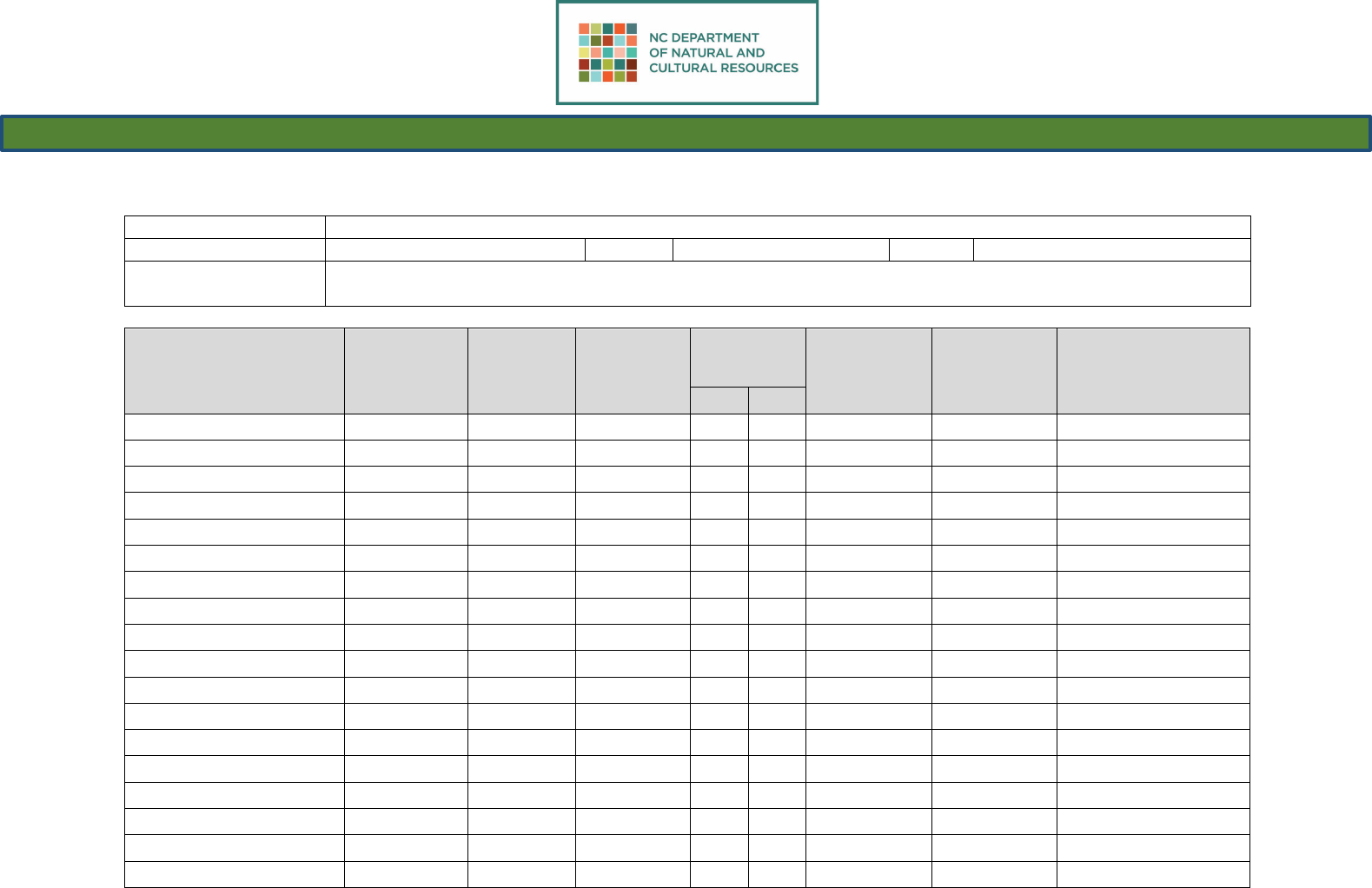
A-10
archives.ncdcr.gov 4615 Mail Service Center, Raleigh NC 27699-4165 919-814-6900
Destructions Log
County/Municipality
Division
Section
Branch
Location(s) of
Records
Records Series
Required
Retention
Date
Range
Volume
(file drawers
or MB)
Media
(Paper,
Electronic)
Date of
Destruction
Method of
Destruction
Authorization for
Destruction
P
E

A-11
ELECTRONIC RECORDS:
E-MAIL, BORN-DIGITAL RECORDS, AND DIGITAL IMAGING
Q. When can I delete my e-mail?
A. E-mail is a public record as defined by N.C. Gen. Stat. § 121-5 and N.C. Gen. Stat. § 132.
Electronic mail is as much a record as any paper record and must be treated in the same
manner. It is the content of each message that is important. If a particular message would
have been filed as a paper memo, it should still be filed (either in your e-mail program or in your
regular directory structure), and it should be retained the same length of time as its paper
counterparts. It is inappropriate to destroy e-mail simply because storage limits have been
reached. Some examples of e-mail messages that are public records and therefore covered by
this policy include:
• Policies or directives;
• Final drafts of reports and recommendations;
• Correspondence and memoranda related to official business;
• Work schedules and assignments;
• Meeting agendas or minutes
• Any document or message that initiates, facilitates, authorizes, or completes a business
transaction; and
• Messages that create a precedent, such as issuing instructions and advice.
From the Department of Cultural Resources E-Mail Policy (Revised July 2009),
available at the State Archives of North Carolina website
Other publications (available online at the State Archives of North Carolina website
) that will be
particularly helpful in managing your e-mail include tutorials on managing e-mail as a public
record and on using Microsoft Exchange.
Q. May I print my e-mail to file it?
A. We do not recommend printing e-mail for preservation purposes. Important metadata are lost
when e-mail is printed.
Q. I use my personal e-mail account for work. No one can see my personal e-
mail, right?
A. The best practice is to avoid using personal resources, including private e-mail accounts, for
public business. N.C. Gen. Stat. § 132-1 states that records “made or received pursuant to law
or ordinance in connection with the transaction of public business by any agency of North
Carolina government or its subdivisions” are public records (emphasis added). The fact that
public records reside in a personal e-mail account is irrelevant.

A-12
Q. We have an imaging system. Are we required to keep the paper?
A. You may scan any record, but you will need to receive approval from the Government Records
Section in order to destroy paper originals that have been digitized. Your agency must develop
an electronic records policy and then submit a Request for Disposal of Original Records
Duplicated by Electronic Means. You can find these templates in the Digital Imaging section of
the State Archives of North Carolina website (
https://archives.ncdcr.gov/government/digital-
records/digital-records-policies-and-guidelines#digital-imaging). Contact a Records
Management Analyst for further instructions on how to develop a compliant electronic records
policy.
Permanent records must have a security preservation copy as defined by State Archives of
North Carolina’s Human-Readable Preservation Duplicate Policy
(N.C. Gen. Stat. § 132-8.2):
Preservation duplicates shall be durable, accurate, complete and clear, and such
duplicates made by a photographic, photo static, microfilm, micro card, miniature
photographic, or other process which accurately reproduces and forms a durable
medium for so reproducing the original shall have the same force and effect for all
purposes as the original record whether the original record is in existence or not. ...
Such preservation duplicates shall be preserved in the place and manner of
safekeeping prescribed by the Department of Natural and Cultural Resources.
The preservation duplicate of permanent records must be either on paper or microfilm.
Non-permanent records may be retained in any format. You will need to take precautions with
electronic records that you must keep more than about 5 years. Computer systems do not have
long life cycles. Each time you change computer systems, you must convert all records to the
new system so that you can assure their preservation and provide access.
Q. Computer storage is cheap. Can I just keep my computer records
permanently?
A. The best practice is to destroy all records that have met their retention requirements, regardless
of format.
Q. What are the guidelines regarding the creation and handling of electronic
public records, including text messages and social media?
A. There are numerous documents available on the State Archives of North Carolina website
(https://archives.ncdcr.gov/government/digital-records/digital-records-policies-and-guidelines
).
Topics covered include shared storage, cloud computing, e-discovery, trustworthy digital public
records, digital signatures, e-mail, social media, text messages, websites, digital imaging,
metadata, file formats, database indexing, and security backups.
Note that e-mail, text messages, and social media should be handled according to their content.
Therefore, this schedule does not include a records series that instructs you on how to handle
one of these born-digital records by format; instead of focusing on how the information is
disseminated, consider what content is contained in the e-mail, text message, or social media
post. For instance, an e-mail requesting leave that is sent to a supervisor should be kept for 3
years. On the General Records Schedule: Local Government Agencies, see Leave Records
(Standard 4: HUMAN RESOURCES RECORDS).

A-13
GEOSPATIAL RECORDS
Q. Why should geographic information system (GIS) datasets be retained and
preserved?
A. Geospatial records are public records and need to be retained and preserved based on their
legal, fiscal, evidential and/or historical value according to an established retention schedule.
Local agencies involved in GIS operations should work with the State Archives of North Carolina
in order to appraise, inventory, and preserve their geospatial records according to established
best practices and standards to insure both their short- and long-term accessibility.
Due to the complexity and transitory nature of these records, geospatial records retention and
long-term preservation is a community-wide challenge. GIS files have become essential to the
function of many local agencies and will continue to frequently be utilized in agency decision-
making processes in the near and far future. Accessibility of GIS records over time has legal,
fiscal, practical, and historical implications. The availability of GIS records can help safeguard
the local government’s legal and fiscal accountability and aid agencies in conducting
retrospective and prospective studies. These studies are only possible when essential data from
the past are still available.
Q. What GIS datasets should be preserved by local governments?
A. The following types of geospatial records have been designated as having archival value:
• Parcel data
• Street centerline data
• Corporate limits data
• Extraterritorial jurisdiction data
• Zoning data, address points
• Orthophotography (imagery)
• Utilities
• Emergency/E-911 themes
For more information, see GENERAL RECORDS SCHEDULE: LOCAL GOVERNMENT AGENCIES,
STANDARD 3: GEOGRAPHIC INFORMATION SYSTEM (GIS) RECORDS.
Q. How often should we capture the datasets retained for their legal, fiscal,
evidential or historical value?
A. Consult the retention schedule for frequency of capture. The frequency of capture is based on
the significance of the record as well as its alterability.

A-14
Q. What data formats, compression formats, and media should be used to
preserve the data?
A. Archiving practices should be consistent with North Carolina Geographic Information
Coordinating Council (GICC) approved standards and recommendations. (Examples: Content
Standards for Metadata; Data Sharing Recommendations). Consult the GICC website at
https://it.nc.gov/about/boards-commissions/gicc
.
You should also comply with guidelines and standards issued by the State Archives of North
Carolina, which are available on its website.
Q. Who should be responsible for creation and long-term storage of
archived data?
A. The creating agency, NCOneMap, and the State Archives of North Carolina may all have
responsibility for archiving data. If you choose to upload your data to NCOneMap, consult with
your county’s GIS department to determine whether data will be uploaded by your agency or
by the whole county. If you choose not to upload your data to NCOneMap, your agency must
comply with standards (for metadata, file naming, data sharing, and long term preservation)
and procedures adopted by the North Carolina Geographic Information Coordinating Council.

A-15
SECURITY PRESERVATION COPIES OF RECORDS
Q. What is the advantage to having security preservation copies of records
stored with the State Archives?
A. Having duplicate copies of essential records in a separate location mitigates the risk that you
may lose the only physical copy of a given record in a disaster or other records loss event.
Maintaining offsite duplicates of records, regardless of format, is a good practice to adopt.
The State Archives creates duplicate copies on microfilm because of the durability of the
medium. Silver negative microfilm does not decay for hundreds of years, ensuring that your
records maintain their integrity over time.
Q. What records will the State Archives back up for us?
A. The State Archives provides security imaging services for minutes of major decision-making
boards and commissions. We will also image records of adoptions for Social Services agencies as
well as maps and plats from Registers of Deeds offices. Once those records are imaged, they are
converted to security microfilm. We will store the silver negative (original) microfilm in our
security vault. Contact the Records Management Analyst in charge of imaging coordination for
the most current information.
Q. How do I start the process of backing up the above listed records?
A. We have three processes for creating backup film copies of these records. First, you can send
photocopies of your approved minutes to us in the mail. Simply include a copy of the
Certification of the Preparation of Records for Security Preservation Copy form (available
online at the State Archives of North Carolina website
) with each shipment. For more detailed
instructions, contact a Records Management Analyst.
Secondly, you can bring us your original books. We will film them and return them to you. This
process is most useful when you have more minutes to film than you are willing to photocopy.
It is important to remember that a representative of your office or ours must transport the
original books in person so that the custody of the records is maintained. You should not mail or
ship your original minutes. Contact the Records Management Analyst in charge of imaging
coordination to schedule an appointment for your books to be imaged. We will make every
effort to expedite the filming so that your books will be returned to you as quickly as possible.
Finally, you can submit these records to the State Archives electronically. Please see our
procedures in “Transfer of Minutes in Digital Formats for Microfilming
” or contact the Records
Management Analyst in charge of imaging coordination for more information.
Q. In the event of a records loss, how do I obtain copies of the security
preservation copies stored at the State Archives?
A. Contact the Records Management Analyst in charge of imaging coordination who will help you
purchase copies of the microfilm from our office. You can then send those reels to a vendor
who can either make new printed books or scan the film to create a digital copy.
A-16
__________________________________________________________________________________________
Q. Can I obtain digital copies of the security preservation records?
A. Yes, you can request digital copies of records when you submit them to the State Archives for
initial reproduction. Contact the Records Management Analyst in charge of imaging
coordination to initiate a request for digital duplicates.

A-17
DISASTER ASSISTANCE
Q. What should I do in case of fire or flood?
A. Secure the area, and keep everyone out until fire or other safety professionals allow entry.
Then, call our Raleigh office at (919) 814-6903 for the Head of the Government Records Section
or (919) 814-6849 for the Head of the Collections Management Branch. If you’re in the western
part of the state, call our Asheville Office at (828) 250-3103. On nights and weekends, call your
local emergency management office.
DO NOT ATTEMPT TO MOVE OR CLEAN ANY RECORDS.
Damaged records are extremely fragile and require careful handling. Our staff are trained in
preliminary recovery techniques, documenting damage to your records, and authorizing
destruction of damaged records. Professional vendors can handle larger disasters.
Q. What help do you give in case of an emergency?
A. We will do everything we can to visit you at the earliest opportunity in order to provide hands-
on assistance. We can assist you in appraising the records that have been damaged so that
precious resources (and especially time) are not spent on records with lesser value. We can
provide lists of professional recovery vendors that you can contact to preserve your essential
and permanent records.
Q. What can I do to prepare for an emergency?
A. We provide training on disaster preparation that includes a discussion of the roles of proper
inventories, staff training, and advance contracts with recovery vendors. If you would like to
have this workshop presented, call a Records Management Analyst.
Q. What are essential records?
A. Essential records are records that are necessary for continuity of operations in the event of a
disaster. There are two common categories of records that are considered essential:
• Emergency operating records – including emergency plans and directives,
orders of succession, delegations of authority, staffing assignments,
selected program records needed to continue the most critical agency
operations, as well as related policy or procedural records.
• Legal and financial rights records – these protect the legal and financial
rights of the Government and of the individuals directly affected by its
activities. Examples include accounts receivable records, Social Security
records, payroll records, retirement records, and insurance records. These
records were formerly defined as “rights-and-interests” records.
Essential records should be stored in safe, secure locations as well as
duplicated and stored off-site, if possible.

A-18
STAFF TRAINING
Q. What types of workshops or training do you offer?
A. We have a group of prepared workshops that we can offer at any time at various locations
throughout the state. Contact a Records Management Analyst if you are interested in having
one of the workshops presented to your agency. We will work with you directly to develop
training suited to your specific needs. Our basic workshops are:
• Managing public records in North Carolina
• Disaster preparedness and recovery
• Digital communications
Q. Will you design a workshop especially for our office?
A. Yes, we will. Let a Records Management Analyst know what type of training you need.
Q. Are workshops offered only in Raleigh?
A. No, we will come to your offices to present the workshops you need. We have no minimum
audience requirement. We will also do presentations for professional associations, regional
consortiums, and the public.
To arrange a workshop, please call the State Records Center at 919-814-6900 or contact a
Records Management Analyst (https://archives.ncdcr.gov/government/local/analysts
).
Q. Is there a fee for workshops?
A. Not at this time.
Q. Are the workshops available in an online format?
A. We can offer a virtual workshop for your agency upon request. For descriptions of available
webinars, see https://archives.ncdcr.gov/government/training/webinars
. You can also find
several online tutorials available on the State Archives of North Carolina website
(
https://archives.ncdcr.gov/government/training/online-tutorials-and-resources).

A-19
archives.ncdcr.gov 4615 Mail Service Center, Raleigh NC 27699-4165 919-814-6900
GOVERNMENT RECORDS SECTION
STATE RECORDS CENTER
Request for Change in Local Government Records Schedule
Use this form to request a change in the records retention and disposition schedule governing the records of
your agency. Submit the signed original and keep a copy for your file. A proposed amendment will be prepared
and submitted to the appropriate state and local officials for their approval and signature. Copies of the signed
amendment will be sent to you for insertion in your copy of the schedule.
AGENCY INFORMATION
Requestor name
Location and Agency [e.g., County/Municipality + Department of Social Services]
Phone and e-mail
Mailing Address
CHANGE REQUESTED
Specify title and edition of records retention schedule being used: _______________________________
Add a new item
Delete an existing item Standard Number Page Item Number
Change a retention period Standard Number Page Item Number
Title of Records Series in Schedule or Proposed Title:
Inclusive Dates of Records: Proposed Retention Period:
Description of Records:
Justification for Change:
Requested by:
Signature
Title
Date
Approved by:
Signature
Requestor’s Supervisor
Date

A-20
archives.ncdcr.gov 4615 Mail Service Center, Raleigh NC 27699-4165 919-814-6900
GOVERNMENT RECORDS SECTION
STATE RECORDS CENTER
Request for Disposal of Unscheduled Records
AGENCY INFORMATION
Requestor name
Location and Agency [e.g., County/Municipality + Department of Social Services]
Phone and e-mail
Mailing Address
In accordance with the provisions of N.C. GEN. STAT. § 121 and § 132, approval is requested for the
destruction of records listed below. These records have no further use or value for official administrative, fiscal,
historical, or legal purposes.
R
ECORDS
T
ITLE
AND DESCRIPTION
I
NCLUSIVE
DATES
Q
UANTITY
R
ELEVANT
STATUTORY
REGULATIONS
P
ROPOSED
RETENTION
PERIOD
Requested by:
Signature
Title
Date
Approved by:
Signature
Requestor’s Supervisor
Date
Concurred by:
Signature
Assistant Records Administrator
State Archives of North Carolina
Date
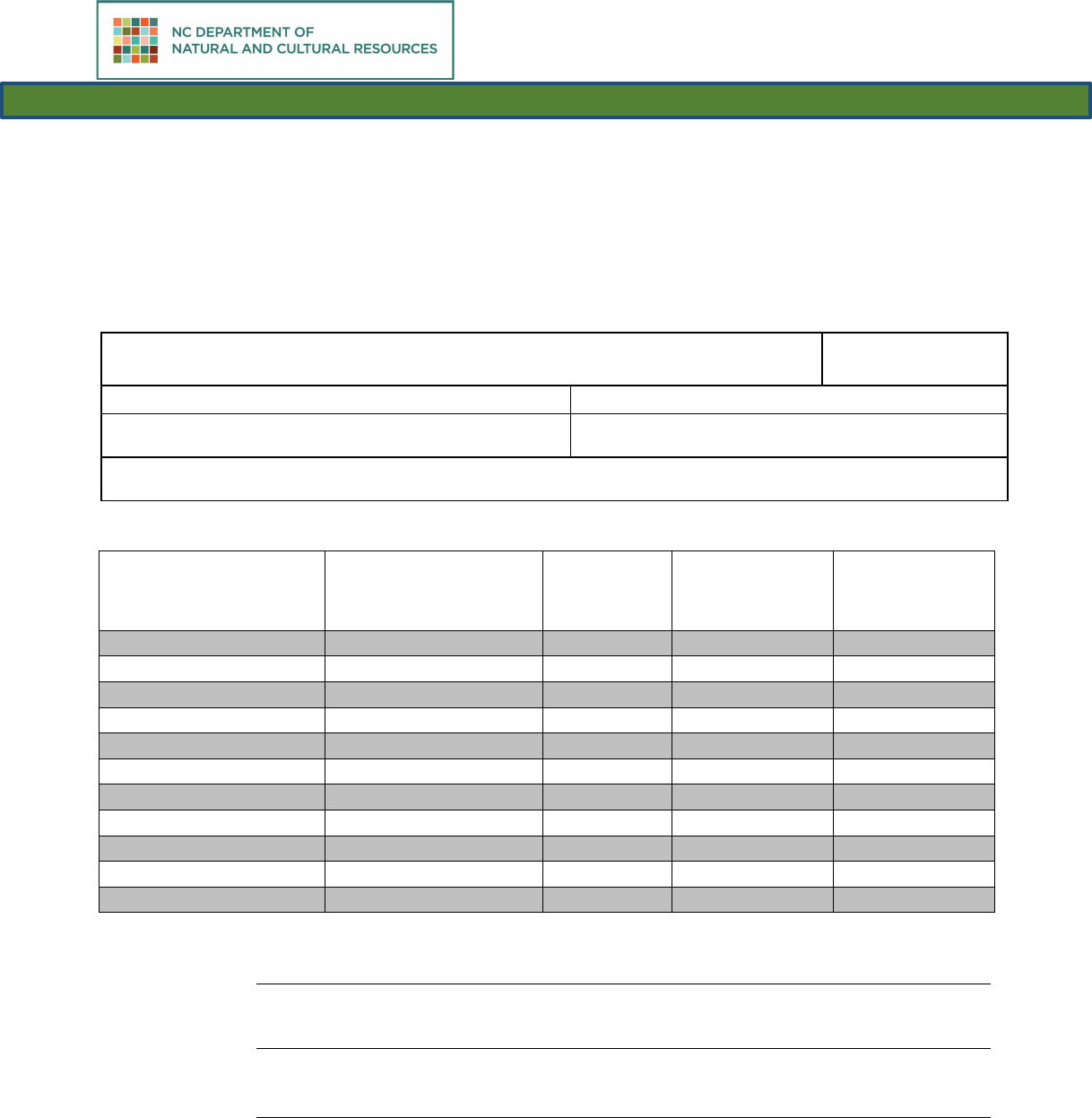
A-21
archives.ncdcr.gov 4615 Mail Service Center, Raleigh NC 27699-4165 919-814-6900
GOVERNMENT RECORDS SECTION
STATE RECORDS CENTER
Request for Disposal of Original Records Duplicated by Electronic Means
If you have questions, call (919) 814-6900 and ask for a Records Management Analyst.
This form is used to request approval from the Department of Natural and Cultural Resources to dispose of non-permanent
paper records that have been scanned, entered into databases, or otherwise duplicated through digital imaging or other
conversion to a digital environment. This form does not apply to records that have been microfilmed or photocopied or to
records with a permanent retention.
Agency Contact Name:
Date (MM-DD-YYYY):
Phone (area code):
E-mail:
County/Municipality:
Office:
Mailing address:
Records Series Title
A group of records as listed
in records retention
schedule
Description of Records
Specific records as referred
to in-office
Inclusive
Dates
(1987-1989;
2005-present)
Approx. Volume
of Records
(e.g. “1 file
cabinet,” “5 boxes”)
Retention
Period
As listed in records
retention schedule
Requested by:
Signature
Title
Date
Approved by:
Signature
Requestor’s Supervisor
Date
Concurred by:
Signature
Assistant Records Administrator
State Archives of North Carolina
Date
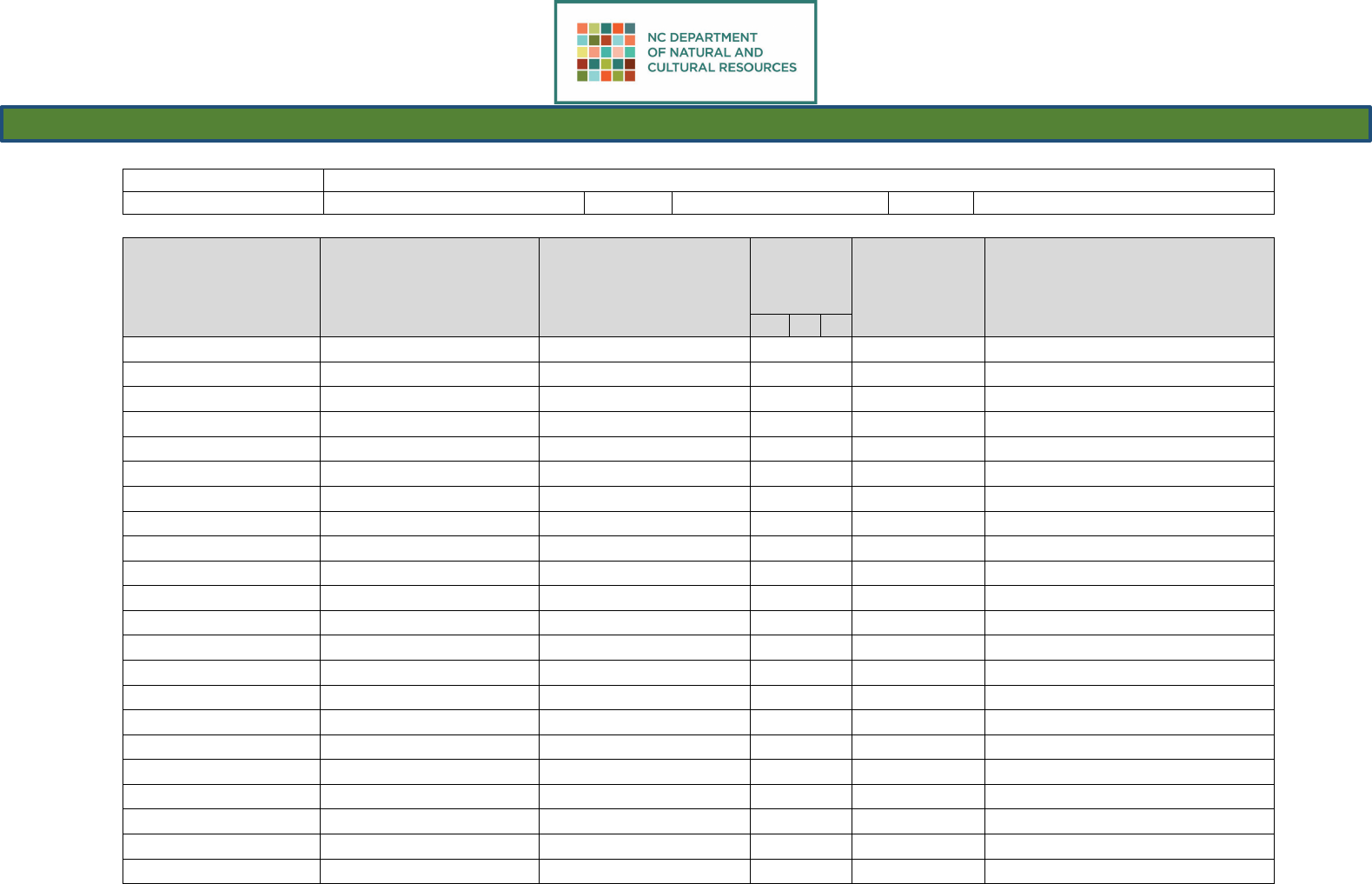
A-22
archives.ncdcr.gov 4615 Mail Service Center, Raleigh NC 27699-4165 919-814-6900
File Plan
County/Municipality
Division
Section
Branch
Records Series Records Creator
Records Owner
(if record copy is
transferred within the
agency)
Media
(Paper,
Electronic,
Scanned)
Required
Retention
Location(s) of Records
P
E
S
A-23
INDEX
911 COMMUNICATION RECORDS AND RECORDINGS, 12
ADMISSION RECORDS, 16
AFFIRMATIVE ACTION FILE (AIRPORT), 1
AIR POLLUTION SOURCE INFORMATION, 5
AIR SPACE CONSTRUCTION FILES, 1
AIRFIELD INSPECTION FILES, 1
AIRPORT ACCESS CONTROL RECORDS, 1
AIRPORT MASTER RECORD FILES, 1
ALARM CALL REPORTS, 53
ALTERNATIVE SENTENCING PROGRAMS, 53
AMBULANCE CALL REPORTS, 12
AMERICANS WITH DISABILITIES ACT (ADA) PARATRANSIT
RECORDS, 31
AMERICANS WITH DISABILITIES ACT (ADA) PARATRANSIT
VOUCHERS, 31
AMERICANS WITH DISABILITIES ACT (ADA) PRE-TRIP
INSPECTION FORMS, 31
ANIMAL ABUSE AND CRUELTY RECORDS, 3
ANIMAL COMPLAINT RECORDS, 3
ANIMAL CONTROL RECORDS, 3
ANIMAL LICENSING RECORDS (ANIMAL SERVICES), 4
ANIMAL LICENSING RECORDS (TAX), 73
ANIMAL SHELTER RECORDS, 4
APPRAISAL PROJECT FILE (PUBLIC HOUSING), 25
APPRAISAL REPORTS (STREET MAINTENANCE, PUBLIC
WORKS, AND ENGINEERING), 46
ARREST PROCESSING TRACKING RECORDS, 53
ARREST REPORTS, 54
ART-IN-TRANSIT APPLICATIONS, 32
AUCTION RECORDS, 54
AUDIO AND VIDEO RECORDINGS (LAW ENFORCEMENT), 67
BEER AND WINE TAXES AND RECORDS, 73
BICYCLE LICENSE PLATE RECORDS, 73
BLUEPRINTS AND SPECIFICATIONS, 5
BOARD OF ADJUSTMENT CASE FILE, 19
BUILDING AND FIRE SAFETY SYSTEM PLANS, 13
BUILDING AND ROAD PERMITTING AND INSPECTION
RECORDS, 6
CASE FILE - FELONIES, 54
CASE FILE - MISDEMEANORS, 55
CEMETERY DEEDS, 46
CEMETERY INTERMENT RECORDS, 46
CERTIFICATES OF APPROPRIATENESS, 20
CERTIFICATION FILE. See Redevelopment Plans
CHEMICAL ANALYSIS RECORDS. See DRUG AND ALCOHOL
TESTING RECORDS
CITATIONS RECORDS, 16
COMMUNICATION RECORDS (LAW ENFORCEMENT), 55
COMMUNITY DEVELOPMENT BLOCK GRANT (CDBG)
RECORDS, 26
COMMUNITY DEVELOPMENT BLOCK GRANT (CDBG)
RECORDS: OUTSTANDING LOAN BALANCES, 26
COMMUNITY DEVELOPMENT BLOCK GRANT (CDBG)
RECORDS: SUBJECT TO REVERSION OF ASSETS
PROVISIONS OR CHANGE OF USE OF REAL PROPERTY,
26
COMPLAINTS (LAW ENFORCEMENT), 56
COMPOSITE INTERVIEWS, 56
COMPREHENSIVE PLAN AND AMENDMENTS, 20
COMPREHENSIVE SOLID WASTE MANAGEMENT PLAN &
AMENDMENTS, 34
CONTINUUM OF CARE RECORDS, 27
CONTROLLED SUBSTANCE EUTHANASIA LOG (ANIMAL
SERVICES), 4
CONTROLLED SUBSTANCE LABS DECONTAMINATION
RECORDS, 6
CRIME ANALYSIS RECORDS, 56
CRIMINAL RECORDS CHECKS, 27
CUSTOMER (RIDER) IDENTIFICATION RECORDS, 32
CUSTOMER USAGE RECORDS, 34
DAILY DISPOSAL TICKETS (LANDFILL), 34
DECLARATIONS AND BY-LAWS FROM TOWNHOUSES,
CONDOMINIUMS, PLANNED RESIDENTIAL
DEVELOPMENTS, AND COMMON AREAS, 21
DELINQUENT TAXPAYER RECORDS, 74
DELINQUENT TAXPAYER RECORDS - ADVERTISEMENT OF
TAX LIENS AGAINST REAL PROPERTY, 74
DESTRUCTIONS LOG, A-10
DETENTION FACILITY INCIDENT REPORTS, 57
DETENTION FACILITY OPERATIONAL RECORDS, 57
DETENTION FACILITY PHYSICAL FORCE RECORDS, 57
DISADVANTAGED BUSINESS ENTERPRISE (DBE) RECORDS,
32
DISCHARGE MONITORING REPORTS, 35
DISCOUNT PASSES APPLICATIONS, 32
DISPATCH RECORDS AND RECORDINGS (EMS AND FIRE
DEPARTMENT), 13
DIVISION OF CRIMINAL INFORMATION AND NATIONAL
CRIME INFORMATION CENTER (DCI-NCIC) ENTRIES, 58
DIVISION OF CRIMINAL INFORMATION AND NATIONAL
CRIME INFORMATION CENTER (DCI-NCIC) VALIDATION
RECORDS, 58
DNA SAMPLING RECORDS, 58
DOMESTIC VIOLENCE RECORDS, 59
DROUGHT CONTINGENCY PLANS, 6
DRUG AND ALCOHOL TESTING RECORDS, 59
A-24
ELECTRIC POWER AND NATURAL GAS FACILITY
ENGINEERING & SYSTEM PLANS, 39
ELECTRIC POWER AND NATURAL GAS PERMITS AND
APPROVAL RECORDS, 39
ELECTRIC POWER AND NATURAL GAS SYSTEM
MAINTENANCE & REPAIR RECORDS, 39
ELECTRIC POWER AND NATURAL GAS SYSTEM
MANAGEMENT PLANS, 39
ELECTRIC POWER AND NATURAL GAS SYSTEM PROJECT
RECORDS, 40
ELECTRONIC RECORDINGS OF INTERROGATIONS, 60
EMERGENCY SOLUTIONS GRANTS (ESG) RECORDS, 28
ENVIRONMENTAL IMPACT STUDIES, 21
EROSION AND SEDIMENT AFFIDAVITS, 36
EROSION AND SEDIMENT CONTROL ENFORCEMENT CASES,
6
EROSION AND SEDIMENT CONTROL EXHIBIT RECORDS, 37
EROSION AND SEDIMENT CONTROL INSPECTIONS, 37
EROSION AND SEDIMENT CONTROL PERMITS, 37
EROSION AND SEDIMENT CONTROL PLANS, 7, 37
EXCAVATION PERMITS, 47
EXEMPTIONS (VARIANCE) RECORDS, 7
FAÇADE PROJECT FILES, 28
FIELD OBSERVATIONS, 60
FILE PLAN, 22
FINGERPRINT CARDS, 61
FIRE ALARM AND AUTOMATIC EXTINGUISHER FILE, 13
FIRE DISPATCH FILE, 13
FIRE INVESTIGATION CASE FILES, 14
FIRE SAFETY INSPECTIONS AND PERMITS, 14
FLOOD CERTIFICATIONS, 38
FLOOD STUDIES, 38
FORCIBLE ENTRY RECORDS, 61
FUGITIVE WARRANTS CASE RECORDS, 61
GOING OUT OF BUSINESS LICENSES, 7
GRAVE OPENING ORDERS, 47
GROUNDWATER MONITORING RECORDS, 7
HISTORIES OF PET OWNERS, 4
HOME INVESTMENT PARTNERSHIPS PROGRAM RECORDS,
29
HOUSING ASSISTANCE FOR PERSONS WITH DISABILITIES,
29
HOUSING OPPORTUNITIES FOR PERSONS WITH AIDS
(HOPWA) RECORDS, 30
IDENTIFICATION PHOTOGRAPHS, 62
ILLEGAL DUMPING FILE, 7
INCIDENT RESPONSE REPORTS, 62
INFRASTRUCTURE MAINTENANCE RECORDS, 47
INMATE CLASSIFICATION RECORDS, 62
INMATE COMMITMENT RECORDS, 63
INMATE DEATH REPORTS, 63
INMATE FINANCIAL RECORDS, 63
INMATE GRIEVANCE RECORDS, 64
INMATE MAIL, TELEPHONE, OR VISITOR RECORDS, 64
INMATE MEAL RECORDS, 64
INMATE MEDICAL RECORDS, 65
INMATE PERSONAL IDENTIFICATION RECORDS, 65
INMATE RESEARCH REQUESTS, 66
INSPECTIONS, 7
JUVENILE CASE HISTORY FILES, 66
JUVENILE CASE HISTORY IDENTIFICATION RECORDS, 66
JUVENILE DETENTION RECORDS, 66
LABORATORY CASE RECORDS, 67
LABORATORY OPERATIONS RECORDS, 44
LAND DEVELOPMENT AND PLANNING STUDIES AND
REPORTS (AIRPORT), 2
LAND MARKETING AND DEVELOPMENT RECORDS. See
HOME Investment Partnerships Program Records
LANDFILL MONITORING REPORTS, 35
LANDFILL OPERATIONAL PLAN, 35
LANDFILL PERMITS, 36
LANDFILL TONNAGE AND COST FILE, 8
LANDLORD AGREEMENTS (UTILITIES), 40
LANDLORD MONITORING RECORDS, 30
LEAD AND COPPER COMPLIANCE RECORDS, 8
MAPS (UTILITY INSTALLATIONS & DISTRIBUTIONS), 40
METER TESTING AND CALIBRATION RECORDS (ELECTRIC,
WATER, GAS), 41
MOTOR VEHICLE RENTAL TAX RECORDS, 74
MULTIPLE FIREARMS SALES REPORTS, 67
MULTIPLE FIREARMS SALES REPORTS DESTRUCTION
RECORDS, 67
MUNICIPAL VEHICLE TAX RECORDS, 74
NORTH CAROLINA FIRE INCIDENT REPORT, 14
NOTICE OF VIOLATIONS FOR IMPROPER DISCHARGE OR
DISPOSAL FILE, 36
OFFICIALS FILE, 16
OPEN SPACE CLASSIFICATION CASE FILE, 21
OPERATOR SHIFT INSPECTION RECORDS, 32
ORDINANCE VIOLATIONS CITATIONS, 68
OUTSIDE WASTE CLEARANCE RECORDS, 36
PARKS PLANNING FILE, 17
PATIENT CARE REPORTS, 12
PAWNSHOP RECORDS, 68
P
ERMISSION TO SEARCH RECORDS, 68
PERMITS
CONSTRUCTION, 8
HANDGUN, 69
PUBLIC UTILITIES PROJECTS, 8
TEMPORARY MANUFACTURED HOME, 22
ZONING COMPLIANCE, 22
PETITION & REGULATION RECORDS, 22
PHARMACEUTICAL AND NARCOTICS RECORDS, 15
A-25
PLANNING FILE (STREET MAINTENANCE, PUBLIC WORKS,
AND ENGINEERING), 47
PLANNING REVIEW CASE FILE, 23
POOL RECORDS, 17
PREPARED FOOD AND BEVERAGE TAX RECORDS, 74
PRETREATMENT PROGRAM RECORDS, 44
PRISON RAPE ELIMINATION ACT (PREA) DATA FILE, 69
PRISON RAPE ELIMINATION ACT (PREA) FILE, 69
PRISONER AND MENTAL PATEINT TRANSPORT RECORD, 69
PRIVILEGE LICENSES, TAXES, AND FEE RECORDS, 75
PROJECT RECORDS – CANCELLED (PUBLIC WORKS AND
ENGINEERING), 47
PROJECT RECORDS – CORE (PUBLIC WORKS AND
ENGINEERING), 48
PROJECT RECORDS – ENGINEERING & COMPLIANCE, 49
PROJECT SHEETS FILE (STREET MAINTENANCE, PUBLIC
WORKS, AND ENGINEERING RECORDS, 50
PROPERTY MANAGEMENT RECORDS. See HOME
Investment Partnerships Program Records
PROPERTY RECORDS - STOLEN AND RECOVERED, 70
PUBLIC UTILITIES INSPECTION FORMS, 41
PUBLIC UTILITIES SYSTEM ENGINERRING, MAINTENANCE,
AND REPAIR, RECORDS, 42
PUBLIC WATER SANITARY SURVEY RECORDS, 44
PURSUIT LOGS, 70
RABIES VACCINATION RECORDS, 4
RADIO LOGS (AIRPORT), 2
RECREATION PROGRAMS, 17
RECREATIONAL VEHICLE REGISTRATION RECORDS, 9
RECYCLING WATER RECORDS, 42
REDEVELOPMENT PLANS (PUBLIC HOUSING AND
REDEVELOPMENT COMMISSION RECORDS), 30
REHABILITATION RECORDS. See HOME Investment
Partnerships Program Records
RELOCATION RECORDS. See HOME Investment
Partnerships Program Records
REPORTS
DAILY WATER AND WASTEWATER FACILITY OPERATORS
LOGS, 38
ENVIRONMENTAL PROTECTION AGENCY (EPA), 36
WASTEWATER MAINTENANCE OPERATIONS, 43
REQUEST FOR CHANGE IN LOCAL GOVERNMENT RECORDS
SCHEDULE, A-19
R
EQUEST FOR DISPOSAL OF ORIGINAL RECORDS
DUPLICATED BY ELECTRONIC MEANS, A-21
REQUEST FOR DISPOSAL OF UNSCHEDULED RECORDS,
A-20
REZONING RECORDS AND INDEXES, 23
RIDE-ALONG PROGRAM RECORDS, 70
RIGHT-OF-WAY ACQUISITION WORKING RECORDS, 50
ROOM OCCUPANCY TAX RECORDS, 75
ROUTE HISTORY RECORDS, 33
SCHEDULE “B” LICENSES, 76
SEAT BELT AND RESTRAINT SYSTEM RECORDS, 33
SERVICE INTERRUPTION RECORDS, 42
SEWER JETTING AND VECTORING RECORDS, 45
SEXUAL OFFENDER RECORDS, 70
SLUDGE TREATMENT RECORDS, 45
SOCIAL MEDIA, A-12
SPECIAL USE PERMIT RECORDS AND INDEX, 21
STORMWATER DEVIATION PERMITS, 45
STREET NAME AND HOUSE NUMBER FILES, 50
STRUCTURAL MAINTENANCE AND ANALYSIS RECORDS, 51
SUBDIVISION RECORDS, 24
SURVEY FIELD RECORDS, 51
TAP AND HOOK UP RECORDS, 43
TAX ABSTRACTS AND LISTS, 76
TAX EXEMPT PROPERTY FILE, 76
TAX LEDGER CARDS OR SHEETS, 76
TAX LEVY AND SEIZURE RECORDS, 77
TAX LIEN SALES, 77
TAX REBATES, 77
TAX SCROLLS, 77
TAXICAB AND LIMOUSINE TAX RECORDS, 77
TEXT MESSAGES, A-12
TICKET STUBS, 18
TRAFFIC ACCIDENT REPORTS, 71
TRAFFIC ANALYSIS, 51
TRAFFIC CITATIONS, 71
TRAFFIC VIDEO RECORDINGS AND DATA, 52
TRAFFIC WARNINGS, 71
TRANSIT SCHEDULES, 33
TRANSIT SERVICE APPLICATIONS, 32
TRESPASS RECORDS, 72
TROUT BUFFER VARIANCES, 38
UNSAFE BUILDINGS FILE, 9
VALVE OPERATION FILE, 9
VANPOOL DRIVER APPLICATIONS, 33
VARIANCES (PLANNING AND REGULATION OF
DEVELOPMENT), 24
VEHICLE TOWING RECORDS, 72
VIOLATIONS
BUILDING AND HOUSING, 9
SOLID WASTE MANAGEMENT, 10
WATER CONSERVATION, 10
ZONING, 24
WASTEWATER POLLUTION CONTROL AND ABATEMENT
RECORDS, 10
WASTEWATER QUALITY ANALYSIS RECORDS, 10
WATER & WASTEWATER PERMITS & APPROVAL RECORDS,
43
WATER & WASTEWATER SYSTEM INSPECTIONS & TESTS,
45
WATER ANALYSIS, 11
WATER QUALITY VIOLATION RECORDS, 45
A-26
WATER SYSTEM OPERATIONS RECORDS, 11 WATER TANKS, SPECIFICATIONS, AND BOOSTER STATIONS
FILE, 11
